




Not just diseases, epidemics, and pandemics wreak havoc on human health and physical and psychological safety; conflicts and wars also constitute a significant and influential factor in threatening health security, safety, and living securely. Of course, wars are not the primary cause of injuries or deaths globally, but they are a prominent and thorny factor in distracting medical staff and emergency teams from their fundamental tasks of patient care appropriate to their health status.
This reality, although known to the world in various eras, today finds its most turbulent and vulnerable focal point in the Middle East and some parts of Africa due to their destructive impacts on human and health levels.
In the case of epidemics and diseases, hospitals work on developing themselves to face the health risks resulting from such afflictions. In contrast, during wars, care centers, treatment facilities, the roads leading to them, and ambulances are prone to damage and injury, as are humans. All these factors complicate emergency operations and paralyze medical teams, not to mention exposing them to danger and harm themselves.
Although many countries in the Middle East, and the Gulf states as an example, have made significant and pioneering strides in developing their healthcare sectors and entering the central competitive arena. While the World Health Organization always works to mitigate the effects of conflicts, tens of millions in the region remain far from health security.
Given that post-traumatic stress is no less severe than its direct effects, the "Hospitals" Magazine raises this cry-call, urging the shielding of the innocent from the dangers of wars and sparing medical teams from obstacles that prevent them from fully performing their emergency and treatment tasks.
PublisherPublisher Arab Health Media Communication
President Simon Chammas schammas@tahmag.com
Executive Vice President Mirna Khairallah mirna@tahmag.com
Senior Editor Elham Najem editorial@tahmag.com
Content Executive Jessica Achkar editorial@tahmag.com
Editors
Aline Debes, Mark Steven, Don Karn, Andrew Weichert, Colette Semaan, Abbas Moussa
Content Marketing Manager Jessie Chlela jessie@tahmag.com
Creative Director Rania Khalil rania@tahmag.com
Business Development Manager Wadih Chammas wadih@tahmag.com
IT Manager Elie Yammine elie@tahmag.com
Photographer Hanna Nehme Advertising advertising@thearabhospital.com
OFFICES
IHMC, Cyprus +357 96 158661
Dubai +971 50 2971007
Printing
Distribution
KSA - UAE - OMAN - TURKEY LEBANON - JORDAN - KUWAIT BAHRAIN - QATAR - EGYPT
All images from shutterstock© unless provided by clients .
All rights reserved by the HOSPITALS magazine. No part of this publication can be reproduced in any form without prior permission in writting from the publisher.




16
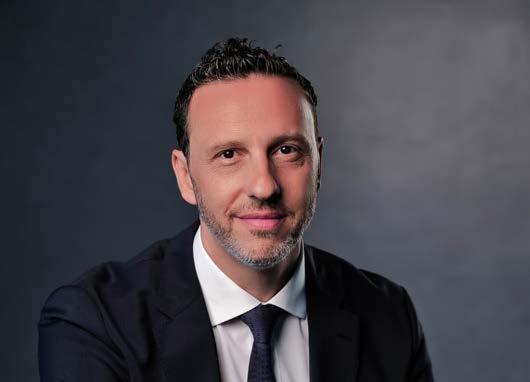
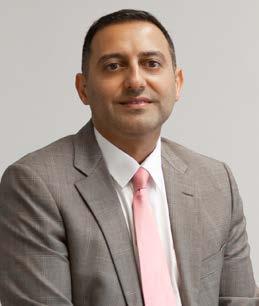
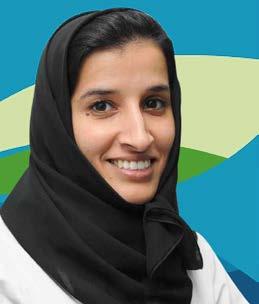 Hady El Khoury, Regional President, Middle East, North East Africa, Turkey & Central Asia (MENEAT) for GE HealthCare
58 Sam Amory Managing Director for Dedalus MEA
50
Dr. Alya Al Mazrouei CEO of Clemenceau Medical Center Hospital
Hady El Khoury, Regional President, Middle East, North East Africa, Turkey & Central Asia (MENEAT) for GE HealthCare
58 Sam Amory Managing Director for Dedalus MEA
50
Dr. Alya Al Mazrouei CEO of Clemenceau Medical Center Hospital
Time savings have helped in boosting patient capacity for Echo studies by 40%1
“By introducing Centricity™ Cardio Enterprise 2 from GE HealthCare we have reduced interruptions as images are now accessible in the office and the total time of an Echo study has been cut from 1 hour to 25 minutes – this saves 35 minutes per examination.”

- Dr. Munawar Al-Majnoni, Head of Cardiology at My Clinic, President of the Saudi Society of Echocardiography
1 Data provided by the My Clinic Cardiology department as of May 2023
2 Centricity Cardio Enterprise is a solution comprised of Centricity Cardio Workflow and Centricity Universal Viewer
66
Cedars-Sinai is a global destination for world-class care amid top U.S. rankings
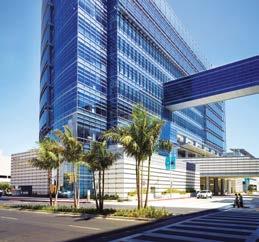
64 Dubai to host 'World Summit for Clinical Chemistry and Laboratory Medicine 2024'
70 Institute for Population Health, Weill Cornell MedicineQatar: Building research capacity and advancing evidencebased practice
86 Lateral tilt makes a difference Jitka Stranska about the most distinguished feature of the LINET brand
16 Hady El Khoury, Regional President, Middle East, North East Africa, Turkey & Central Asia (MENEAT) for GE HealthCare
46 Dr. Reshma Bholah, Assistant Professor of Pediatrics at Weill Cornell Medicine-Qatar (WCM-Q) and Consultant Pediatric Nephrologist at Sidra Medicine
58 Sam Amory, Managing Director for Dedalus MEA
62 Jad Srouji, Regional Director MEA of Belimed AG
88 Ms. Alice Yammine Boueiz, CEO of the Arab Hospitals
Federation

98 Wissam Daoud: A Visionary Leader Catalyzing
Transformation in the Diagnostic Space
108 Deborah Mukherji, Consultant Medical Oncologist at Clemenceau Medical Center, Dubai
110 Sayde Maalim Nassar, Executive Director of “Oasis de Vie” Hospital
114 Mrs. Serpil Sarıaydın, Director of ACIBADEM
ATASEHIR HOSPITAL, ACIBADEM's 10th hospital in Istanbul and 24th worldwide
86
LINET MEA... Jitka Stranska about the most distinguished feature of the LINET brand
34 The King Hussein Cancer Center, International Standards With an Arab Identity
50 Clemenceau Medical Centre Hospital: A Beacon of Excellence in Dubai
66 Cedars-Sinai is a global destination for world-class care amid top U.S. rankings
100 Technology that brings Liv hospital to the patient with a click: ‘Healthverse PanoramicWEB’
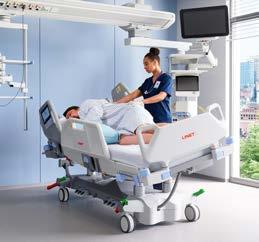
106 UChicago Medicine adds music therapy option for Alzheimer’s and dementia patients
118 Al-Ahli Heart Center is accredited by Weill Cornell Medicine-Qatar to train students
120 Acibadem International: Algerian Conjoined Twins Safaa and Chifaa, got their own bodies in TURKIYE
22 Unmet needs and the science of cell therapy
By Tamer Akl; Regional Medical Director at Gilead and Kite Oncology
72 BCMA IV-Medication Administration: A Safety and Efficiency Review
126 How does integrated governance lead to successful health systems? By Rola Hammoud; MD, MHA, FACHE/ President, ACHE-MENA
54 Saudi Healthcare Sector

78 Breast Cancer
92 The Impact of the Hotel Industry on Medical Tourism
102 Green Hospitals
128 Interventional Radiology
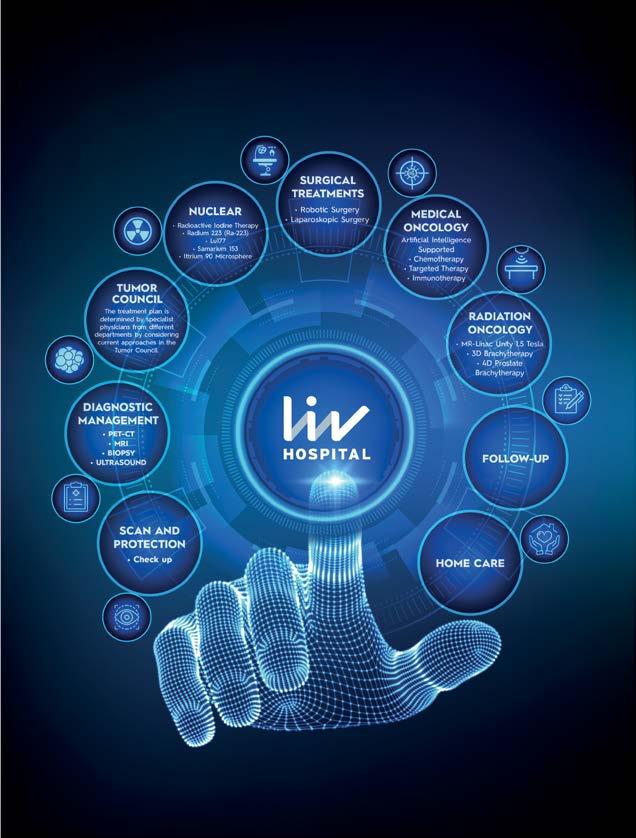

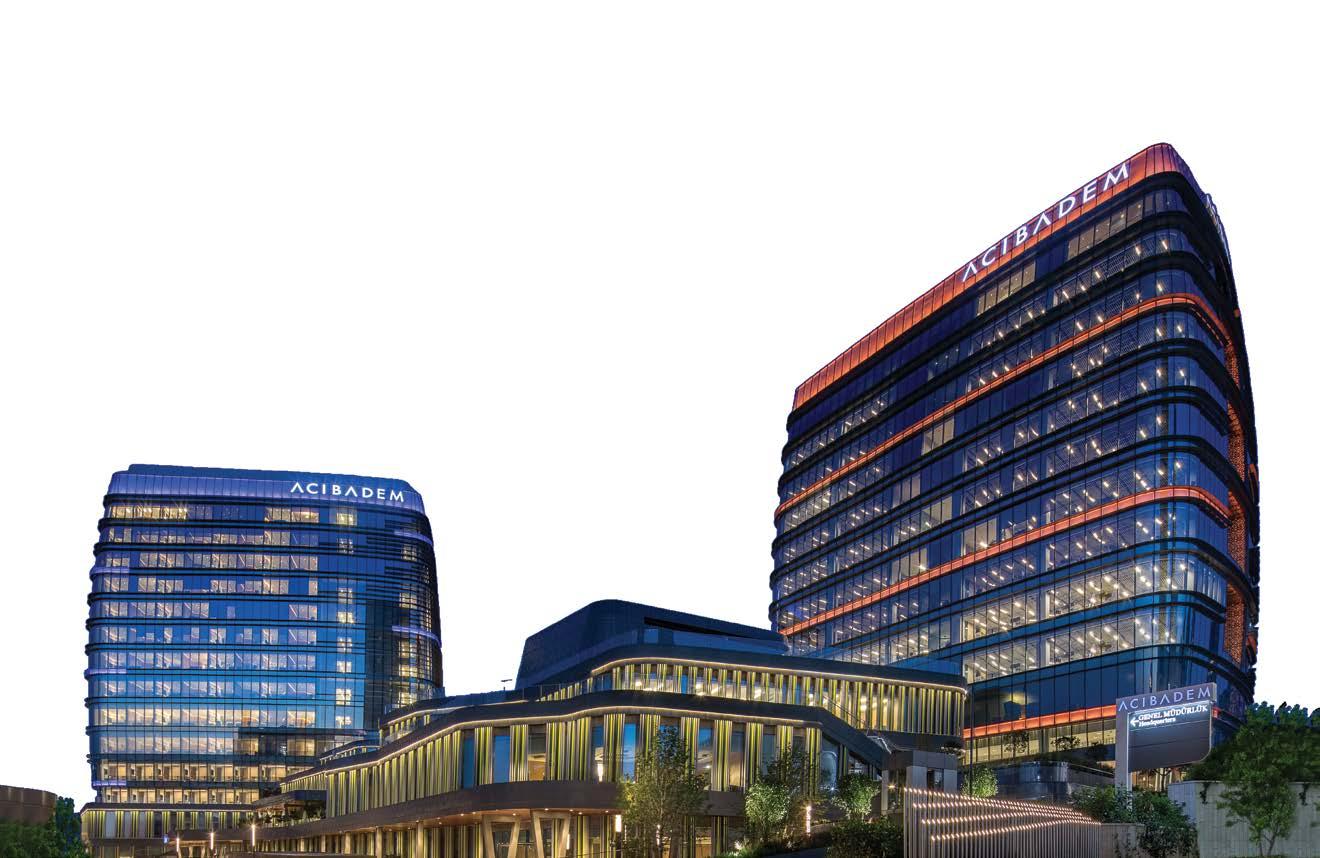



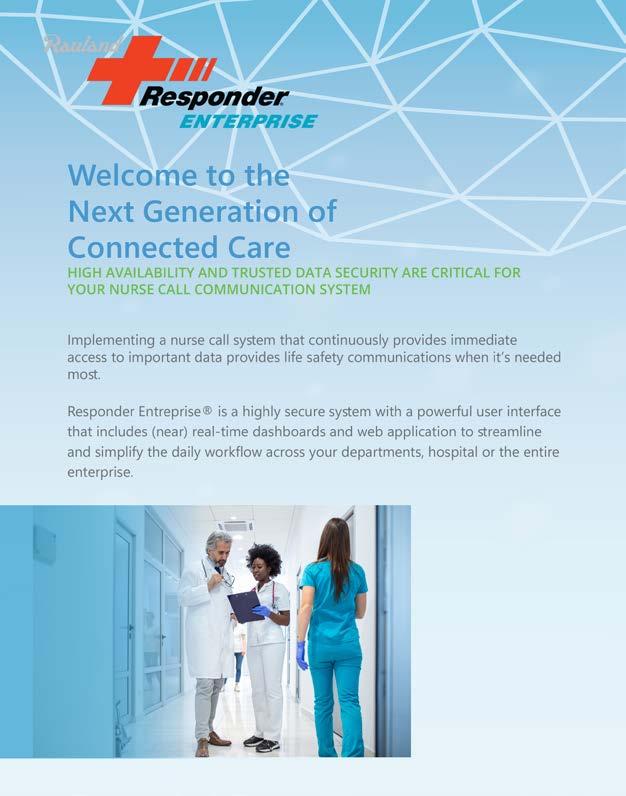
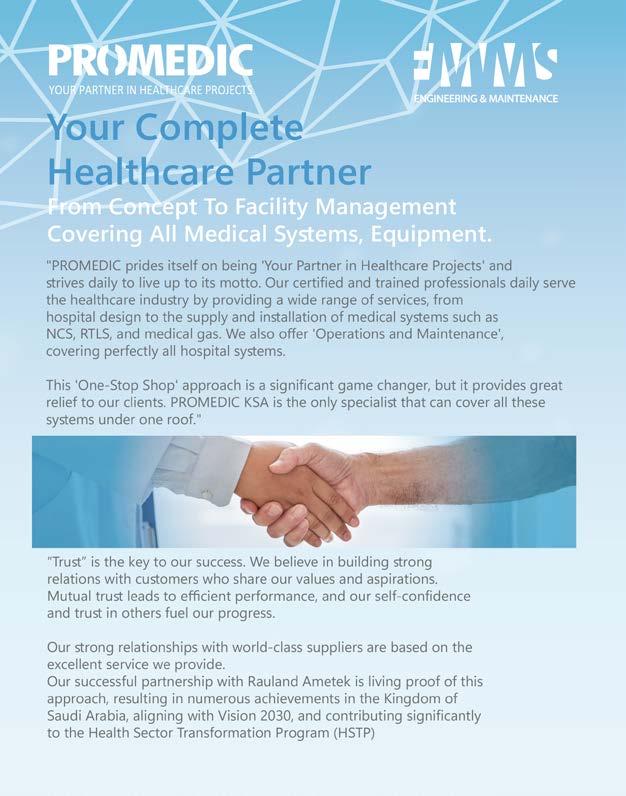

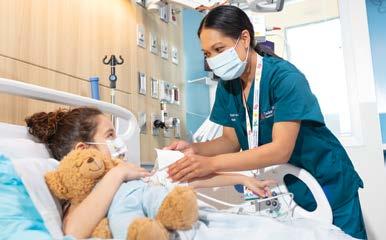


















Cedars-Sinai is proud to be recognized eight years in a row on the “Best Hospitals” Honor Roll and ranked among the top fi ve in the U.S. in six specialties by U.S. News & World Report . As a global leader in healthcare, we offer a full range of services to patients from around the world. Whether we’re providing clinical services in your region, via video visits or at our main campus in Los Angeles, our mission remains unchanged: to give patients access to excellence in healthcare— wherever they may be.
11 specialties ranked among the best in the U.S.
• Cancer
• Cardiology, Heart & Vascular Surgery






• Diabetes & Endocrinology
• Ear, Nose & Throat
• Gastroenterology & GI Surgery

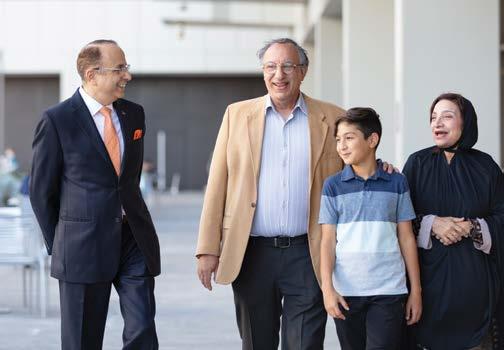
• Geriatrics
• Neurology & Neurosurgery
• Obstetrics & Gynecology
• Orthopedics
• Pulmonology & Lung Surgery
• Urology
Learn more: cedars-sinai.org/international | cedars-sinai.org/globalcollaborations
The Orthopedic Department of Al-Ahli Hospital is the biggest Orthopedic Department in the private sector in Qatar.
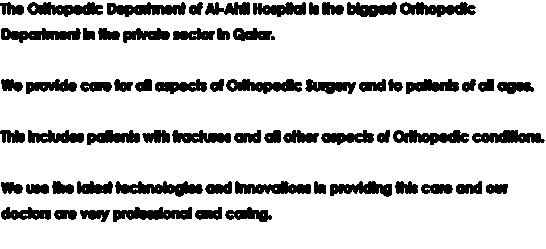
We provide care for all aspects of Orthopedic Surgery and to patients of all ages.
This includes patients with fractures and all other aspects of Orthopedic conditions.


We use the latest technologies and innovations in providing this care and our doctors are very professional and caring.

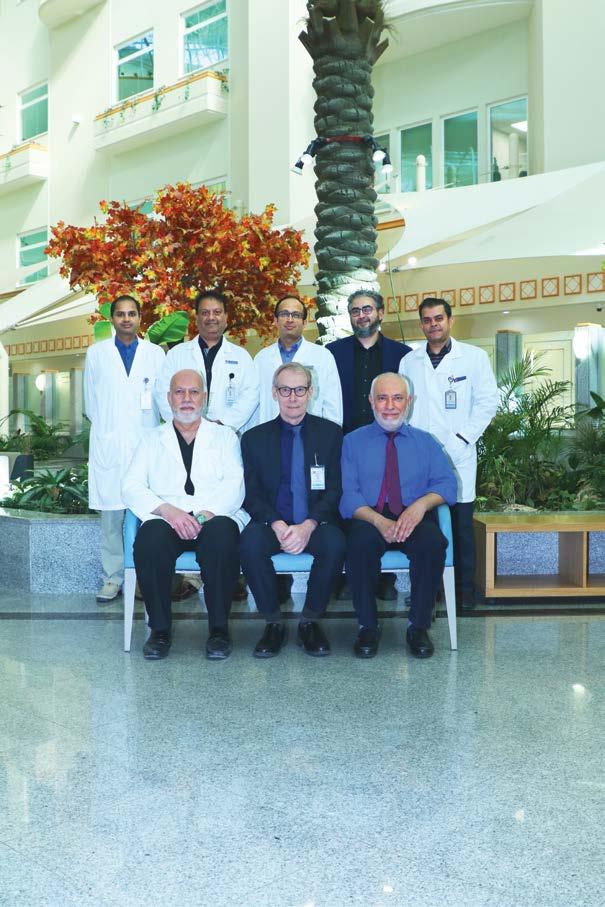


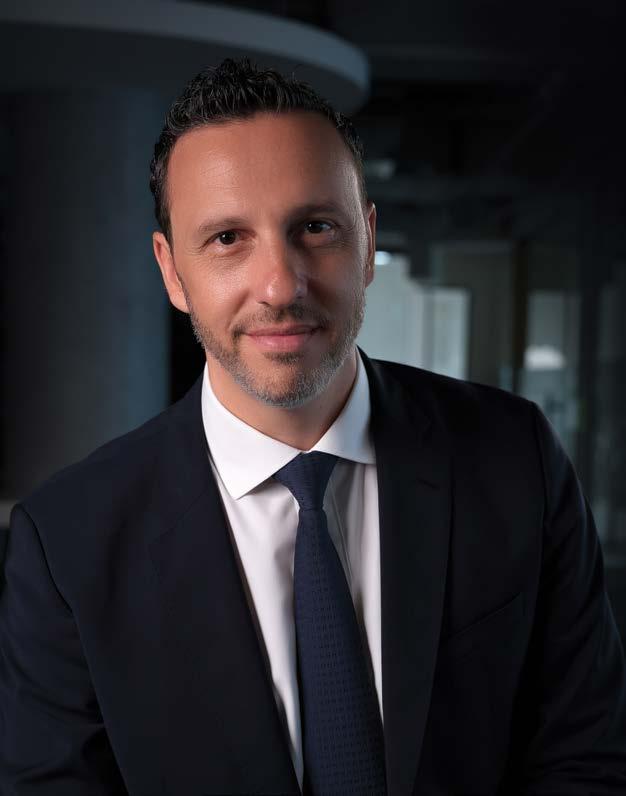
Hospitals Magazine had the opportunity to sit with Mr. El Khoury to discuss the role of GE HealthCare in Saudi Arabia's healthcare transformation. Read the full interview below:
How does GE HealthCare’s patient-first approach align with the Kingdom's digital transformation strategy in healthcare?
Our patient-first approach fully aligns with Saudi Arabia’s focus on expanded access, improved care, greater efficiency in care delivery, and a greater focus on prevention and wellness. At GE HealthCare, we are focused on employing a holistic approach to care, addressing key challenges across every stage of the patient’s journey, by deploying our technologies and partnering with leading global institutions in the therapeutics landscape. Our collaboration with the public and private sectors in Saudi Arabia aims to re-design the model of care to improve individual access to best-in-class care.
In Oncology, we target increased ease of screening and rapid diagnosis, where 75% of patients in our One Stop Breast© clinics receive results in the same day, reducing the financial, clinical, and emotional burden on patients and providers alike. Our AI-powered digital solutions, like OncoCare©, transform the medical oncologist’s experience in rapid decision making, by extracting all relevant patient data from different sources and visualizing it on one screen.
Advanced Digital Health Solutions seem to be a significant focus for GE HealthCare. Can you elaborate on the company's initiatives in this area, especially in collaboration with the Saudi Ministry of Health?
Health technology is crucial for the success of the Kingdom’s ambition to reduce dependency on hospital care and move toward preventive health services. Saudi Arabia aims to digitalize 70 percent of patient activities by 2030 and has allocated USD 1.5 billion for healthcare IT and digital transformation programs. In line with these goals, GE HealthCare is providing advanced digital transformation solutions.
Our Command Center, operational in the Kingdom, is a prime example. It enables unprecedented orchestration of patient care in real-time through actionable information, digitizing the patient journey.
With an increasing focus on personalized medicine, how is GE HealthCare contributing to this field in Saudi Arabia? Advances in genomics and precision medicine are ushering in new opportunities for personalized healthcare globally. In the Kingdom, Saudi Vision 2030 has prioritized
ADVANCES IN GENOMICS AND PRECISION MEDICINE ARE USHERING IN NEW OPPORTUNITIES FOR PERSONALIZED HEALTHCARE GLOBALLY. IN THE KINGDOM, SAUDI VISION 2030 HAS PRIORITIZED PERSONALIZED AND PRECISION MEDICINE. GE HEALTHCARE IS SUPPORTING CLINICIANS IN SAUDI ARABIA WHO ARE INCREASINGLY MOVING AWAY FROM A TRADITIONAL “ONE SIZE FITS ALL” PERSPECTIVE TOWARDS INDIVIDUALIZED HEALTHCARE DECISIONS FOR THEIR PATIENTS.
“Our goal is to address healthcare-specific challenges and nurture the next generation of healthcare leaders in the Middle East.”
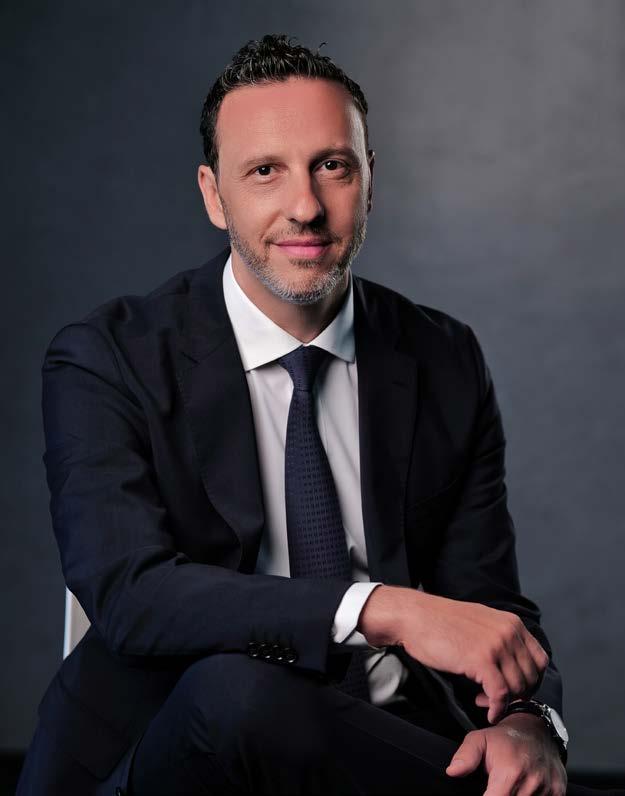
personalized and precision medicine. GE HealthCare is supporting clinicians in Saudi Arabia who are increasingly moving away from a traditional “one size fits all” perspective towards individualized healthcare decisions for their patients. By incorporating AI technologies and advancing imaging equipment, we are helping to connect patient data throughout a provider’s digital ecosystem so that doctors can access it how and when they want and tailor diagnoses and treatments to the individual. Looking ahead, the use of positron emission tomography (PET), alongside new imaging tracers, targeted therapeutic pairings and sophisticated detection technology, is opening the possibility for advanced diagnoses and targeted treatments, important steps in delivering greater precision diagnostics and therapeutics. With the region’s personalized medicine market expected to reach USD 2.51 billion this year, our advanced imaging solutions will help empower clinicians to provide more precise therapies and personalized care.
How does GE HealthCare’s highly localized service and support infrastructure contribute to the Kingdom’s healthcare goals?
By developing a large and robust service and support infrastructure in country, we provide our customers with the confidence that their equipment will be available when they and their patients need them. To achieve this, our dedicated service engineering team can tap local warehouses that stock 50% of all spare parts required. Through our advanced remote capabilities such as predictive monitoring, we are improving and upgrading system performance, and connecting to online monitoring for fast troubleshooting or repairs with a 30% remote fix rate. Ultimately, this helps our customers to become more operationally efficient while enhancing quality and reducing service-related costs. Further reinforcing this extensive localized infrastructure, GE HealthCare this year announced the launch of “Service Shop in Saudi Arabia,” an
e-commerce portal to simplify the purchasing of spare parts for our systems. Registered portal users have 24x7 access to request spare parts and on-demand access to GE HealthCare repair services. The Service Shop is another example of how we are supporting the Kingdom’s digital transformation priorities in healthcare.
How does GE HealthCare leverage its substantial local presence to proactively respond to the specific challenges faced by healthcare providers in Saudi Arabia?
With more than 25,000 GE HealthCare assets deployed in hospitals, clinics and other facilities across Saudi Arabia, and with a team of nearly 250 people in the Kingdom, we are well positioned to serve customers and support the ongoing advancement of the healthcare sector. GE HealthCare's strong local presence is a testament to its commitment to serving its customers and meeting their ever-evolving needs. By being close at hand, the company can better understand the unique challenges faced by healthcare providers and offer tailored solutions.
GE HealthCare's imaging devices and diagnostic technologies have supported enhanced healthcare outcomes in the Kingdom. Can you discuss any recent collaborations in this domain?
A recent collaboration that stands out is our agreement with My Clinic, one of the largest outpatient providers in the Kingdom. We're equipping their upcoming facility in Riyadh with a suite of advanced precision diagnostic and imaging solutions. This collaboration ensures that My Clinic will have access to our latest solutions, from MRI scanner imaging to Bone Densitometers that provide precise data on soft tissue and bone composition. This is
GE HEALTHCARE'S STRONG LOCAL PRESENCE IS A TESTAMENT TO ITS COMMITMENT TO SERVING ITS CUSTOMERS AND MEETING THEIR EVER-EVOLVING NEEDS. BY BEING CLOSE AT HAND, THE COMPANY CAN BETTER UNDERSTAND THE UNIQUE CHALLENGES FACED BY HEALTHCARE PROVIDERS AND OFFER TAILORED SOLUTIONS
just the latest in a decades-long commitment to delivering intelligent imaging devices and diagnostic technologies that support improved clinical decisions, better patient outcomes, and enhance workflow efficiency.
How is GE HealthCare supporting the healthcare priorities of Saudi Vision 2030?
Under Saudi Vision 2030, a new model of value-based care is emerging that emphasizes personalized healthcare solutions and the empowerment of clinicians and patients. In 2022, the Saudi Ministry of Health launched the Health Sector Transformation Program as part of Vision 2030. This program aims to restructure the healthcare sector, making it more comprehensive, effective, and integrated, with a sharp focus on patient health. At GE HealthCare, we are delivering efficient and reliable technologies that help the Ministry of Health and private sector providers address on these priorities. We are also working with the Ministry to develop disease care pathways to support these goals. These can include building earlyintervention systems in primary care settings, creating one-stop centers for rapid diagnosis and treatment planning for specific diseases, and providing imaging equipment and training to help clinicians at all stages of the pathway.
Saudi Arabia has demonstrated its commitment to healthcare with the significant allocation of nearly SR190 billion to healthcare and social development in 2023. What implications does this have for the sector and for stakeholders such as GE HealthCare?
This allocation of SR190 billion (USD 50.4 billion) in 2023 is a testament to the government’s continued commitment to creating an efficient, integrated, and patientcentered ecosystem. This commitment is on par with the best healthcare systems globally. As Saudi Arabia lays the groundwork for a healthier and more sustainable future, providing access to
healthcare at lower costs is becoming a reality for its people. GE HealthCare is honored to play an essential role in this transformation, offering our expertise and innovative solutions to address challenges and improve access to quality care.
Public-private partnerships (PPPs) seem to be a significant aspect of Saudi Arabia's healthcare transformation. How is GE HealthCare leveraging its position in these partnerships?
By putting in place the necessary legislations and regulations regarding PPPs – and doing so in consultation with local and international stakeholders who bring years of experience in implementing healthcare PPPs in other markets – the Kingdom is helping create the conditions to achieve its healthcare transformation goals.
GE HealthCare brings global experience in implementing PPPs, as well as many of the elements crucial to success, including healthcare technologies, financing solutions and partners, consortium partner development, and project management. We have a regional and global track record of delivering complex projects on time and within budget. We have found that PPPs help governments looking to expand and improve care and build new facilities without the large upfront capital investment that this traditionally requires. As well, PPP models leverage private sector expertise to make it possible to treat more patients quickly, at a lower cost, and with improved health outcomes.
How do GE HealthCare innovations in digital technologies address the unique healthcare challenges of the Middle East, Northeast Africa and Turkey (MENEAT) region?
This region is focused on delivering enhanced levels of care to more citizens, while reducing wait times and reducing perpatient costs, especially in the face of growing populations and rising levels of lifestyle diseases. By delivering a range of technologies
AT GE HEALTHCARE, WE ARE DELIVERING EFFICIENT AND RELIABLE TECHNOLOGIES THAT HELP THE MINISTRY OF HEALTH AND PRIVATE SECTOR PROVIDERS ADDRESS ON THESE PRIORITIES. WE ARE ALSO WORKING WITH THE MINISTRY TO DEVELOP DISEASE CARE PATHWAYS TO SUPPORT THESE GOALS. THESE CAN INCLUDE BUILDING EARLYINTERVENTION SYSTEMS IN PRIMARY CARE SETTINGS, CREATING ONESTOP CENTERS FOR RAPID DIAGNOSIS AND TREATMENT PLANNING FOR SPECIFIC DISEASES, AND PROVIDING IMAGING EQUIPMENT AND TRAINING TO HELP CLINICIANS AT ALL STAGES OF THE PATHWAY.
– from the most advanced PET scanners to handheld ultrasound devices – and combining these with information management software and data solutions, GE HealthCare, is helping countries improve healthcare standards, clinical diagnosis, and patient outcomes. In key markets like Saudi Arabia, we're expanding our range of artificial intelligence (AI) and machine learning systems to revamp hospital practices and accelerate diagnostics and treatment. Our AI tools in MRI, for instance, are helping radiation oncologists in therapy planning with a new ability to build synthetic CT images from MRI, which is supporting the emerging trend of MRIonly radiation therapy.
Nearly one year since it transitioned to a stand-alone company and with its regional management team focused on the Saudi market, what are GE HealthCare’s long-term growth plans and strategies for the Kingdom?

We have never been better positioned to support overall healthcare delivery in the Kingdom, especially in a market where USD 13.8 billion is forecast to be spent on new healthcare facilities by the end of the decade.
For GE HealthCare, this has required an evaluation of the way we do business in Saudi Arabia that ensures we bring the best of our scale and operations to serve as a strategic partner to the Ministry of Health (MoH).
We also are implementing next-generation hospital and digital solutions to support the delivery of Saudi Vision 2030. One change is that GE HealthCare will be leading the imaging portfolio directly in Saudi Arabia. This new approach will bring GE Healthcare even closer to our customers and reaffirms the company’s long-term commitment to supporting the development of the Kingdom’s healthcare sector in line with both Vision 2030 and the National Transformation Program. We've already made significant steps towards improving accessibility and healthcare efficiencies throughout the
country. With the new shifts that the company is taking in Saudi Arabia, and as part of our continued commitment to the Kingdom as a priority market of strategic importance, we are pleased to announce several additions to our Saudi leadership team. This includes Mohammad El-Khoury, who has joined us as the Executive General Manager for GE HealthCare in the Kingdom, and Hisham Al Bahkali, who has been appointed Non-Executive Chairman of the Board of GE HealthCare in Saudi Arabia. Members of Mohammad’s team include Rayed Alghamdi, Vice President, Commercial and Healthcare Solutions, and Abdullah Alshamrani, Vice President, Government Affairs.
References:
1. Saudi Arabia Releases 2023 Budget Plan - USSBC (ussaudi. org)
2. 207.the_demographic_profile_ of_saudi_arabia.pdf (arabdevelopmentportal.com)
3. Saudi Vision 2030: Kingdom prepares itself to become the next healthcare giant - Global Business Outlook
4. GCC: share of healthcare expenditures by country 2027 | Statista
5. Alpen Capital | Investment Banking Advisory
Care that can unlock potential.
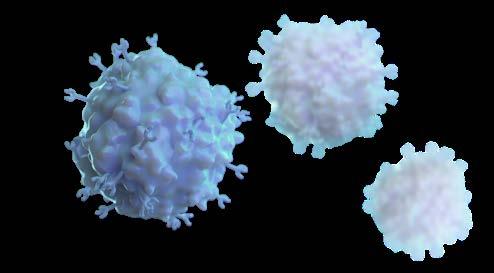 By Tamer Akl
By Tamer Akl
Lymphoma is the most common blood cancer1. It affects the lymphatic system, developing in lymphocytes (the white blood cells that help to fight infection).
Lymphoma is categorised into two groups: Non-Hodgkin's lymphoma, which comprises approximately 90% of all lymphomas, and Hodgkin's lymphoma2 .
Non-Hodgkin’s lymphoma (NHL) is the most prevalent haematological malignancy in the world, with an estimated 544,000 new cases identified in 2020. Unfortunately, the numbers are growing each year3
There are about 60 different types of NHL, with most forms developing from B cells4. Diffuse Large B-cell lymphoma (DLBCL) is the most common aggressive non-Hodgkin lymphoma subtype and because of its rapidly progressive nature, there exists an unmet need for its treatment, including in the Middle East5.
Frontline treatment of LBCL currently lies with R-CHOP, however, around 30-40% of patients with LBCL will relapse or become refractory to R-CHOP and of these, only half will progress to definitive therapy with high-dose chemotherapy and stem cell transplantation6 And for those that do undergo transplantation, 80% do not achieve long-term remission. The human dimension of these stark statistics is distress and anguish for LBCL patients and their families. One treatment that is coming to
the fore in the fight against DLBCL is Chimeric antigen receptor (CAR) T-cell technology. This therapy harnesses the body’s immune system to fight cancer. The chimeric antigen receptors are engineered proteins that are added to a patient's cell, enabling it to recognise cancer cells. Cell therapy is a complex, specialized procedure with several stages. First, the suitability of the patient to receive the therapy must be assessed, with the physician determining factors that include underlying health conditions and co-morbidities. After suitability has been confirmed, the patient’s white blood cells are extracted, and the T cells separated. Once isolated, the T cells are genetically engineered to gain the chimeric antigen receptor, which helps them recognise and target cancer cells. These modified T cells are then infused to the patient. The patient requires close observation during the reintroduction of the cells to observe for potential side effects. As with all forms of treatments, Cell therapy is not without its risks. However, recent advances in the field have reduced the risk of complications7.
Boundaries are continuing to be pushed with Cell therapy. Currently, the procedure is autologous, meaning that it involves one patient receiving their own cells back, making this a highly individualized treatment.
Treatments such as cell therapy are offering the possibility of unlocking new ways to treat cancer.
References:
1. Lymphoma Research Foundation. What is lymphoma? Available at: https://lymphoma. org/aboutlymphoma/. Accessed: February 2021.
2. Lymphoma Research Foundation. What is lymphoma? Available at: https://lymphoma. org/aboutlymphoma/. Accessed: February 2021; Batra R, Kaur H, Jindal S. Extranodal large B-cell type agressive non-Hodgkin’s lymphoma. Indian Journal of Dentistry. 2014; 5(4):225-228.
3. Global patterns of Non-Hodgkin Lymphoma in 2020. Int J Cancer. 2022 Nov Leukemia & Lymphoma Society. NHL subtypes. Available at: https://www.lls.org/lymphoma/ non-hodgkin-lymphoma/diagnosis/nhl-subtypes. Accessed: February 2021.
5. Al-HamadaniM, HabermannTM, CerhanJR, et al. Am J Hematol. 2015;90(9):790-795.
6. Relapsed or Refractory Diffuse Large B-Cell Lymphoma: “Dazed and Confused” (cancernetwork. com)
7. https://www.cancer.gov/ news-events/cancer-currents-blog/2020/car-t-cell-therapy-lymphoma-reduced-side-effects#:~:text=While%20the%20 therapy%20can%20lead,can%20 be%20severe%20or%20fatal.
Featuring frame-based lateral tilt, LINET-leading ICU solutions help patients recover faster and reduce physical and mental strain on medical personnel. The high-end intensive care beds feature frame-based lateral tilt, a solution developed to help patients recover faster and reduce physical strain on medical personnel. Together with Smart Care solutions, they contribute to more efficient medical care and reduction of administrative tasks.
Multicare®: No Hospital Acquired Pressure Injuries.*
0% increase in Hospital Acquired Pressure injuries.*

100% of the staff believed that the Multicare® beds improved their workplace.*
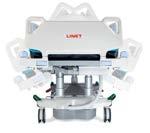

Saqr Hospital in Ras Al Khaimah – an affiliate of Emirates Health Services (EHS) – has launched the first phase of the early breast cancer screening campaign this month under the slogan "Initiate Action, Receive Hope." The campaign aims to conduct free screening for women over 40 in collaboration with the Friends of Cancer Patients (FOCP) initiative, which provides mobile clinics equipped with mammograms and ultrasound machines.
Saqr Hospital aims to provide services in various locations in Ras Al Khaimah and achieve sustainability, proactiveness, and continuity by inviting women from the target age group to run a test to identify key indicators and symptoms that require clinical examinations. The campaign includes clinical examinations, mammograms, and ultrasound examinations, if needed, as well as medical consultations.
H.E. Dr. Issam Al Zarooni, Acting Executive Director of Medical Services at EHS, stressed that the campaign is in line with EHS's direction and mission and is inspired by the UAE leadership's vision to enhance the quality of healthcare, achieving the national indicators of "We the UAE 2031" vision and providing all members of the UAE community with preventive and advanced healthcare services. H.E. Dr. Al Zarooni also highlighted that the campaign was part of EHS's all-inclusive approach to upgrading the services provided by the various facilities under its umbrella. This initiative reflects EHS' commitment to women's health and raising awareness of the importance of early detection of this serious disease, as breast cancer is the most common cancer among women. H.E. Dr. Al Zarooni also noted that the progress in medicine, diagnosis, and treatment manifested by EHS's ability to achieve a high success rate in breast cancer treatment, when detected early, reflects the importance of periodic and regular screening.
Dr. Muna Al Ayyan, Consultant Breast Surgeon, Director of Saqr Hospital, said: "The campaign aims to raise awareness about early

testing within UAE communities and highlight its importance in preventing breast cancer, the most common cancer amongst women globally. It also strives to acquaint women with self-examination methods and approaches while emphasizing their critical role in prevention. This demonstrates Emirates Health Services' commitment to meeting its ethical and professional responsibilities to various parts of UAE society, with a special emphasis on women, who are more vulnerable to breast cancer".
Dr. Muna Al Ayyan added: "The campaign highlights the hospital's knowledge and awareness mission, led by the Foundation and the importance of promoting health awareness. A single piece of information or an early inspection may save people from various diseases, protect society's health, and keep its members functional and productive. Both the hospital and the institution embody this message, as health awareness protects nations' resources from depletion by channeling them toward advancement, construction, and development. We hope every individual, organization, and family will embrace our message".
The field campaigns were distributed around the Emirate of Ras Al Khaimah in partnership with Emirates Foundation health facilities and selected governmental, local, and private businesses. These collaborations established a central location for hosting the mobile clinic, allowing it to serve nearby communities. It began at Shaa'm Hospital, followed by Almeirad Health Center and Gulf Pharmaceutical Industries (Julphar). For the second time, the initiative provided services to the inmates of the Ras Al Khaimah Correctional facilities. The facility's leadership commended the institution's commitment and ongoing endeavors to engage with all sectors of society. This campaign is an extension of a series of health initiatives run by Emirates Health Services to achieve long-term health goals by improving early disease prevention tools and concepts and establishing them as a mainstream culture among all UAE residents.
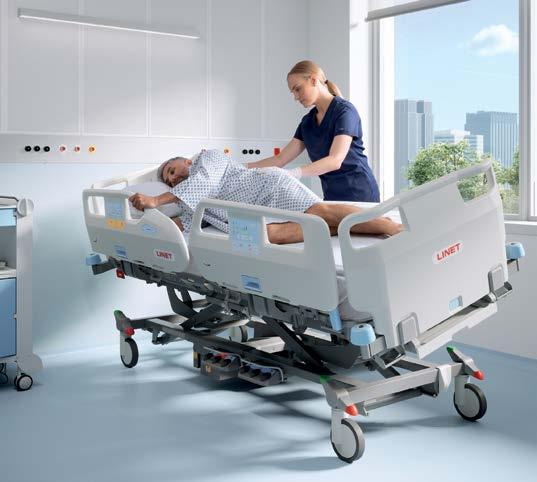
Lateral tilt reduces physical strains on the caregiver by 67%
Shorten the length of stay by 1.5 days with the mobilization program.
Bespoken design is an additional bonus.
Low height up to 28 cm helps to reduce patients’ falls.
Smart care solutions help caregivers to be more efficient
Cleveland Clinic London is the first hospital in the UK capital to successfully perform a total knee replacement procedure with the assistance of an augmented reality-based surgical platform that was designed with artificial intelligence and machine learning.
The London hospital is the latest in the global health system to embrace the technology. As a leader in medical innovation, Cleveland Clinic has used augmented reality technology in joint replacement procedures at its main campus in Cleveland in the US, especially with shoulder arthroplasty surgery.
Mr Panagiotis Gikas, consultant orthopedic hip and knee surgeon, led the surgical team at Cleveland Clinic London during the procedure last month. Following the procedure to treat knee pain caused by osteoarthritis, the patient is doing well. Total knee replacement is the most common type of knee replacement. Arthritis is the most common condition that causes debilitating musculoskeletal pain. Total knee replacement is a successful treatment for advanced knee arthritis that treats the pain and restores function. In recent years, augmented reality (AR) has become increasingly beneficial in orthopedic surgery, with significant advantages that equip the operating team with the tools to provide a more personalized approach to patient care.
“Augmented reality gives a visualization of the joint that is more dynamic as it is three-dimensional (3D),” said Dr Panagiotis Gikas. “The advanced technology helps with planning the procedure and allows for the best positioning of the implant for each patient during the procedure. The end-result is tailored to the unique anatomy and specific needs of each patient.”
Prior to the procedure, Dr Gikas used advanced imaging software to visualize the patient’s knee joint in 3D and determine the ideal implant positioning for this patient, based on their specific anatomy. The virtual 3D model of the patient’s knee helps the surgical team
GLOBAL HEALTH SYSTEM’S FIRST IN-HUMAN TRIAL PHASE ONE RESULTS PUBLISHED IN NATURE MEDICINE.
evaluate damaged bone and cartilage so they can plan for the surgery and the optimal placement for the implant. During the procedure, the physician wears a pair of augmented reality glasses to view the patient’s specific knee anatomy in 3D. Two small sensors are attached to the patient’s leg to provide real-time soft tissue feedback, such as the tension of the ligaments. The AR-based platform enables the surgical team to easily adjust, better visualize and determine the proper placement of the implant given the patient’s specific anatomy, which is key to a successful knee replacement procedure.
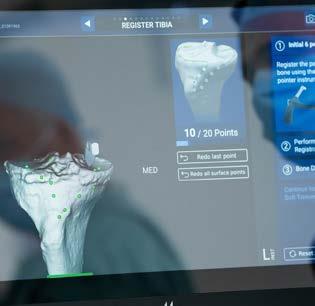
Augmented reality is being adapted by Cleveland Clinic research scientists and physicians for use in a wide array of clinical applications, including aortic aneurysm treatment.
Every year, thousands of patients from every continent travel to Cleveland Clinic locations for world-class cardiology, neurology, cancer and other specialty care.
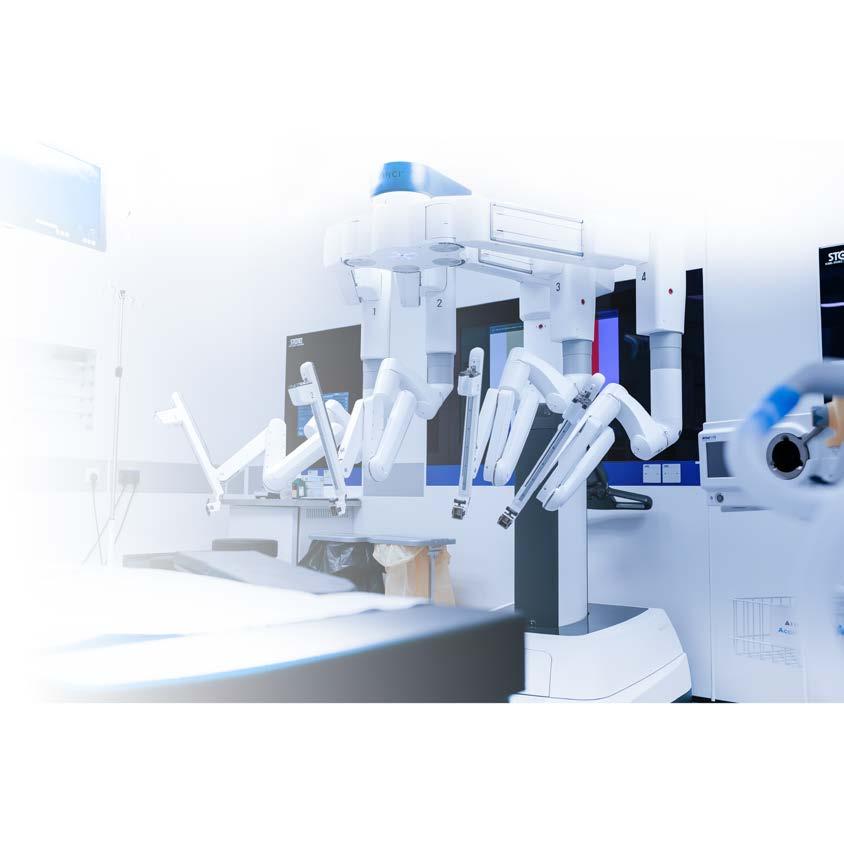

Hasan Jasem Al Nowais, Group Chief Executive Officer and Managing Director of M42, a global tech-enabled healthcare company headquartered in Abu Dhabi, has been appointed Chairman of Cleveland Clinic Abu Dhabi’s new Board of Directors. The hospital served a record number of patients from the UAE and across the world, reporting a 20 percent growth in international patient numbers in H1 2023 over H1 2022.
Hasan Jasem Al NowaisPart of M42’s network of global healthcare providers, Cleveland Clinic Abu Dhabi was established in 2015 as part of the Abu Dhabi government’s vision to build a world-class healthcare ecosystem. The 400-bed hospital is an extension of the world-renowned US-based Cleveland Clinic’s model of care. It addresses a range of complex and critical care requirements. Earlier this year, Cleveland Clinic Abu Dhabi opened the Fatima bint Mubarak Center, a state-of-the-art facility providing cutting-edge, personalized care for cancer patients.
The newly appointed Cleveland Clinic Abu Dhabi Chairman, Hasan Jasem Al Nowais, said: “In under ten years, Cleveland Clinic Abu Dhabi has built an impressive reputation as the leading complex care facility in the region. This is testament to our partners at Cleveland Clinic and our world-class caregivers. Across the M42 network, we are bringing to life the government’s vision to provide world-class healthcare in Abu Dhabi.”
Cleveland Clinic Abu Dhabi has been instrumental in driving key initiatives related to education and research to upskill current and future talent and position the UAE as a knowledge hub.
Al Nowais continued: “M42, together with Cleveland Clinic, will continue to take the world-class facility in Abu Dhabi from strength to strength, ensuring even greater delivery of complex services to the sickest of the sick. The partnership is two-fold, we will integrate
Cleveland Clinic’s high-quality care model across our network, while also working together to harness the M42’s innovative technologies, such as AI and genomic sequencing to deliver more precise, patient-centric, and preventative care.”
M42, is a first-of-its-kind integrated healthcare company, combining G42 Healthcare’s unique medical and data-centric technologies with Mubadala Health’s world-class provision of care. M42 owns a comprehensive global portfolio of health-tech and healthcare companies with more than 450 facilities in 24 countries. The company recently acquired Diaverum, the world’s third-largest dialysis provider.
Cleveland Clinic Abu Dhabi, a cornerstone of the M42 network, has earned a prestigious reputation for its world-class complex care, making it a preferred choice for patients across the globe.
Dr. Tomislav Mihaljevic, CEO and President and Morton L. Mandel CEO Chair of Cleveland Clinic, said: “Cleveland Clinic Abu Dhabi is now one of the most accomplished hospitals in Cleveland Clinic’s global health system. Our caregivers have set new standards for patient-centric care driven by research, education, and innovation. The recent H1 international patient results and rankings demonstrate Cleveland Clinic’s vision to be the best place to receive care, anywhere.” Dr. Mihaljevic continued: “In varying roles, Hasan has been instrumental in the development of the clinic in Abu Dhabi since its inception. Together with Hasan and the M42 network, we are continuing our mission to provide compassionate, complex care to as many lives as possible. With our 100-year model of care and M42’s cutting-edge technology, Cleveland Clinic Abu Dhabi is well-positioned to continue leading into the future.”
Cleveland Clinic Abu Dhabi ranked as the only hospital in the UAE and GCC on the global list of top 250 hospitals from 28 countries in Newsweek’s 2023 ‘World’s Best Hospitals’ list.
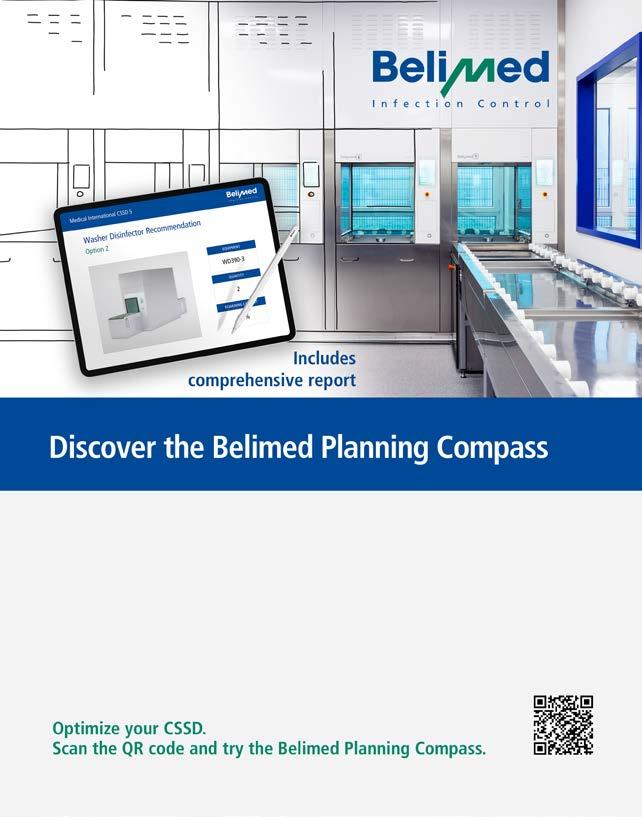




Aproject by Emirates Health Services (EHS) outperformed more than 100 participating projects from around the world and won the "Best Electronic Panel for the Unlimited Business Intelligence System 2023" award at the Global Business Intelligence Symposium organised by Infosol, a leading supplier of control panel software in Arizona, United States of America. The award was for the Women's Health Platform - Healthcare for Pregnant Women as part of the program, "PaCE" for Quality Management and Clinical Excellence.
H.E. Dr. Yousif Mohammed Al Serkal, Director General of Emirates Health Services, said EHS has added another achievement to its more than 19 recognitions for “PaCE Clinical Excellence Program”, which are underlined by the continuous and pioneering efforts of EHS to drive digital transformation. The award also recognizes the consistent efforts of EHS to enhance health services and digital empowerment, which has increased the efficiency of healthcare services across its hospitals and health facilities through smart platforms as part of the PaCE Clinical Excellence Program.
Dr. Noor Al Mheiri, Director of the Mental Health Department, and Chair of the PaCE Committee for Clinical Excellence at EHS, said, "The Women's Health Platform is a clinical tool within the PaCE system for quality management and clinical indicators (PQOP). This includes the wide-ranging system of use of electronic health records supported by its various functions and techniques to achieve further improvements in healthcare. This enhances the outcomes of the services provided to patients, as it provides the results of periodic monitoring of pregnancy and childbirth indicators in our digital health information system (Wareed)".
The program contributes to the provision of a standardized monitoring platform for pregnant women's care as well as maternity and postnatal services in order to improve quality
and efficiency through periodic auditing and benchmarking, it is designed through a comprehensive framework that serves EHS and helps its health facilities assess best practices by using digital tools that evaluate vast quantities of data to improve pregnancy and childbirth services. In addition, the program offers a systematic and comprehensive approach to strengthening pregnant women's care services and improving the quality of their delivery.
The program includes identification of the key areas where improvement is required and any key performance indicators that will be used to measure progress. It also documents data on the performance of pregnancy and childbirth services across all health facilities. This helps to measure progress and develop an action plan by identifying the necessary medical measures to be taken to achieve the goals, including the implementation of any necessary changes to policies or procedures.
The Clinical Excellence program is one of the most important initiatives to achieve local and global recognition. It aims to improve operational performance and efficiency through the continuous development of the 11 major platforms. Each platform contains more than seven detailed interactive panels. Future reports and aspirations are created through artificial intelligence and machine learning, based on many indicators. The indicators include both clinical and non-clinical indicators such as outpatient, inpatient, emergency department, surgical, or clinical, all of which are followed up by specialists. Some 24 indicators have been initiated to be smeasured as part of a development plan to cover over 200 indicators.
EHS OUTPERFORMED MORE THAN 100 PARTICIPATING PROJECTS FROM AROUND THE WORLD.









When it comes to cancer treatment, you deserve a team that is focused on human-based care. Our experts get to know you, then tailor treatments to help fit your needs—which could include radiation, surgery, chemotherapy, immunotherapy, cellular therapy, genetic counseling, or a customized lifestyle management plan.
Learn more about the NCI-designated Dan L Duncan Comprehensive Cancer Center at Baylor College of Medicine at StLukesHealth.org/DLDCCC
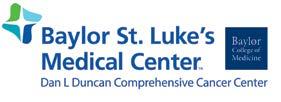
Liquid biopsy in breast cancer – Less invasion more precision
Liquid biopsy in breast cancer – Less invasion more precision

The Plasma-SeqSensei Breast Cancer IVD Kit is an NGSbased liquid biopsy assay that focuses on highly sensitive detection of clinically relevant mutations in TP53, ESR1, PIK3CA, AKT1 and ERBB2 from blood plasma.
Learn more about the unique advantages of Plasma-SeqSensei technology
The Plasma-SeqSensei Breast Cancer IVD Kit is an NGSbased liquid biopsy assay that focuses on highly sensitive detection of clinically relevant mutations in TP53, ESR1, PIK3CA, AKT1 and ERBB2 from blood plasma.
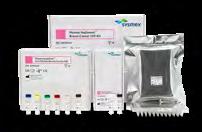
High sensitivity at low MAFs
Learn more about the unique advantages of Plasma-SeqSensei technology
Down to 0.06% - 0.07% Mutant Allele Fractions.
High sensitivity at low MAFs
Down to 0.06% - 0.07% Mutant Allele Fractions.
Absolute quantification
Short and standardised workflow
From cfDNA samples to results in two days.
Short and standardised workflow
From cfDNA samples to results in two days.
Data analysis and reporting made easy Generate report designed for clinicians with just a few clicks.
Absolute quantification
Meaningful comparison of ctDNA levels per millilitre of plasma.
Meaningful comparison of ctDNA levels per millilitre of plasma.
‘We know that tissue samples cannot be taken regularly, but liquid biopsy is easy to take, it is simply a sample of blood. And it gives you real-time information.’
Data analysis and reporting made easy

Generate report designed for clinicians with just a few clicks.
‘Even low levels of ctDNA could have given an indication of the coming progression in the follow-up.’
‘There is much more diagnostic power in the absolute quantification.’
Dr Bhuwnesh Agrawal Member of The Supervisory Board Sysmex Inostics and MD, Germany

‘We know that tissue samples cannot be taken regularly, but liquid biopsy is easy to take, it is simply a sample of blood. And it gives you real-time information.’
‘Even low levels of ctDNA could have given an indication of the coming progression in the follow-up.’



‘There is much more diagnostic power in the absolute quantification.’
 Prof. Christopher Gebhardt UKE Hamburg, Germany
Prof. Geert A. Martens AZ Delta General Hospital, Belgium
Prof. Christopher Gebhardt UKE Hamburg, Germany
Prof. Geert A. Martens AZ Delta General Hospital, Belgium

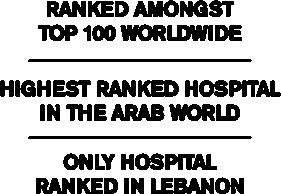
Since its establishment in 2001, the King Hussein Cancer Center (KHCC) has offered comprehensive cancer care to adult and pediatric cancer patients from Jordan and across the Arab world. Our patients are treated by the best oncologists and specialists, and receive care in an Arab atmosphere that is in line with the latest international standards and best practices. The Center is comprised of a 108,700 sqm space with three buildings. It treats nearly 7,000 new patients annually and receives over 250,000 patients in its outpatient building.
KHCC’s facilities are equipped with:
• 365 beds
• 13 operating rooms
• 36 intensive care units
• Single patient rooms to ensure the utmost privacy and comfort
• Floors dedicated to women and pediatric patients
• An outdoor garden
• Entertaining spaces for kids and youth which offer psychosocial support
Uniqueness of KHCC
• Comprehensive cancer treatment (all specialties), and psychosocial support.
• Strategic partnerships with the world’s largest and leading oncology hospitals.
• International accreditations that affirm the Center’s commitment to the highest level of quality and standards.
• Multidisciplinary team making treatment decisions.
Robotic surgery: KHCC is the only facility in Jordan to offer this technology.
Neurosurgery suite: This suite is equipped with an MRI for immediate evaluation, ensuring the highest levels of accuracy in removing tumors.
NanoKnife (irreversible electroporation) technology: KHCC is the first in the region to offer this technology, and it is currently used to treat liver, pancreatic, and prostate cancers.
Bone marrow transplantation (BMT): KHCC has the largest BMT program in the Middle East, serving both pediatric and adult patients. The Program’s success rates are in line with international standards and comparable with world-renowned cancer centers.
Cell Therapy and Applied Genomics Lab: This lab hosts the first and only public umbilical cord stem cell bank in Jordan.
Cutting-edge radiation oncology: Radiation oncology services at KHCC are administered by six linear accelerators fitted with X-ray tracking systems which offer the highest level of precision in targeting solid tumors by delivering real-time images of both the tumor and the patient’s organs.
Advanced diagnostic technology: KHCC’s new diagnostic imaging rooms are equipped with the ‘ambient experience’, a technology designed to create a positive and comforting environment for patients – especially childrenduring MRI and CT scan imaging through its use of soothing audiovisuals.
This office offers special services for patients from outside Jordan to facilitate their treatment process, including:
• Medical consultancy services.
• The assignment of a contact person to provide support during the patient’s treatment journey.
• Various other services including: managing visa applications, flight tickets, providing options for accommodation and transportation, interpretation, and more.
KHCC applies a unified price list for patients from all nationalities.
THE CENTER IS COMPRISED OF A 108,700 SQM SPACE WITH THREE BUILDINGS. IT TREATS NEARLY 7,000 NEW PATIENTS ANNUALLY AND RECEIVES OVER 250,000 PATIENTS IN ITS OUTPATIENT BUILDING
www.khcc.jo
WhatsApp +962 77 7648887
Apply for treatment at KHCC through the Patients Platforms: patient-portal.khcc.jo
Easily follow the steps on the portal site to apply without the need to be present at KHCC.
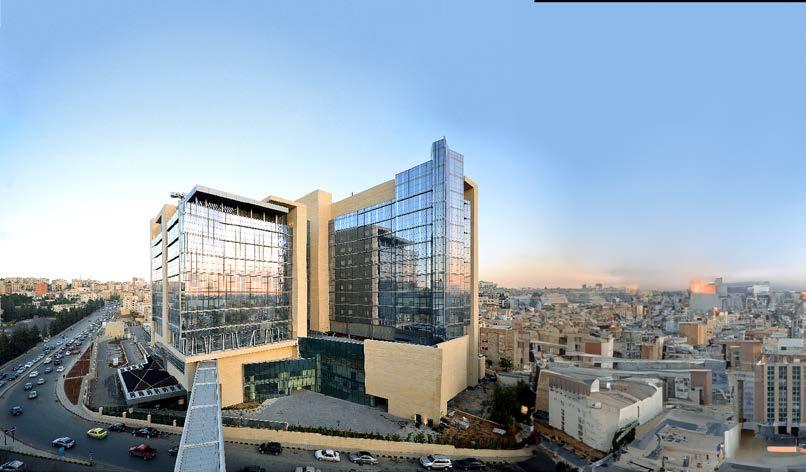
International Standards, Arab Identity
Comprehensive Cancer Treatment (Adult and Pediatric Patients)





Dedicated Office for International Patients Unified Price List for All Patients
Latest Medical Technologies (Robotic Surgery, Neurosurgery Suite)
The Largest Bone Marrow Transplant Program in the Middle East with International Success Rates
New cancer patients can apply for treatment at the King Hussein Cancer Center (KHCC) through the New Patients Platform, which has easy steps to follow and doesn’t require patients to come to KHCC. patient-portal.khcc.jo
Learn with HFMA. Attend our one-day educational training at Global Health Exhibition (GHE), sponsored by Selat and Nawa, or visit our booth at GHE to learn more. HFMA also o ers the Certified Revenue Cycle Representative certification targeted to the GCC region and the Busines of Healthcare certfication.

hfma.org/GHE

 SYED MAIRAJUDDIN SHAH Chief Operating O cer
SYED MAIRAJUDDIN SHAH Chief Operating O cer
 Aga Khan University Hospital
Aga Khan University Hospital
Pakistan
31st October 2023 | Global Health Exhibition

Given the transformation occurring in KSA and Eastern Mediterranean Region, new expectations and new roles are on the horizon. This one-day educational workshop, exclusively sponsored by Selat, a revenue cycle management (RCM) consultant and their training firm Nawa, will take attendees through the key concepts needed to take their healthcare finance and RCM process knowledge to the next level. Attendees will earn a certificate for completing the one-day education session.
Included with your registration at globalhealthsaudi.com. For questions, email GHE@hfma.org.

HFMA’s certifications are widely accepted as the gold standard in illustrating competency in the field of healthcare finance.

Constructed by Dubai Developments, this 126-bed premium hospital in Al Qusais will offer cutting-edge, individualized care in a range of specialties delivered by experienced medical experts
Aster DM Healthcare has recently entered into a groundbreaking agreement with Dubai Developments, a leading developer in the UAE to build the state-of-the-art Medcare Royal Hospital in Al Qusais (Medcare Hospitals & Medical Centres), marking a significant milestone in the UAE's vision of becoming a global healthcare destination. Spanning an impressive area of 334,736 square feet and accommodating 126 beds, our new hospital will be the fourth Medcare Hospital in Dubai and the fifth in the UAE, further enhancing our existing network of 20 Medcare Medical Centres. We extend our gratitude to His Excellency, Eng. Essa Al Maidoor - Director General of Dubai Developments, Mr. Khaled Shaker, and Mr. Saeed Almheiri for partnering with us on this project. The anticipated commencement of operations for this cutting-edge facility is set for December 2023.
Commenting on the new hospital, Dr. Azad Moopen, Founder Chairman and Managing Director of Aster DM Healthcare, said: “We are witnessing a significant increase in demand for
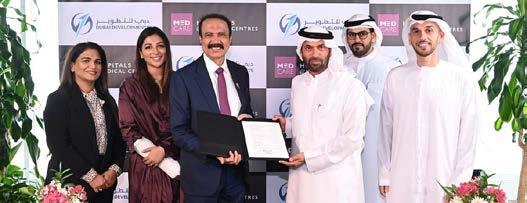
treatment of specialized care among the affluent population in Dubai. The strategic location, offering easy connectivity to the MENA region and Africa for over a billion people is making Dubai an emerging destination for medical tourism. The new Medcare Royal Hospital, situated in close proximity to the Dubai International Airport and premium residential communities, will help meet this growing demand. We plan to introduce various tertiary care facilities in the new hospital, complementing our existing nine hospitals, 101 clinics, and 241 pharmacies under Aster DM Healthcare in the country. We reaffirm our commitment to the UAE’s Vision 2031, aiming to position the country among the top 10 in the world for quality healthcare.”
Alisha Moopen, Deputy Managing Director of Aster DM Healthcare said: “Advanced medical care involves complex procedures and treatment to be delivered by medical experts, to ensure the optimal outcome for patients. With the new Medcare Royal Hospital, we remain deeply committed to bringing best-in-class clinical expertise matched with premium and quality care services a step closer to the comfort of our patients. We aim to offer a full spectrum of care through all our facilities and the new Medcare Hospital in Al Qusais is a part of our efforts to deliver upon our brand promise – ‘We’ll Treat You Well’.”
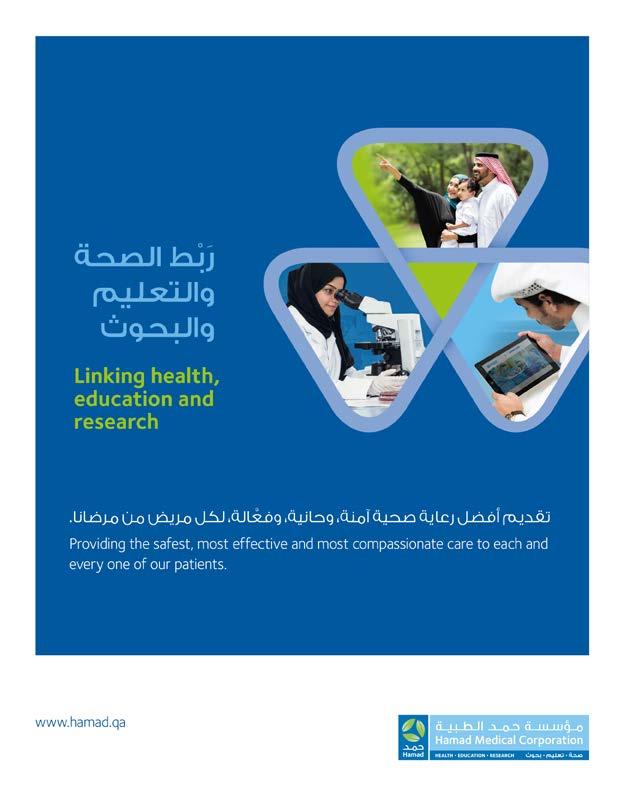

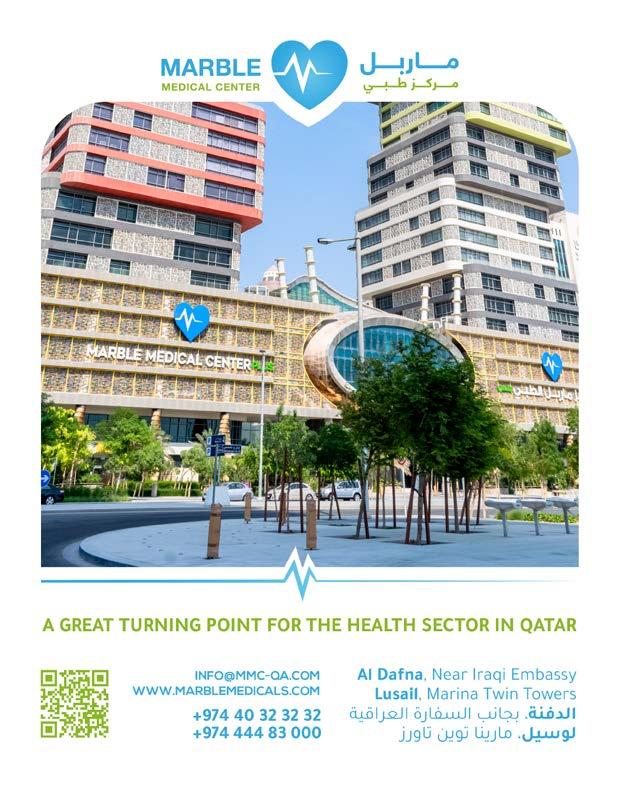
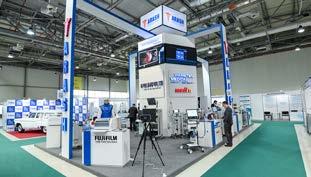
This year, on November 2-4, the 3rd Azerbaijan International Exhibition of Medical Innovations "Medinex" and the 3rd Azerbaijan International Beauty Industry Exhibition "Beauty Azerbaijan" will be held at the Baku Expo Center.
These exhibitions will once again play a fruitful and significant role in fostering entrepreneurial connections and establishing new relationships among industry experts and business owners. They will provide an opportunity for exchanging up-to-date information, facilitating business deals, and forming advantageous contracts. "Medinex" is an important and influential medical event that brings together healthcare professionals in Azerbaijan. The exhibition will feature leading local and international manufacturers and distributors who will present their new products and services to contribute to the improvement of the country's clinics, meet the demands of consumers, and enhance the effectiveness of healthcare. Among the participating countries are Azerbaijan, Turkey, the Russian Federation, Belarus, Kazakhstan, Saudi Arabia, China, the Republic of Korea, and others. The exhibition's exposition will bring together leading medical companies from various countries, as well as local medical companies and distributors.
The exhibition aims to cover various areas in the medical field, including medical information technologies, medical equipment and devices, medical products, pharmaceuticals, vitamins, and dietary supplements, orthopedic products, dental equipment and tools, dental services, optics and ophthalmology, laboratory equipment and technologies, equipment for medical institutions, medical tourism, products for the elderly, dietology, medical education, and sanitary transport departments. The Administration of the Regional Medical Divisions (TABİB) and The State Agency on Mandatory Health Insurance have confirmed their participation and are the official supporters of the "Medinex" 2023 exhibition.
Along with the "Medinex" exhibition, the beauty industry exhibition "Beauty Azerbaijan" will be held. Within the framework of the
BOTH "MEDINEX" AND "BEAUTY AZERBAIJAN" EXHIBITIONS, WITH THE PARTICIPATION OF INTERNATIONAL ATTENDEES, OFFER A GREAT OPPORTUNITY FOR NETWORKING, FOSTERING BUSINESS RELATIONSHIPS, AND EXPANDING MARKET PRESENCE.
www.medinex.az
www.beautyexpo.az
exhibition, product and service presentations are expected in sectors such as "SPA & Wellness," products for cosmetology and aesthetic medicine, perfumery, personal hygiene products, natural and organic cosmetics, decorative cosmetics, professional cosmetics, salon equipment, tools for nail services, and hair and body care products.
Within the framework of the "Medinex" and "Beauty Azerbaijan" exhibitions, various business events involving specialists from different fields of medicine are planned. As a tradition, B2B meetings will be organized, where local and international entrepreneurs will participate. These events aim to bring together industry experts on a single platform, strengthen business connections, and create excellent opportunities to expand the sales geography. Both "Medinex" and "Beauty Azerbaijan" exhibitions, with the participation of international attendees, offer a great opportunity for networking, fostering business relationships, and expanding market presence. Last year's event was attended by 92 companies from 12 different countries, including Azerbaijan, Belarus, Denmark, Algeria, Switzerland, Italy, Pakistan, Kazakhstan, the Russian Federation, Slovenia, Turkey, and Japan. In total, the exhibition was visited by over 6,000 people. Additionally, during the exhibition, various speakers conducted sessions on current topics.
The organizer of the exhibitions is Caspian Event Organisers company.



The Healthcare Financial Management Association (HFMA) is offering a new international educational opportunity with a one-day healthcare finance event, at the Global Health Exhibition (globalhealthsaudi. com) in Riyadh on Oct. 31. Selat (selat.com. sa) a Riyadh-based revenue cycle management consulting firm and its training firm Nawa (nawa-edu.com), is the exclusive sponsor of the event and will also provide instruction during the one-day educational event. Other instructors are from Saudi Arabia’s Ministry of Health and HFMA. Attendees will earn a certificate and 5 continuing professional education (CPE) credits or 5 continuing education units (CEUs) for completing this one-day program. The educational content is appropriate for a wide variety of healthcare professionals including senior finance professionals and administrators in hospitals and health systems, revenue cycle management professionals, physician leaders, insurance executives and directors and payer relations managers.

“The 2030 Transformation goals call on the healthcare finance industry to combine world-class service and local knowledge to build improved healthcare systems for all sectors and for all people who use them,” said Ahmed AlHamalawy, Executive Vice President, Selat, one of the instructors for the one-day event. “This education offers busy healthcare finance professionals an efficient and effective way to learn and network among their peers. Selat values the opportunity to sponsor this event, which reflects Selat’s mission of building better health through RCM.”
The training offers key concepts in healthcare finance and revenue cycle management, including the following:
• Value-based care
• The importance of costing
• Case mix and risk adjustments
• Patient registration
• Insurance verification
• Patient financial communications best practices
“Given the transformation occurring in the Kingdom of Saudi Arabia (KSA) and Eastern Mediterranean Region (EMR), expectations, reporting requirements and roles are on the horizon. This one-day program will take attendees through the key concepts needed to move their healthcare finance and revenue cycle management process knowledge to the next level,” said Hefin Jones, Clinical Costing Director, National Casemix Center of Excellence, Ministry of Health, Saudi Arabia, who is also an instructor for the one-day training.
The day ends with preparatory content to help attendees take HFMA’s healthcare finance certifications: the Business of Healthcare (hfma. org/boh) and the Certified Revenue Cycle Representative (CRCR) - GCC (hfma.org/gcc). Attendees who purchase the certifications will receive a discount and a one-year complimentary HFMA international membership.
“HFMA offers a broad perspective on the business of healthcare, offering healthcare professionals around the world the opportunity to improve their knowledge on the financial operations in healthcare organizations as well as the movement toward value-based care and an emphasis on the cost accounting approach,” said Mary Mirabelli, Senior VP of Strategy, HFMA.
To register for the one-day healthcare finance and RCM educational event, visit the Global Health Exhibition (globalhealthsaudi. com) site and register for complimentary entry to the event. Choose the Healthcare Financial Management Association education on Oct. 31 in the list of educational events on the registration form. For more information on registration or other questions, please send a message to GHE@hfma.org.
THOSE ATTENDING GHE CAN VISIT HFMA AT BOOTH H1.F70 AND SELAT, EXCLUSIVE SPONSOR OF HFMA’S ONE-DAY TRAINING EVENT, AT H2.A70




Can you explain broadly the practice of pediatric nephrology?
Nephrology is the study of the kidneys, while pediatric nephrology focuses on the study of children with kidney problems.
The kidneys are amongst the most vital organs in the body—they help regulate your hormones, growth, and blood pressure, remove toxins, and balance fluids, acid-base, salts, and minerals. Also, the kidneys send important signals to other organs in the body, so when the kidneys are affected, you see that impact on the entire body. Kidneys may be affected by conditions that are short-lived or those which are longstanding, requiring ongoing care and, at times, necessitating dialysis when the function of the kidneys is impaired.
To become a pediatric nephrologist, I
Assistant Professor of Pediatrics at Weill Cornell Medicine-Qatar (WCM-Q) and Consultant Pediatric Nephrologist at Sidra Medicine
Dr. Reshma Bholah is an Assistant Professor of Pediatrics at Weill Cornell Medicine-Qatar (WCM-Q) and a Consultant Pediatric nephrologist at Sidra Medicine. She received her medical degree from WCM-Q in 2011 and then spent a year researching reactive airways at Cornell University in New York. Dr. Bholah completed her residency in pediatrics in 2015 and her sub-specialty training in pediatric nephrology in 2018 at Virginia Commonwealth University in Richmond, Virginia. She is certified in general pediatrics and pediatric nephrology by the American Board of Pediatrics. Dr. Bholah spoke with "Hospitals" magazine on the importance of pediatric nephrology as a specialty and what a career in the practice would entail.
completed my initial training in pediatrics and subsequently did further training in pediatric nephrology.
Please describe your current professional role.
I teach various aspects of the medical curriculum at WCM-Q from the first to fourth year of medical school. During the first year, I teach the basics of first patient encounters, going through the motions of getting their medical history, and performing physical exams of the different organ systems.
At the same time, I also help students with medical documentation, the process of gathering information on each patient in a systematic way. Then, as students progress, I teach them about pediatrics and pediatric
"TO BECOME A PEDIATRIC NEPHROLOGIST, I COMPLETED MY INITIAL TRAINING IN PEDIATRICS AND SUBSEQUENTLY DID FURTHER TRAINING IN PEDIATRIC NEPHROLOGY."

"The kidneys are amongst the most vital organs in the body—they help regulate your hormones, growth, and blood pressure."
nephrology. Hence, I also lead ‘transition courses,’ such as the transition to clerkship course, which helps bridge students from pre-clinical to clinical setting, and a transition to residency course, which helps students transition from the undergraduate medical program to graduate medical education, which residency programs offer.
What kinds of medical conditions do you typically encounter in your practice?
As pediatric nephrologists, we see patients from birth to adolescence. From birth, the patients we typically see have congenital defects of the kidneys, while the patients I follow chronically may have anything from blood in the urine, protein in the urine, kidney stones, complicated urinary tract infections, vesicoureteral reflux, and various other structural anomalies of the kidneys. I also see patients with high blood pressure and with a multitude of conditions that affect the filtering units of the kidneys—the glomeruli.
I have to stress that nephrology is a specialty that takes an interdisciplinary approach to patients, meaning we do not work in silos. In addition to pediatric nephrologists, our care team includes a dietician, who is crucial for patients with chronic kidney disease since we need to ensure adequate nutrition.
We also have a social worker who helps patients with financial resources and a team of nurses who specialize in supporting various forms of dialysis. Additionally, we work with physicians in other specialties, including ICU doctors, rheumatologists, endocrinologists, cardiologists, and urologists, to name a few, because we share patients who have systemic illnesses involving the kidneys and other organ systems. Working in partnership with other teams enables us to care for patients holistically, which is crucial to optimal patient care.
Which factors influenced your decision to pursue this career path?
During my pediatric training, I often cared for patients with kidney problems. I also developed a relationship with the pediatric nephrologists
with whom I worked, and they helped me understand what the field was essentially all about. When you work with people who have a passion for what they do, their enthusiasm inspires you a lot.
That said, it was not just the disease process that I found intellectually stimulating but also how the team approached it. I took an interest in seeing patients with various nuances of their disease processes. For example, when you tend to patients who are critically ill, you work alongside intensive care physicians in the pediatric or neonatal ICU while also taking care of patients who are much more stable in the general ward. What I love about this career is the possibility of having a different pace. The reason being is that I could not see myself sitting behind a desk and seeing patients at a clinic all day, every day. I love being able to change pace in what I do, and this career offers me that flexibility.
What have you found to be particularly rewarding in your career?
Well, the rewarding part of this career is being able to see patients longitudinally. What I love about this field is that I can follow patients for many years, which allows me to build rapport with my patients—I sincerely appreciate this aspect of patient care as a physician.
I tend to think that the crucial aspect of medicine is the notion of helping. It is perhaps the general misconception—partially generated by modern practice—that the job of a physician is to prescribe drugs. On the contrary, it is about trying to understand every nuance of patient care so that you know exactly which resources to offer patients at every stage. By building rapport and having a sort of social intimacy, patients and their families open up to you. Therefore, unless you are able to develop this connection with patients and their families, you will not be able to fully help them.
Additionally, if you want to be intellectually
"AS PEDIATRIC NEPHROLOGISTS, WE SEE PATIENTS FROM BIRTH TO ADOLESCENCE. FROM BIRTH, THE PATIENTS WE TYPICALLY SEE HAVE CONGENITAL DEFECTS OF THE KIDNEYS, WHILE THE PATIENTS I FOLLOW CHRONICALLY MAY HAVE ANYTHING FROM BLOOD IN THE URINE, PROTEIN IN THE URINE, KIDNEY STONES, COMPLICATED URINARY TRACT INFECTIONS, VESICOURETERAL REFLUX, AND VARIOUS OTHER STRUCTURAL ANOMALIES OF THE KIDNEYS. "
stimulated, this field will suit you well. Pediatric nephrology makes you humble because of the complexities of the inner workings of the kidneys, which bring about continuous research in the field and, thus, new knowledge. It motivates you to develop a good grasp on other bodily organs because the kidneys themselves are intertwined with them either causally or consequentially.
Moreover, thinking critically and sharpening intuition regarding patients is what pediatric nephrology demands. Thus, it keeps you on your toes, and that is really rewarding.
How do you envision the future of this area of specialization?
Around the world, we are a very small subset of physicians who specialize in pediatric nephrology. If the current shortage of pediatric nephrologists continues, children suffering from various kidneyrelated conditions will not receive adequate care! This is going to become a challenge for different countries and populations who will not have the means to help these children grow and achieve the best of health. I am, however, optimistic that this pendulum will shift and that we will continue to attract more physicians into this really rewarding field.
"PEDIATRIC NEPHROLOGY MAKES YOU HUMBLE BECAUSE OF THE COMPLEXITIES OF THE INNER WORKINGS OF THE KIDNEYS, WHICH BRING ABOUT CONTINUOUS RESEARCH IN THE FIELD AND, THUS, NEW KNOWLEDGE. "
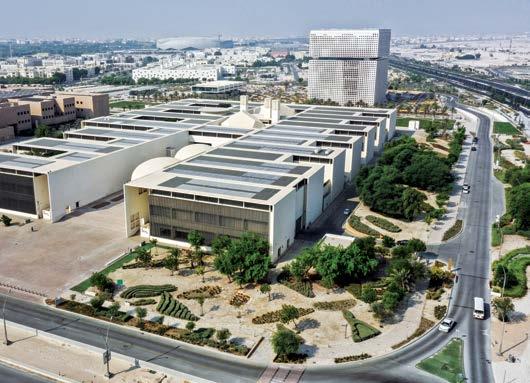

In the ever-evolving world of healthcare, what truly defines a hospital's stature? The answer lies in its commitment to technological advancements, multi-specialty services, international accreditations, and above all, a compassionate approach to patient care.
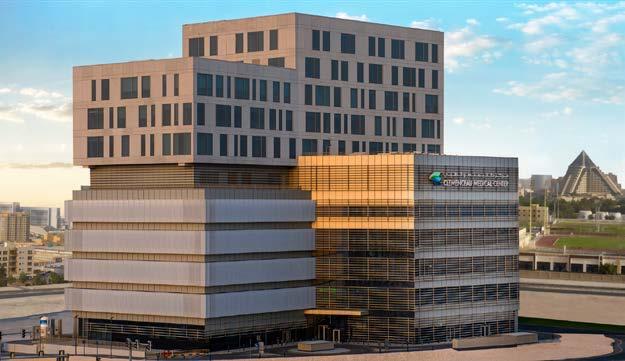
Situated just 8 minutes from Downtown Dubai in Dubai Health Care City, Phase II, Clemenceau Medical Centre (CMC) Hospital stands tall with its 100-bed facility.
With over 20 years of unparalleled service in the region, CMC's affiliation with the esteemed Johns Hopkins Medicine International further solidifies its reputation. But as they say, excellence is an ongoing journey. It demands the perfect blend of skilled medical professionals, state-of-the-art technology, innovative treatments, and a fivestar patient experience.
At the Clemenceau Medical Center in Dubai, our dedication is to provide unparalleled healthcare experiences that surpass patient expectations.
Dr. Alya Al Mazrouei, CEO of CMC Hospital, Dubai, proudly states: “At CMC we care beyond the parameters of healthcare. We strive to build trust by providing our services with integrity. Our employees are our most valuable assets. We are constantly working towards building an exceptional culture which will attract and retain exceptional employees. We deliver the best evidence-based clinical practice, a person-centered experience supported by systems and processes, that focuses on patients, families, and all members of our organization. A genuine sense of caring and concern seeing our service provisions as relationships and not transactions with patients, families, and one another.”
WITH OVER 20 YEARS OF UNPARALLELED SERVICE IN THE REGION, CMC'S AFFILIATION WITH THE ESTEEMED JOHNS HOPKINS MEDICINE INTERNATIONAL FURTHER SOLIDIFIES ITS REPUTATION. BUT AS THEY SAY, EXCELLENCE IS AN ONGOING JOURNEY.
CMC Hospital is not just about medical treatments; it's about the entire patient experience. From the moment one steps in, they are greeted with a blend of comfort, convenience, and sophistication.
The hospital boasts state-of-the-art equipment, offering a plethora of essential health services in a luxurious ambiance. Whether it's the filmless digital imaging, advanced laparoscopy, OR automation systems, or the real-time video teleconferencing diagnostic centers, CMC ensures the highest levels of safety and patient care.
From a 100-bed care center to specialized departments like Endocrinology, ENT, Oncology and Hematology, and Pulmonology, CMC offers a comprehensive range of services. Their international collaborations, especially with Johns Hopkins Medicine International, further enhance their service offerings, bringing in visiting specialists from various fields.
The majority of doctors at CMC Dubai hold certifications from the US, UK, or Europe, or have undergone extensive fellowship training in medical subspecialties. This commitment to excellence extends to every department, be it the Advanced Cardiovascular Unit, Cancer Care Hospital, Diabetes Center, or the Bariatric Surgery and Weight Loss Program.
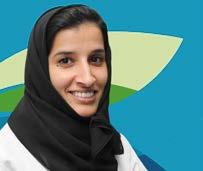
The hospital boasts a specialized floor dedicated to cardiovascular treatment, encompassing a modern Cath Lab, outpatient

CMC HOSPITAL IS NOT JUST ABOUT MEDICAL TREATMENTS; IT'S ABOUT THE ENTIRE PATIENT EXPERIENCE. FROM THE MOMENT ONE STEPS IN, THEY ARE GREETED WITH A BLEND OF COMFORT, CONVENIENCE, AND SOPHISTICATION.

cardiology services, an Electrophysiology Lab, non-invasive cardiac labs, testing rooms, and specialized Cardiac Care Unit rooms. Renowned surgeons, certified by UK, USA, and German boards, are on hand for a diverse array of heart surgeries.
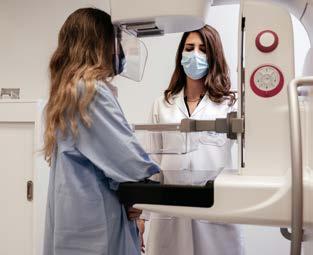
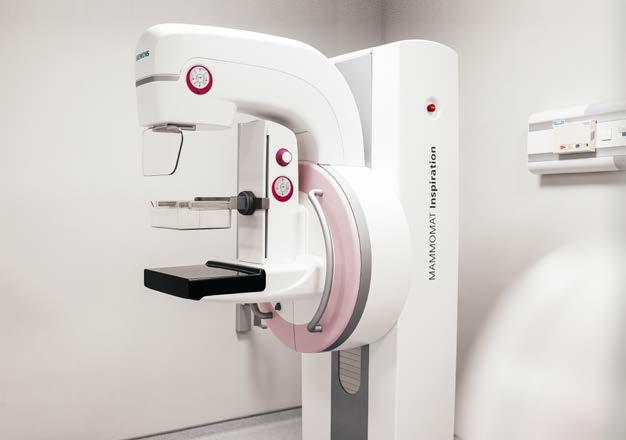
CMC Dubai is home to a formidable team of cancer specialists, many of whom have UK & US Board certifications. This includes oncologists, hematologists, surgeons, radiologists, and pathologists. Additionally, there's a specialized unit for breast cancer diagnosis and treatment, complemented by robotic surgical options for various cancer treatments.
The dedicated Diabetes Unit offers end-toend diabetes care, from diagnosis to treatment,
and features specialized educators and podiatrists to address diabetic foot concerns.
CMC Dubai's weight loss solutions are among the industry's best. The program, backed by a multidisciplinary team, offers both non-surgical treatments like gastric balloons and advanced surgical procedures, including laparoscopic and robotic gastrectomy and bypass procedures.
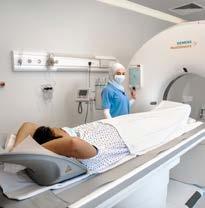
For women requiring advanced gynecological interventions, CMC provides a spectrum of the latest non-invasive and minimally invasive procedures. This includes treatments for common issues like fibroids, where patients can opt for laparoscopic, robotic, or non-surgical interventional radiology treatments. Additionally, for hysterectomies, patients have access to laparoscopic, robotic, and the innovative 'Scar-Free' vNOTES procedures.
CMC Dubai is a cutting-edge surgical facility boasting the Davinci Robotic system and Orthopedic Robotic Surgery tools. The expertise of our Robotic Surgery team is
unparalleled in the region, with a track record of over 3000 robotic procedures. Our esteemed Robotic Surgery Center of Excellence conducts:
• Robotic General Surgery
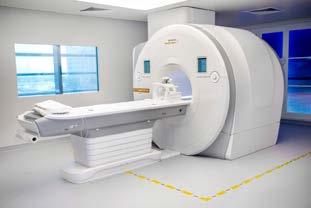
• Robotic Urological Surgery
• Robotic Gynecological Surgery
• Robotic Bariatric Surgery
• Robotic Orthopedic Surgery
As Dubai's healthcare landscape continues to evolve, CMC Hospital remains committed in its mission. With a focus on continuous improvement, the introduction of cutting-edge technologies, and the recruitment of the best medical talent, CMC ensures that evidencebased care and optimal patient outcomes remain central to its service.
Clemenceau Medical Center Hospital Dubai is more than just a hospital; it's a testament to what healthcare can achieve when excellence is the guiding principle. Whether you're seeking the best in robotic surgery, world-class doctors, or innovative medical treatments, CMC Dubai stands ready to serve.
FOR WOMEN REQUIRING ADVANCED GYNECOLOGICAL INTERVENTIONS, CMC PROVIDES A SPECTRUM OF THE LATEST NONINVASIVE AND MINIMALLY INVASIVE PROCEDURES. THIS INCLUDES TREATMENTS FOR COMMON ISSUES LIKE FIBROIDS, WHERE PATIENTS CAN OPT FOR LAPAROSCOPIC, ROBOTIC, OR NON-SURGICAL INTERVENTIONAL RADIOLOGY TREATMENTS.
It is well known that the Saudi healthcare sector is the largest among the Gulf countries, given that the Kingdom is the largest in terms of area, population, and economy. The Kingdom accounts for approximately 48 percent of the total government spending on healthcare in the Gulf, with costs expected to exceed $23 billion in the current year. Meanwhile, the healthcare sector's budget has increased by $4.5 billion, indicating the massive funding that the government is providing to advance this sector and always keep it at the forefront of leadership. Although the COVID-19 pandemic exposed the weaknesses of many large healthcare sectors worldwide, the Saudi healthcare sector showed
THE HEALTHCARE SECTOR IN THE KINGDOM OF SAUDI ARABIA HAS ACHIEVED A SIGNIFICANT QUALITATIVE LEAP, RECORDING THE HIGHEST EFFICIENCY, SAFETY, AND PATIENT CARE LEVELS.

remarkable resilience against any decline and resistance to any pressures. This is because its leadership has placed health and medical services at the top of the Vision 2030 priorities, making it the focus of citizens and expatriates.
The healthcare sector in the Kingdom of Saudi Arabia has achieved a significant qualitative leap, recording the highest efficiency, safety, and patient care levels. The Kingdom has prepared the Ministry of Health's 2030 strategic plan to ensure the full and purposeful implementation of the healthcare transformation program. The health transformation program is working on restructuring the sector to be based on individual and community service. The
plan aims to focus on public health, enhance disease prevention, facilitate individuals' access to healthcare services, and increase patient satisfaction with the services provided.
In the short term, by 2025, the plan aims to achieve several goals, including increasing the percentage of populated areas covered by health services to 88% to facilitate individuals' access to healthcare services. The plan also aims for 100% of the Kingdom's population to be included in a unified digital medical record by 2025, improving medical practice and enhancing doctors' ability to diagnose and treat diseases.
Vision 2030 also addresses mental health, focusing on the psychological well-being of individuals and society. The healthcare sector's development was evident during the spread of the COVID-19 pandemic and in addressing its impacts. The Kingdom has achieved several accomplishments, including digitizing the healthcare sector by launching apps to improve healthcare services, such as the 'Sehaty' and 'Mawid' applications.
Additionally, there has been a reduction in the rate of deaths resulting from road accidents, a decrease in the time required to provide healthcare, and the creation of a clean, health environment and community free of any pollution or hindrances that prevent it from enjoying good health.
The private medical sector has also taken initiatives for years to collaborate with the Ministry of Health in providing various medical services. They have reached a level of trust and professional competence among their staff to a high degree. For example, approximately 12
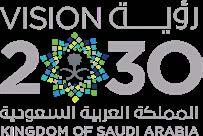

MENTAL HEALTH, FOCUSING ON THE PSYCHOLOGICAL WELL-BEING OF INDIVIDUALS AND SOCIETY. THE HEALTHCARE SECTOR'S DEVELOPMENT WAS EVIDENT DURING THE SPREAD OF THE COVID-19 PANDEMIC AND IN ADDRESSING ITS IMPACTS. THE KINGDOM HAS ACHIEVED SEVERAL ACCOMPLISHMENTS, INCLUDING DIGITIZING THE HEALTHCARE SECTOR BY LAUNCHING APPS TO IMPROVE HEALTHCARE SERVICES, SUCH AS THE 'SEHATY' AND 'MAWID' APPLICATIONS.
million expatriates benefit from private medical services, benefiting insurance companies as well. Healthcare services are provided to more than 31 million citizens and residents and several million visitors during the Hajj and Umrah periods through healthcare facilities that include medical cities, specialized hospitals, university hospitals, military hospitals, and primary care centers.
There's no doubt about the significant achievements that the Kingdom of Saudi Arabia has made in the healthcare sector, both in the public and private sectors. These successes have made the Kingdom a destination for those seeking medical treatment from abroad, whose numbers are increasing daily.
Saudi medical centers and numerous hospitals have been listed among the best hospitals worldwide in reliable international reports, including rankings by the American magazine Newsweek.' Countries were chosen based on various factors for comparison, such as living standards, average life expectancy, population size, number of hospitals, and data availability. More than 80,000 medical experts were invited to participate in the online survey, which focused on patient experience and hospital quality metrics, like quality of care data and hygiene procedures.
Recently, a 'Newsweek' ranking revealed that Saudi hospitals are among the best in 28 countries worldwide, followed by the UAE. The report clarified that American hospitals took the top three spots among 250 global hospitals.
The ranking included 34 hospitals in the Kingdom, listing (according to specific ranking criteria) the top 10 Saudi hospitals for the year 2023 as follows:
1. King Faisal Specialist Hospital and Research Center - Riyadh
2. King Abdulaziz Medical City (National Guard Health Affairs) - Riyadh
3. King Abdullah Medical City - Mecca
4. King Fahd Medical City - Riyadh
This undoubtedly indicates the success of Saudi hospitals in achieving global standards in service, care, and patient outcomes. This could only have happened with the wise public and private management and the considerable efforts exerted across various locations and over years of dedication, persistence, and spending.
Over time, several major private hospitals have emerged in various regions and have transitioned into publicly traded joint-stock companies, partially offering their shares for public subscription. Regulations and governance systems in the healthcare sector have reached a high level of trust and security. The Saudi Ministry of Health recently launched three initial initiatives within a program to stimulate private sector facilities to transition into public jointstock companies. These align with the Financial Sector Development Program, one of the 12 executive programs launched by the Council for Economic and Development Affairs.
The three initiatives include:
1. Giving priority to nationally listed companies in the Saudi financial market to access training programs provided by the Ministry, along with special privileges, by offering the programs at incentive fees.
2. Prioritizing healthcare to access additional information and data for reports and statistics related explicitly to the Ministry for all nationally listed companies in the Saudi financial market.
THE KINGDOM HAS ALSO IMPLEMENTED A UNIFIED AND COMPREHENSIVE SYSTEM FOR ALL HEALTH LICENSING SERVICES, WHICH FEATURES DIRECT TECHNICAL INTEGRATION WITH ALL RELEVANT GOVERNMENT AGENCIES. FOR EXAMPLE, A HEALTHCARE FACILITY OWNER CAN OBTAIN PRELIMINARY APPROVAL FOR A LICENSE AND ISSUE THE FINAL PERMIT THROUGH REGISTRATION ON THE ELECTRONIC HEALTH SERVICES PLATFORM "SEHA." HEALTHCARE PRACTITIONERS CAN ALSO GET A PERMIT TO PROVIDE ELECTRONIC SERVICES THROUGH THE SEHA PLATFORM WITHIN 30 SECONDS.
3. Granting speaking and advertising privileges to these national companies at events organized by the Ministry
All health authorities in the Kingdom of Saudi Arabia confirm that since the country's establishment, public health and disease prevention have been among the government's top priorities. Subsequent health legislation have affirmed this vision and laid out its executive mechanisms. The health law in Saudi Arabia aims to provide comprehensive healthcare to all people in a fair and accessible manner. Healthcare in government medical facilities is offered to citizens free of charge, based on a new health strategy that meets the needs of the healthcare sector. In cases where a patient is referred for treatment outside their residence within or outside the Kingdom, the Ministry of Health bears the expenses of the patients and their companions during the treatment period.
The Kingdom has also implemented a unified and comprehensive system for all health licensing services, which features direct technical integration with all relevant government agencies. For example, a healthcare facility owner can obtain preliminary approval for a license and issue the final permit through registration on the electronic health services platform "Seha." Healthcare practitioners can also get a permit to provide electronic services through the Seha platform within 30 seconds.
The Ministry of Health has provided an interactive map on its website that shows all locations of government medical facilities and other relevant information about the facilities. To facilitate beneficiaries' access to healthcare services and ease their transition between different types of care, the Ministry aims to launch healthcare clusters across all regions of the Kingdom.
These clusters will allow the movement of medical expertise and provide the beneficiary with an integrated and interconnected network of healthcare service providers under a single administrative structure.
The Kingdom has facilitated access to healthcare services, increasing the percentage
5. King Saud Medical City - Riyadh 6. Dr. Sulaiman Al Habib Hospital - Jeddah 7. Prince Sultan Military Medical CityRiyadh 8. King Faisal Specialist Hospital and Research Center - Jeddah 9. Johns Hopkins Aramco Healthcare Center - Eastern Province 10. King Abdulaziz Medical City (National Guard Health Affairs) - Jeddahof urban and rural communities that have access to essential healthcare services at their locations from 78% in 2016 to 85.7% in 2020, with the number expected to rise further in 2023. To protect against the consequences of health crises and disasters, a specialized center known as the National Center for Health Emergency Operations has been established.
It is a strategic project aimed at enhancing health crisis and disaster management at national and local levels. The center provides decision-makers with accurate information in crises for use in early warnings. The Kingdom has stayed in the field of digital health, one of the most essential transformation programs managed by the Vision Realization Office within the Ministry of Health.
Digital technology plays a vital role in supporting the delivery of a digital health vision and in implementing this effective strategy. The digital healthcare system aims to transform healthcare delivery by expanding the application of technology to provide safer and more efficient healthcare services for the Kingdom's community.
The Ministry of Health has created a health passport system for mothers and children. This records their medical history, monitors their health, and requests necessary tests and analyses. All this information is then documented in the health passport for use in healthcare centers, serving as the primary reference for the health of mothers and children. This measure aims to provide comprehensive healthcare, safe pregnancy, and healthy childhood. The elderly are also given special attention in Saudi society, as the state offers special programs to meet their needs. It is also committed to protecting the rights of people with disabilities and striving to achieve well-being and a decent life for them and their families.
After all this effort and all the achievements aimed at providing the best service to patients and the best health safety for society, it is essential to look at patient satisfaction. From
THE MINISTRY OF HEALTH HAS CREATED A HEALTH PASSPORT SYSTEM FOR MOTHERS AND CHILDREN. THIS RECORDS THEIR MEDICAL HISTORY, MONITORS THEIR HEALTH, AND REQUESTS NECESSARY TESTS AND ANALYSES. ALL THIS INFORMATION IS THEN DOCUMENTED IN THE HEALTH PASSPORT FOR USE IN HEALTHCARE CENTERS, SERVING AS THE PRIMARY REFERENCE FOR THE HEALTH OF MOTHERS AND CHILDREN. THIS MEASURE AIMS TO PROVIDE COMPREHENSIVE HEALTHCARE, SAFE PREGNANCY, AND HEALTHY CHILDHOOD. THE ELDERLY ARE ALSO GIVEN SPECIAL ATTENTION IN SAUDI SOCIETY, AS THE STATE OFFERS SPECIAL PROGRAMS TO MEET THEIR NEEDS.
this standpoint, the Saudi Ministry of Health has adopted a Patient Experience Measurement Program. This is one of the Ministry's initiatives aimed at empowering key beneficiaries (patients and their families) to participate in improvement by measuring their satisfaction after receiving various healthcare services in facilities operating under the Ministry of Health. This is done through questionnaires designed for each journey separately and through an independent third party to ensure impartiality in the results. The program measures satisfaction in hospitals, specialized centers, primary healthcare, blood banks, smoking cessation centers, pre-marital screening centers, and other services provided.
The program's outcomes are determined through:
• Measuring patient satisfaction in the facilities and services of the Ministry of Health to develop improvement projects for the quality of services and the patient experience in accessing them, and work on increasing the satisfaction of the beneficiaries.
• Providing decision-makers with data to assist in making important decisions based primarily on the interests of the beneficiaries.
• Setting a unique standard for patient experience levels at the national level.
• Comparing the level of services provided between Ministry facilities in different regions.
• Comparing patient experience levels in Ministry of Health facilities with their counterparts at the GCC and international levels.
• Understanding the priorities and factors for improving the patient experience at the level of facilities and services of the Ministry of Health.
• After all this, the Saudi healthcare sector has gained the trust of patients domestically and global rating references internationally, thus culminating noble endeavors and efforts that have proven fruitful.
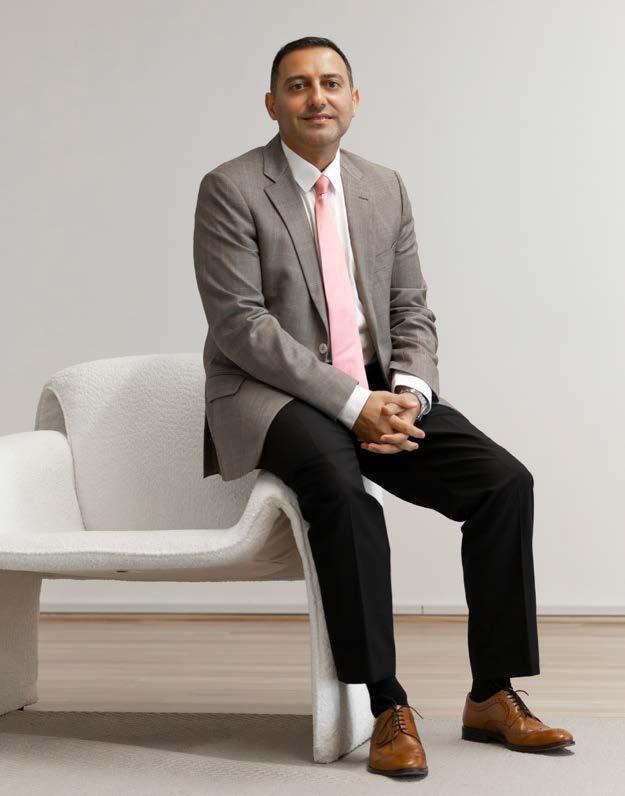
Dedalus is a global leading software company, one of the largest in the world. It offers open standard-based holistic solutions to support a radical change from an "episodic centric" approach to the "continuum of care". ‘Hospitals’ magazine interviewed Mr. Sam Amory, Managing Director for Dedalus MEA, who talked about the company and the complex digital healthcare solution benefits.
There is still a huge backlog of elective surgeries in the aftermath of Covid-19. We are also facing a global issue of personnel shortages due to ever increasing pressure and demand with an aging population. We are seeing burnout and fatigue, as well as recruitment and retention struggles. Healthcare equity is a huge challenge that the healthcare system faces, we still see large portions of underprivileged communities being unable to access even the most basic healthcare needs.
Digital transformation and the integration of Artificial Intelligence (AI) have emerged as game-changers in the healthcare sector, offering innovative solutions to alleviate the administrative burden on caregivers, thereby addressing global workforce shortage challenges. Dedalus Enterprise Management (EM) stands as a prime example of this transformation. This modular, scalable hospital information system supports end-to-end workflows, enabling streamlined operations and optimized resource utilization. Its adoption offers numerous benefits, including increased
productivity, cost reduction, risk mitigation, improved patient safety, heightened patient satisfaction, and the instantaneous delivery of critical information at the point of care.
Hospital Information System approach, EM covers administration, financials, clinical and clinical support, system management, and interoperability services. This comprehensive coverage fosters interoperability and seamless data exchange across functional areas within healthcare facilities, resulting in improved collaboration among clinicians and informed decision making.
We have witnessed a huge progress in telehealth and telemedicine since the Covid pandemic. How did you cope with this challenging time?
At Dedalus, we effectively navigated the challenges brought about by the COVID-19 pandemic by embracing the surge in demand for telehealth services, which were crucial for maintaining social distancing. To ensure a smooth transition, we seamlessly integrated telehealth into our existing processes. Patients could conveniently book both telehealth and traditional appointments directly through our patient administration system, eliminating the need for duplicate data entry and preserving our established workflow.
Our commitment to comprehensive care remained unwavering during telehealth consultations. Dedalus ensured that patients and clinicians had access to the full suite of capabilities provided by platforms like TEAMS, including features such as sharing, video conferencing, audio communication, and chat functionality. This approach led to a notable decrease in patient no-shows, as physical visits to our facility were no longer mandatory. This transformation not only improved access to care but also saved patients valuable time
"Dedalus has implemented an Information Security Management System (ISMS) aligned with ISO 27001"
DEDALUS ENTERPRISE MANAGEMENT (EM) STANDS AS A PRIME EXAMPLE OF THIS TRANSFORMATION. THIS MODULAR, SCALABLE HOSPITAL INFORMATION SYSTEM SUPPORTS END-TO-END WORKFLOWS, ENABLING STREAMLINED OPERATIONS AND OPTIMIZED RESOURCE UTILIZATION.
and reduced work disruptions, ultimately contributing to greater patient equity.
Dedalus is a leading healthcare and diagnostic software provider in the world, can you tell us how a complex digital healthcare solution benefits the individual or the patient healthcare journey?
Dedalus has recently launched its latest command centre solution. At its core, we believe in four essential principles that make the Dedalus Command Centre truly effective.
Firstly, we are able to provide you a realtime X-ray view of your operations, looking at potential risks and a surveillance system that keeps things in check.
Secondly, we digitize core metrics, allowing healthcare organizations to monitor vital measures and assess their progress toward specific targets.
Our Command Centre is further bolstered by an AI-powered expert rules engine, which intelligently understands challenges and seamlessly integrates actionable insights into the healthcare team's workflow.
Lastly, we are unlocking the treasure chest of information that fuels the Command Centre. And you can get all of that in sub second.
By implementing the Dedalus Command Centre, organizations can enhance the utilization of their operating theatres by up to 20%, thanks to real-time insights that lead to improved decision making and optimized patient care. This innovation benefits both healthcare providers and individual patients by ensuring the best possible healthcare journey and outcomes.
We can see that healthcare is shifting to a more personalized care but we still see many traditional healthcare organizations stuck in the old system. What are you doing as a company to help them shift to a more personalized approach to care?
At Dedalus, we are focused on a patientactive approach, to overcome the passive patient-centred approach. As mentioned previously, perhaps our number one challenge is related to workforce shortages. Taking on this challenge requires special features such as
automated workflows, solutions that are able to provide clinical knowledge, and we must encourage upskilling based on content and guidelines and make sure we relieve healthcare providers of any non-patient related work.
Collaboration across specialties and departments becomes effortless, ensuring a holistic approach to patient care. This interconnectedness translates to comprehensive diagnoses, well-coordinated treatment plans, and an overall improved patient journey.
A critical aspect of Dedalus' solution is patient empowerment. Through secure patient portals, individuals gain access to their medical records, test results, and treatment plans. This transparency fosters a sense of involvement in their own healthcare journey, enabling patients to make informed decisions and actively engage with their care providers.
We know that the future of healthcare is digital but there is a great concern when it comes to digitalisation; cyber security. Can you tell us how you tackle this particular challenge?
We provide solutions that are edge-proof or "any cloud" proof, ensuring privacy and security. For example, our new IT backbone architecture is based on privacy and security with the introduction of a security operation centre. Dedalus has implemented an Information Security Management System (ISMS) aligned with ISO 27001.
“Life
Software” what a beautiful statement. Can you tell us more about the vision and mission of Dedalus?
Dedalus proudly holds its place as a global leader in the software industry, ranking among the world's largest and most influential companies. Our sphere of influence extends across the entire continuum of care, as we specialize in providing comprehensive, open standard-based solutions. These solutions serve as a catalyst for a profound shift in healthcare from a traditional 'episodic-centric' approach to a more patient-centric 'continuum of care' paradigm. Our unwavering dedication to excellence and innovation underscores our commitment to advancing healthcare on a global scale.
A CRITICAL ASPECT OF DEDALUS' SOLUTION IS PATIENT EMPOWERMENT. THROUGH SECURE PATIENT PORTALS, INDIVIDUALS GAIN ACCESS TO THEIR MEDICAL RECORDS, TEST RESULTS, AND TREATMENT PLANS. THIS TRANSPARENCY FOSTERS A SENSE OF INVOLVEMENT IN THEIR OWN HEALTHCARE JOURNEY, ENABLING PATIENTS TO MAKE INFORMED DECISIONS AND ACTIVELY ENGAGE WITH THEIR CARE PROVIDERS

JUST ONE OF OUR 200+ PRODUCTS
A CENTRALISED HEALTHCARE OPERATIONS CONTROL CENTRE IN WHICH REAL-TIME PREDICTIVE ANALYTICS ARE ACCUMULATED FROM VARIOUS DATA SOURCES, TO MANAGE LOGISTICS, VISIBILITY AND COORDINATION WITHIN THE HEALTHCARE ECOSYSTEM
Real-time insights into organizational performance
Improved communication and real-time alerts
Optimised staffing and expedited access to patient care
Improved patient flow with real-time data and reporting
Prospective analytics powered by AI , ML and Digital Twin
Appropriate disinfection and sterilization is crucial in healthcare settings to avoid contamination and illness in both patients and professionals. "Hospitals" magazine had the chance to discuss the importance of infection control with Mr. Srouji, Regional Director of Belimed, a leading supplier of medical and surgical instrument sterilization, disinfection, and cleaning products and services. Below is the full interview:
Let's begin by discussing Belimed. Could you elaborate on the company's
inception, its vision in the realm of infection control, and the extent of its global presence?
Belimed has its headquarters in Zug Switzerland and is part of the Metall Zug Group of companies. The Group has around 2,400 employees. As part of our vision to be the leaders in our field, Belimed’s focus is solely on our core competency of infection control.
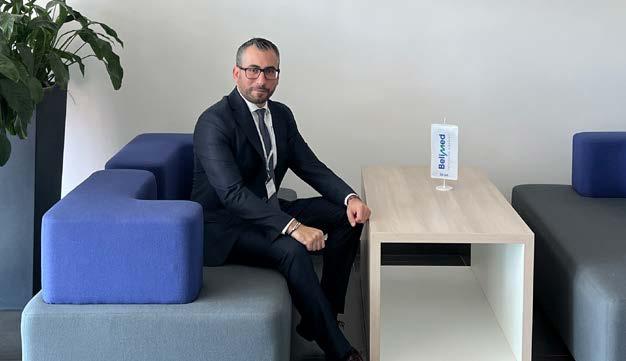
With over 50 years of history, our priority at Belimed is to empower our customers to advance medical care and protect lives of patients and staff.
Known as engineers of confidence, we
"With over 50 years of history, our priority at Belimed is to empower our customers to advance medical care and protect lives of patients and staff"
Jad Srouji
AS PART OF OUR VISION TO BE THE LEADERS IN OUR FIELD, BELIMED’S FOCUS IS SOLELY ON OUR CORE COMPETENCY OF INFECTION CONTROL
continually evolve our technology-driven portfolio, innovate ways to improve reliability, efficiency and sustainability in sterile processing departments.
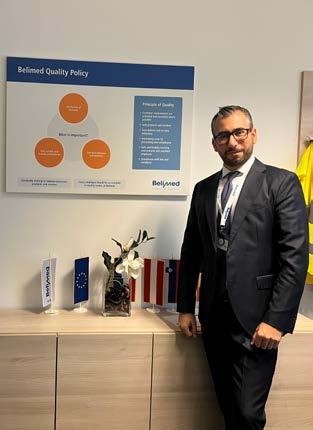
At Belimed we partner with our customers to make sure their needs are accurately assessed, understood and addressed, our dedicated teams provide superior levels of service, and we are forever innovating better ways to improve performance, efficiencies and sustainability.
What are the innovative solutions and methods offered by Belimed?
Prior to offering our customized solutions, we truly listen to our customers, ensuring to deliver a complete range of medical cleaning disinfection and sterilization solutions. Our global offer includes planning and advisory services, cutting-edge equipment, consumables and services with a clear focus on best Total Cost of Ownership (TCO). Our excellent operational and after-care services are enabled by data-driven solutions, training and education programs to empower our customers.
Could you provide an overview of the specialized devices and technologies that you offer within the domain of infection control?
Our cutting-edge equipment includes a wide range of washer disinfectors, high-end sterilizer machines with horizontal or vertical sliding doors with a variety of volumes, Endoscopy AERs, cart washers, SmartHub Software Solution, chemicals, in addition to the complete range of accessories and furniture to cater to all the needs of establishing a state-ofthe-art Sterilization Department.
What unique attributes or advantages distinguish your company from competitors in the field?
Our main aim is to provide a real solution to the customer, and by that we mean to partner with our clients, truly understand and address all their needs, worries and problems in order to provide the best customized solution that fits and optimizes their outcome.
To achieve that, our team of experts provide a matrix of services starting with the planning and design where surgical workflow is the utmost priority, combining that with the cutting-edge machines, a full range of accessories, educational program in our specialized academy, excellent operation and after-sales services. Our Belimed R&D focuses on providing sustainable equipment options to lower customers’ operational cost.
OUR GLOBAL OFFER INCLUDES PLANNING AND ADVISORY SERVICES, CUTTINGEDGE EQUIPMENT, CONSUMABLES AND SERVICES WITH A CLEAR FOCUS ON BEST TOTAL COST OF OWNERSHIP (TCO)
For the first time in its history of seventy years, the World Summit for Clinical Chemistry and Laboratory Medicine, will be held outside of Europe, in the United Arab Emirates in Dubai, the city of achievements and wonders. It is a historic milestone for the city of Dubai to host this prestigious summit that contributes to advancing healthcare and prevention and reinforcing UAE’s commitment towards becoming the hub of scientific innovations and knowledge exchange.
This vibrant city annually attracts what major cities and global capitals find challenging to do and hosting this summit is yet another outstanding achievement for the city of Dubai.
This summit is held under the patronage of Sheikh Nahyan bin Mubarak Al Nahyan, Minister of Tolerance and Coexistence and the President of the UAE Genetic Diseases Association.
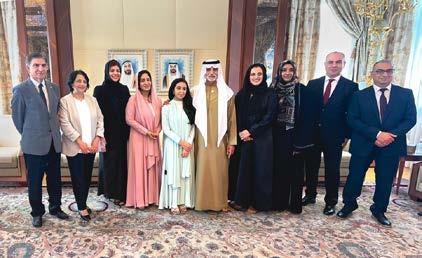
The international conference is a collaboration of UAE Genetic Diseases
Association, the Saudi Society for Clinical Chemistry, and the Arab Federation for Clinical Biology. The conference will open its doors from 26th to 30th May, 2024. Based on the previous edition held in Italy in 2023, organizers expect to welcome more than 11,000 scientists and specialized doctors to the UAE to join the event.
The four-day conference will host multiple forums and sessions which offer opportunity for knowledge exchange, scientific research, and discussions on the latest developments in clinical chemistry and laboratory medicine.
Professor Khosrow Adli, the organisation's president, emphasized, "The International Conference on Clinical Chemistry and Laboratory Medicine welcomes all scientists and researchers from the Gulf and offers an opportunity for participation from other Arab countries and all members from Africa, Europe, North America, Central/South America, Asia, and
IT IS A HISTORIC MILESTONE FOR THE CITY OF DUBAI TO HOST THIS PRESTIGIOUS SUMMIT THAT CONTRIBUTES TO ADVANCING HEALTHCARE AND PREVENTION AND REINFORCING UAE’S COMMITMENT TOWARDS BECOMING THE HUB OF SCIENTIFIC INNOVATIONS AND KNOWLEDGE EXCHANGE. THIS VIBRANT CITY ANNUALLY ATTRACTS WHAT MAJOR CITIES AND GLOBAL CAPITALS FIND CHALLENGING TO DO AND HOSTING THIS SUMMIT IS YET ANOTHER OUTSTANDING ACHIEVEMENT FOR THE CITY OF DUBAI.
the Pacific region. This conference is one of the most successful in the world."
Dr. Anwar Burai, the official representative of the Saudi Society for Clinical Chemistry, stated, "The 26th International Conference on Clinical Chemistry and Laboratory Medicine will be exceptional as it will be held in the Arab world for the first time since its inception in 1954. It will be hosted alongside the 17th Arab Union Conference for Biological Sciences, the 10th annual meeting of the Saudi Society for Clinical Chemistry, and the 8th International Conference on Genetic Disorders of the Emirates Society for Genetic Diseases."
Dr. Maryam bin Matar, the founder of the Emirates Society for Genetic Diseases and the Sheikh Zayed Centre for Genetic Research, praised, "The conference program will be a unique version of innovative and stimulating discussions aimed at transforming the patient medical system into a health system that caters to the well-being and early prevention of diseases, aligning with the specific needs of our young communities in the region as a priority for the outcomes of this vital medical event. The program has been developed under the leadership of our colleagues from the Saudi Society for Clinical Chemistry, the Arab Federation, the local team of the organisation, and the scientific council of the Emirates Society for Genetic Diseases."
Hilal Saeed Al Marri, Director General of the Department of Economy and Tourism in Dubai, added, "Dubai's hosting of the World Summit for Clinical Chemistry and Laboratory Medicine 2024 is evidence of the trust placed in Dubai and its immense capabilities to host major events. It reinforces our commitment to establishing Dubai as a prime destination for hosting global events, enhancing the knowledge-based economy by facilitating the sharing of information, exchanging experiences, developing skills, and strengthening relationships." He further stated, "Within the framework of our visionary leadership's ambitious goals and our commitment to achieving the objectives of Dubai's Economic Agenda D33, Dubai continues its efforts to become a global center for trade, business, innovation, talent attraction, and investment. Undoubtedly, participants in this significant global summit will attend an exceptional edition in a global city close to major markets."
These gatherings will provide an opportunity for knowledge exchange, scientific research, and discussions on the latest developments in clinical chemistry and laboratory medicine. It's an initiative undertaken by Dubai, a city prepared to step into the heart of the era with open arms, ready to host everything that contributes to advancing healthcare and prevention.
THE INTERNATIONAL CONFERENCE IS A COLLABORATION OF UAE GENETIC DISEASES ASSOCIATION, THE SAUDI SOCIETY FOR CLINICAL CHEMISTRY, AND THE ARAB FEDERATION FOR CLINICAL BIOLOGY. THE CONFERENCE WILL OPEN ITS DOORS FROM 26TH TO 30TH MAY, 2024. BASED ON THE PREVIOUS EDITION HELD IN ITALY IN 2023, ORGANIZERS EXPECT TO WELCOME MORE THAN 11,000 SCIENTISTS AND SPECIALIZED DOCTORS TO THE UAE TO JOIN THE EVENT.

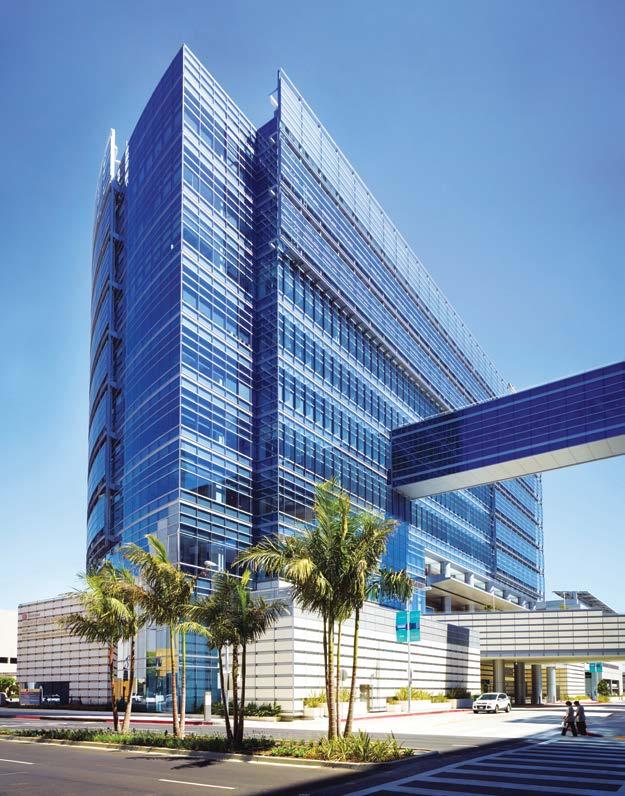

There has never been a better time to consider Cedars-Sinai for patients with complex medical conditions or simply those who seek the best in expert medicine. Cedars-Sinai was recognized as one of the best hospitals in the U.S. for the eighth year in a row in U.S. News & World Report’s “Best Hospitals 2023-24” Honor Roll.
Cedars-Sinai also ranked among the top five in six specialties (Cardiology, Heart & Vascular Surgery; Gastroenterology & GI Surgery; Orthopedics; Pulmonology & Lung Surgery; Neurology & Neurosurgery; and Urology). Eleven specialties ranked among the top in the U.S.
This stature is what draws patients from every part of the world to Cedars-Sinai.
“We are currently caring for patients from more than 100 countries in several soughtafter specialties like heart, cancer, neurology, orthopaedics, gastrointestinal diseases, transplantation and women’s health” said Heitham Hassoun, MD, Vice President and Medical Director of Cedars-Sinai International.
Cedars-Sinai International:
Personalized Care on a Global Scale
Geography should never be an obstacle to receiving world-class healthcare services. Cedars-Sinai International is continually making strides to reach more patients in more countries while also making it easier for them to seek care in Los Angeles, where it is based. Patients who come to Cedars-Sinai have access
PATIENTS WHO COME TO CEDARS-SINAI HAVE ACCESS TO THE LATEST EQUIPMENT, LEADING-EDGE RESEARCH, RENOWNED PHYSICIANS AND ADVANCED THERAPIES. BUT THESE ARE ONLY A FEW ASPECTS OF TOP-QUALITY CARE.
CEDARS-SINAI INTERNATIONAL STRONGLY BELIEVES THAT HEALTHCARE IS PERSONAL AND THAT CULTURAL TRADITIONS, APPROACHES AND BELIEFS ARE VITAL TO A PATIENT’S WELLBEING
to the latest equipment, leading-edge research, renowned physicians and advanced therapies. But these are only a few aspects of top-quality care. Cedars-Sinai International strongly believes that healthcare is personal and that cultural traditions, approaches and beliefs are vital to a patient’s wellbeing.
A dedicated Patient Services team helps international patients navigate their care journey with appropriate cultural and language support. A range of concierge services is especially designed for patients who are traveling to the Los Angeles campus from abroad. Streamlining international referrals and working with insurers worldwide are just two of the ways Patient Services can provide key healthcare support to patients from abroad. They also manage administrative details, such as scheduling appointments and record review, and they can advise on travel, accommodations and activities to enhance a patient’s stay.
Patients and their families also have access to Cedars-Sinai’s International Lounge, an exclusive space with multiple areas for relaxation, a shared office, a communications room, a pantry, a prayer/meditation room and private rooms where they can meet with their coordinator and enjoy the time in between appointments.
“Los Angeles is one of the most diverse, dynamic cities on Earth, which gives us a head start in delivering culturally appropriate care,” said Dr. Hassoun, adding that some
10 languages are spoken at Cedars-Sinai, including Arabic, Mandarin, Spanish, French and Cantonese. Other important touches, from specialized diets to access to appropriate clergy, help round out a personalized, dignified experience for the duration of the patient’s stay.
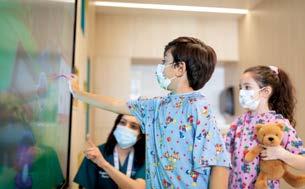

To bring top-flight care closer to more people, Cedars-Sinai International’s Global Services team continually explores opportunities for collaboration with hospitals outside of the U.S. Through a variety of collaborative strategies, Cedars-Sinai offers a full spectrum of advisory and consulting services that help prospective partners around the world achieve their goals as the global healthcare environment evolves. From Mexico to Asia to the Middle East, providers come together through webinars, conferences and trade shows to share knowledge, ideas and visions for the future. Additionally, our growing in-country office presence (currently in Mexico City, soon in Singapore and more countries) provides patients and referring physicians the
opportunity to learn more about Cedars-Sinai, gain access to our knowledge through second opinions and receive care in Los Angeles as the need arises.
Perhaps most importantly, strategic collaborations have been formed that already have led to new state-of-the-art facilities, such as The View Hospital in Qatar, an affiliation between Cedars-Sinai and Elegancia Healthcare, a subsidiary of Estithmar Holding. Not only is The View Hospital an extraordinary new offering for patients in the Gulf region and beyond, it also ushered in a new era of collaboration between Cedars-Sinai International and healthcare organizations in the Middle East. On the heels of The View Hospital’s grand opening in December, Cedars-Sinai had its largest-ever presence at Arab Health 2023.
“As we continue to grow around the world, reach the top of healthcare rankings and find new ways to reach more patients,” said Dr. Hassoun, “one thing remains steadfast— our commitment to providing the finest care available and exceeding our patients’ expectations no matter where they are.”

ONE THING REMAINS STEADFAST—OUR COMMITMENT TO PROVIDING THE FINEST CARE AVAILABLE AND EXCEEDING OUR PATIENTS’ EXPECTATIONS NO MATTER WHERE THEY ARE. DR. HEITHAM HASSOUN


For more than a decade, the Institute for Population Health (IPH) at Weill Connell Medicine-Qatar (WCM-Q) has committed to building research capacity and advancing evidence-based practice for healthcare practitioners in Qatar, the region, and beyond. The IPH does this by developing and implementing comprehensive and need-based training programs targeted towards healthcare professionals. One such program, titled, “Introduction to Systematic Review and Meta-analysis: Principles and Practice,” is designed to improve research skills by introducing participants to the process of conducting a rigorous systematic review and interpreting meta-analysis based on scientific principles, systematic methodology, and standardized guidelines.
Initiated in 2019, the workshop is aimed at physicians, nurses, dentists, pharmacists, allied
THE WORKSHOP ALLOWS PARTICIPANTS TO LEARN ABOUT SYSTEMATIC REVIEW/ META-ANALYSIS CONCEPTS AND METHODOLOGY THROUGH INTERACTIVE, HANDS-ON CASE STUDIES
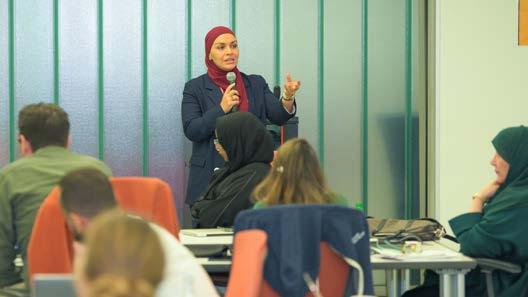
health practitioners, educators, researchers, and administrators. The overall learning objectives of the workshop enable participants to define and understand evidence-based medicine, systematic review, and meta-analysis; describe the steps required to conduct a systematic review; and how to interpret the findings of a meta-analysis. The workshop allows participants to learn about systematic review/meta-analysis concepts and methodology through interactive, hands-on case studies.
Dr. Sohaila Cheema, Associate Professor of Clinical Population Health Sciences and Assistant Dean for IPH, said: “Systematic reviews are considered the gold standard for assessing the quality of evidence and developing evidence-based guidelines and policies. They aim to identify, select, appraise, and synthesize in an unbiased manner all available secondary data to answer a
specific and well-formulated research question. This workshop equips healthcare professionals with the requisite skills and proficiency to conduct a systematic review and fosters the culture of evidence-based healthcare practice, ultimately leading to enhanced health outcomes for patients and improved population health.”
Over the past five years, in 10 offerings, nearly 300 healthcare professionals have completed this pioneering program. The workshop has consistently demonstrated effectiveness, with participants praising its remarkable value. Post-activity evaluations have affirmed that the workshop is a catalyst for professional development. It has boosted participants' confidence to conduct rigorous systematic reviews and effectively apply updated evidence across various domains in medical practice. The impact of this workshop, showcased by participants publishing systematic reviews, is testament to its contribution to a robust research ecosystem and improved healthcare outcomes.
The workshop is led by WCM-Q IPH faculty and staff, comprising Dr. Karima Chaabna,
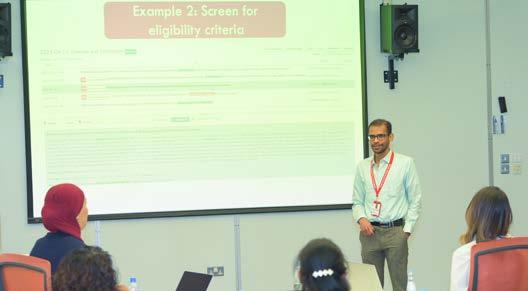
INTRODUCTION TO SYSTEMATIC REVIEW AND META-ANALYSIS: PRINCIPLES AND PRACTICE,” IS DESIGNED TO IMPROVE RESEARCH SKILLS BY INTRODUCING PARTICIPANTS TO THE PROCESS OF CONDUCTING A RIGOROUS SYSTEMATIC REVIEW AND INTERPRETING META-ANALYSIS BASED ON SCIENTIFIC PRINCIPLES, SYSTEMATIC METHODOLOGY, AND STANDARDIZED GUIDELINES.
Course Director, Assistant Professor of Clinical Population Health Sciences & Manager of Population Health Research; Dr. Amit Abraham, Course Director, Assistant Professor of Clinical Population Health Sciences & Projects Specialist; Ms. Anupama Jithesh, Projects Coordinator, and Dr. Sonia Chabaane, Projects Specialist.
Dr. Ravinder Mamtani, Vice-Dean for Population Health and Lifestyle Medicine, Professor of Population Health Sciences and Professor of Medicine, said: “Building research capacity is a critical component for the advancement of healthcare. This workshop aims to do that and advances evidence-based medicine among healthcare professionals. We at IPH remain committed to lifelong learning and building capacity among healthcare professionals on important population healthrelated topics.”
HTTPS://WWW.QATAR-MED.CORNELL.EDU/EVENT/SRW
Lisa
Larry
Medication errors occur at all stages of the medication management process, but approximately 34% of preventable medication errors occur during administration and most errors that occur during administration are not intercepted.1 The World Health Organization (WHO) has identified that a leading cause of preventable harm in healthcare systems is linked to unsafe medication practices and medication errors. The costs associated with medication errors have been estimated at approximately $42 billion annually, excluding lost wages, lost productivity, and indirect healthcare costs. The WHO identified that medication errors occur when prescribing, transcribing, dispensing, administration and monitoring practices are undertaken in weak medication systems and when human factors such as fatigue, poor working conditions, workflow interruptions are present.2
The position of the American Society of Hospital Pharmacists, the European Association of Hospital Pharmacists, and the Institute of Safe Medication Practices is very clear. Adoption of Barcode Medication Administration (BCMA) in all areas of health systems in which medications are used is recommended, particularly in areas with a likelihood of limited patient stay, such as the Emergency Department, perioperative areas, infusion and dialysis centers, and outpatient areas.3,4,5
A further recommendation is that compliance and metric data is routinely collected to evaluate the utilization and effectiveness of
BCMA, such as scanning compliance rates, and alert overrides.
Closed-loop IV-medication management systems have been identified as a vital component of systematic defenses to prevent intravenous IV-medication errors.6
Nurses are the primary users of BCMA and nursing involvement, along with nursing executive sponsorship of any new BCMA project across an organization is essential for successful implementation.3 IV-pump manufacturers should offer a clinical appraisal or ‘walkthrough’ service, where medication workflows are examined, and planning to prevent potential unwanted workarounds or likely deviations from correct procedures can be made. Workarounds, overrides, and ‘clinical variation’ are consistently noted in the literature as major causes of medication error even in advanced systems with multiple safeguards.7,8
Typical workarounds include affixing patient identification bands away from the patient and carrying pre-scanned medications on charts.8 Ensuring consistent patient-specific IV-medication availability from the compounding room to avoid the use of non-coded ‘shelf medications’, and ensuring that the medication carries the key information required for BCMA in the barcode is vital if workarounds are to be reduced:
Key Information for BCMA Medication labels and to be transmitted to the IVclosed loop safety checks via the barcode
• Patient ID
ADOPTION OF BARCODE MEDICATION ADMINISTRATION (BCMA) IN ALL AREAS OF HEALTH SYSTEMS IN WHICH MEDICATIONS ARE USED IS RECOMMENDED, PARTICULARLY IN AREAS WITH A LIKELIHOOD OF LIMITED PATIENT STAY, SUCH AS THE EMERGENCY DEPARTMENT, PERIOPERATIVE AREAS, INFUSION AND DIALYSIS CENTERS, AND OUTPATIENT AREAS.3,4,5
Gangol. RN, BSN. Beckton Dickinson. Senior Clinical Resource Consultant. Medication Management Solutions. Middle East, North Africa and Turkey. Lisa.Gangol@bd.com Neal. Regional Marketing Manager, Medication Management Solutions. Becton Dickinson. Europe, Middle East and Africa. Larry.Neal@bd.com. James Waterson. RN, M.Med.Ed. MHEc. Becton Dickinson. Medical Affairs Manager, Middle East & Africa. James. Waterson@bd.comIV-Medication BCMA Smart Pump Interoperability with the Electronic Medical Record of the patient can create Closed-Loop Medication Administration, and further opportunities for Connected Medication Management across the facility.
• Medication ID
• Order String Identifier
• Total Dose
• Total Volume
• Dose Units
A fully integrated prescription-compounding and administration system has been shown to substantially improve IV-medication safety and to reduce administration time.9 It has also been suggested that ‘guidance’ is not enough and forcing functions such as hard-stops have far more value in supporting safe medication prescription, preparation and administration.9
Understanding why BCMA is of such value in IV-medication safety is made easier once we look at the types of cognitive failures that most commonly lead to error:
• Lapses and slips, routine activities are accomplished quickly with minimal attention requirements.
• Performance based errors: alternative focus, interruptions, and lapses which contribute to errors of omission due to
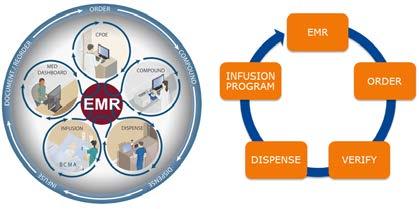
‘reduced intentionality’.
• Rule-based mistakes: an inadvisable rule is applied, developed from misunderstanding of a problem and the conditions that govern it.
There is always a ‘lag’ in obtaining the full benefit of medical technology after introduction to a facility,11 but this can be shortened for Electronic Medical Record based IV-medication interoperability projects by adherence to some fundamental rules which as BD clinicians we have observed during IV-medication interoperability installations in our region and in the United States:
A FULLY INTEGRATED PRESCRIPTIONCOMPOUNDING AND ADMINISTRATION SYSTEM HAS BEEN SHOWN TO SUBSTANTIALLY IMPROVE IVMEDICATION SAFETY AND TO REDUCE ADMINISTRATION TIME.9 IT HAS ALSO BEEN SUGGESTED THAT ‘GUIDANCE’ IS NOT ENOUGH AND FORCING FUNCTIONS SUCH AS HARD-STOPS HAVE FAR MORE VALUE IN SUPPORTING SAFE MEDICATION PRESCRIPTION, PREPARATION AND ADMINISTRATION.9
Fully integrated prescription-compounding and BCMA administration systems can substantially improve IV-medication safety and reduce administration time.
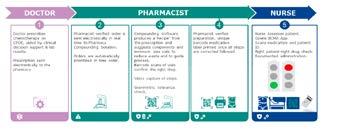
IV-Medication error is a complex phenomenon and IV-medication BCMA interoperability impacts the medication chain at multiple points as it closes the loop and links administration more directly to the prescription than any other current system.
Due to this complexity ‘simple numbers’ such as a 43.5%17 reduction in reported medication administration errors overall after the implementation of BCMA and need to be scrutinized carefully (though this is encouraging as well as the lack of patient harm events attributed to medication administration error following BCMA implementation17).
Studies that take a longer and more complex look at the medication safety landscape within an organization are of real value in ascertaining the real gains made.18 Using an interrupted time series analysis (ITSA) model Thompson et al. estimated that there were 30% fewer events post-BCMA introduction than there would have been without the intervention.17
In an Emergency Department study a 10.8%
reduction in medication error rates and 21% reduction in the average number of medications given in error per chart was observed.19 As noted in the introduction, BCMA may have added value in high-turnover care areas.3,4,5
One time-motion study looked at the effect of BCMA on nursing activities in critical care. Time spent on direct patient care activities increased with the use of BCMA technology, while time spent on administration activities decreased. Nurses were able to complete administration activities faster during the BCMA phase, which was attributed to ease of access to patient information and medication resources.20
In one study of a well-functioning medication chain the average time required to administer IV-oncology medications dropped from over 6 minutes to 41 seconds.9
Medication error reports giving an overview of events and displayed warnings and overrides derived from the BCMA system have been used to optimize multiple stages of the medication management process: revision of standard administration times, improved storage strategies for medications in nursing-unit cabinets, separation of look-alike-sound-alike medications, and resolution of formulation discrepancies in the IV-clean room. 21
Drilling down into this data allows for targeting of education for nursing units not utilizing BCMA properly, identification of order-entry discrepancies and bar code-label quality concerns.21
The BD Clinical App is available for iOS and Android devices.



The BD CatoTM ReadyMed BCMA System operates on handheld scanners and smartphones. Using smartphones for BCMA administration has other benefits: nurses can use other apps like the BD Clinical App for ‘how to’ assistance, including instructional videos for BD infusion pumps.
BCMA sits within a complex interaction of systems, humans, skills, and procedures. The standardization of workflows and reduction of clinical variability across all stages of medication management that it drives is recommended by the ‘Big Three’3,4,5. When coupled with optimal utilization, barcode medication administration has demonstrated successful reduction of preventable medication administration errors for hospitalized patients. 22
BCMA with its reduction in pump programming time, auto-documentation in the patients electronic medication administration record, and confirmation of medication ‘rights’ has been seen to increase nursing time for direct patient care, provided that prepared patient specific barcoded medications are readily available.
References:
IN ONE STUDY OF A WELL-FUNCTIONING MEDICATION CHAIN THE AVERAGE TIME REQUIRED TO ADMINISTER IV-ONCOLOGY MEDICATIONS DROPPED FROM OVER 6 MINUTES TO 41 SECONDS.9
1. Bates, D.W., Cullen, D.J., Laird, N., Petersen, L.A., Small, S.D., Servi, D., Laffel, G., Sweitzer, B.J., Shea, B.F., Hallisey, R., Vilet, M.V., Nemeskal, R., Leape, L.L., Bates, D., Hojnowski-Diaz, P., Perycki, S., Cotugno, M., Patterson, H., Hickey, M. Edmondon, A. Incidence of Adverse Drug Events and Potential Adverse Drug Events: Implications for Prevention. Journal of the American Medical Association, 1995, 274(1), 29-34. DOI: 10.1001/jama.1995.03530010043033
2. World Health Organization (WHO). 10 Facts about Patient Safety. World Health Organization. (9 March 2019). https://www.who.int/news-room/facts-in-pictures/detail/patient-safety
3. Dabestani, A.T. & Perry, A.B. ASHP Statement on Bar-Code-Enabled Medication Administration Technology. American Journal of Health-System Pharmacists, 2009, 66, 588-590. DOI: 10.2146/ ajhp080414
4. Batista, A., Polidori, P., & Kohl, S. Position paper on patient safety. European Journal of Hospital Pharmacists, 2021, 28, 129-132. DOI: 10.1136/ejhpharm-2019-001924
5. Institute of Safe Medication Practices (ISMP). (2022). ISMP Targeted Medication Safety Best Practices for Hospitals. ISMP. https://www.ismp.org/guidelines/best-practices-hospitals
6. Kuitunen, S.K., Niittynen, I., Airaksinen, M., & Holmstrom, A. Systemic Defenses to Prevent Intravenous Medication Errors in Hospitals: A Systematic Review. Journal of Patient Safety, 2021, 17(8), e1669-e1680. www.journalpatientsafety.com
7. Gann, M. How informatics nurses use bar code technology to reduce medication errors. Nursing 2015, 60-66. DOI: 10.1097/01.NURSE.0000458923.18468.37
8. Stolic, S., Ng, L., & Sheridan, G. Electronic medication administration records and nursing administration of medications: An integrative review. 2022. Collegian, 1-27.
9. Meren ÜH, Waterson J. Evaluating An Automated Compounding Workflow Software for Safety and Efficiency: Implementation Study. JMIR Hum Factors. 2021 Nov 2;8(4):e29180.
10. Mattox, E.A. Strategies for Improving Patient Safety: Linking Task Type to Error Type. Critical Care Nurse, 2012. 32(1), 52-60. DOI: 10.4037/ccn2012303
11. Tarricone R, Callea G, Ogorevc M, Prevolnik Rupel V. Improving the Methods for the Economic Evaluation of Medical Devices. Health Econ. 2017 Feb;26 Suppl 1:70-92.
12. Wiegmann DA, Wood LJ, Cohen TN, Shappell SA. Understanding the "Swiss Cheese Model" and Its Application to Patient Safety. J Patient Saf. 2022 Mar 1;18(2):119-123.
13. Darawad, M.W., Othman, E.H., & Alosta, M.R. Nurses' satisfaction with barcode medication-administration technology: Results of a cross-sectional study. Nursing & Health Sciences, 2019, 21, 461-469. DOI: 10.1111/nhs.12620
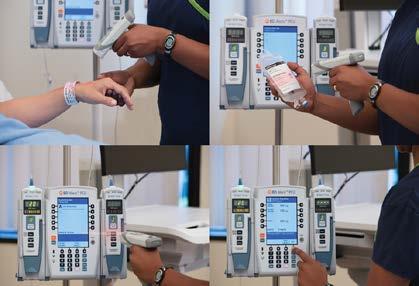
14. Al-Jaber R, Samuda N, Chaker A, Waterson J. Critical Care Nurses' Knowledge of Correct Line Types for Administration of Common Intravenous Medications: Assessment and Intervention Study. JMIR Form Res. 2022 Apr 26;6(4):e36710.
15. Foo, G.T., Tan, C.H., Hing, W.C., & Wu, T.S. Identifying and quantifying weaknesses in the Closed Loop Medication Management System in reducing medication errors using a direct observational approach at an academic medical centre. Journal of Pharmacy Practice and Research, 2017, 47, 212-220.
16. Waterson J, Al-Jaber R, Kassab T, Al-Jazairi AS. Twelve-Month Review of Infusion Pump Near-Miss Medication and Dose Selection Errors and User-Initiated "Good Save" Corrections: Retrospective Study. JMIR Hum Factors. 2020 Aug 11;7(3):e20364.
17. Thompson, K.M., Swanson, K.M., Cox, D.L., Krichner, R.B., Russell, J.J., Wermers, R.A., Storlie, C.B., Johnson, M.G., & Naessesn, J.M. Implementation of Bar-Code Medication Administration to Reduce Patient Harm. Mayo Clinic Proceedings: Innovations, Quality, & Outcomes, 2018, 2(4), 342-351.
18. Schaffer AL, Dobbins TA, Pearson SA. Interrupted time series analysis using autoregressive integrated moving average (ARIMA) models: a guide for evaluating large-scale health interventions. BMC Med Res Methodol. 2021 Mar 22;21(1):58.
19. Gauthier-Wetzel, H.E. Barcode Medication Administration Software Technology Use in the Emergency Department and Medication Error Rates. CIN: Computers, Informatics, Nursing, 2022, 40(6), 382-388.
20. Dwibedi, N., Sansgiry, S.S., Frost, C.P., Dasgupta, A., Jacob, S.M. Tipton, J.A. & Shippy, A.A. Effect of bar-code-assisted medication administration on nurses’ activities in an intensive care unit: A time-motion study. American Journal of Health-System Pharmacists, 2011, 68, 1026-1031. DOI: 10.2146/ajhp100382
21. Paoletti, R.D., Suess, T.M., Lesko, M.G., Feroli, A.A., Kennel, J.A., Mahler, J.M., & Sauders, T. Using bar-code technology and medication observation methodology for safer medication administration. American Journal of Health System Pharmacists. 2007, 64, 536-543.
22. Skog J, Rafie S, Schnock KO, Yoon C, Lipsitz S, Lew P. The Impact of Smart Pump Interoperability on Errors in Intravenous Infusion Administrations: A Multihospital Before and After Study. J Patient Saf. 2022 Apr 1;18(3):e666-e671.
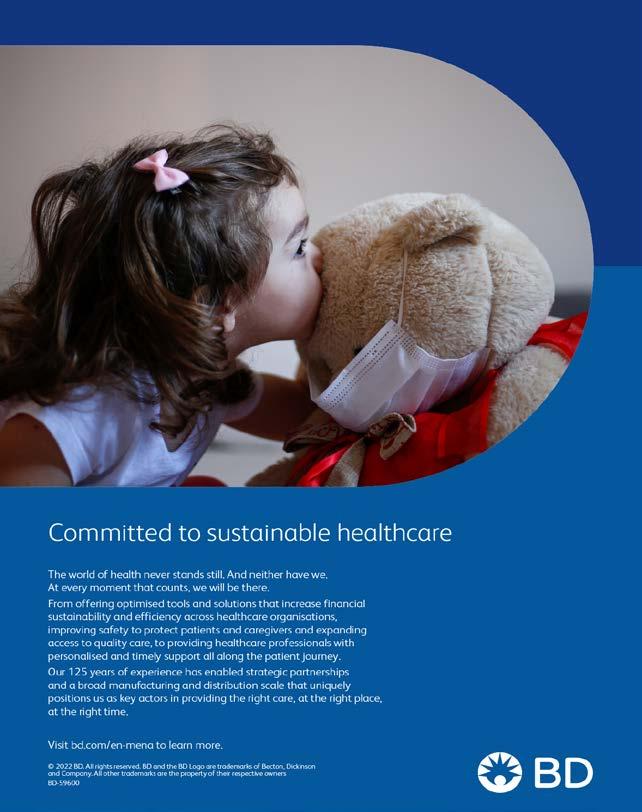

The number of survivors of breast cancer has increased in recent years. The reason for this is the increase in people opting for early detection procedures, which have contributed to the discovery of many cancers in their initial stages. This makes the treatment more effective when cancer treatments in general, and breast cancer in particular, are witnessing qualitative leaps and significant progress, leading to an increase in average age and a considerable improvement in survival rates.
However, this does not negate that breast cancer remains the most lethal for women. Therefore, raising awareness in communities is one of the main strategies adopted by the World Health Organization, as this step is the way to prevention, early detection, and subsequently allowing the patient to get the appropriate diagnosis and treatment.
Breast cancer occurs when its tissues multiply uncontrollably and grow beyond control. It spreads when cancerous cells enter the bloodstream or lymphatic system and then move to other body parts. Most breast tumors are benign and not cancerous.
Breast cancer differs from other cancers in that it shows some signs that can be detected early, such as self-examination of the breast or mammography and ultrasound imaging. This emphasizes the importance of early screening to see these cases. In other cases, where these signs are not visible, the disease can be detected early through regular check-ups, making treatment more accessible.
Some factors increase the likelihood of developing breast cancer, such as smoking, late pregnancy, exposure to high radiation levels, and others. Obesity also increases the risk of breast cancer in women after menopause. Conversely, physical activity is associated with reduced risk.
The genetic factor, with the gene mutation responsible for breast cancer (BRCA1 - BRCA2), is one of the disease's most critical and widespread causes. Studies have shown that genetic
predisposition signals the risk of many women from the same family, close relatives of the first or second degree, getting breast and/or ovarian cancer. Suspicion increases when these diseases develop early.
However, it is difficult to prevent most breast cancers. Therefore, doctors emphasize the importance of regular follow-up and early detection screenings.
Dense breast tissue is among the factors that increase the likelihood of developing breast cancer. Women with high breast density are 4-5 times more likely to develop breast cancer than women with low breast density. Breast density is determined through mammography, not by palpation (touch).

There are several different types of breast cancer, which are determined based on the type of cells affected in the breast. Generally, they are not life-threatening; however, a healthcare professional should examine any lump or change in the breast to determine if it is benign or malignant and if it might affect the risk of developing cancer in the future.
Breast cancers develop from cells in the mammary gland. Most often, the affected cells belong to the milk ducts that gather milk or to the lobules where milk is produced. There are also ductal carcinomas and lobular carcinomas.
Other types of breast cancer, such as medullary, papillary, or even tubular cancers, are rare.
The cancer is localized if cancerous cells remain confined to the milk duct or lobule. However, when cancerous cells invade surrounding tissues, the cancer becomes invasive or aggressive and can spread outside the breast if not diagnosed early.
Determining treatment varies based on several factors, including the type, size, and location of the tumor in the breast, the characteristics of the cancer cells, the condition of the lymph nodes, and whether it has spread outside the breast, among others.
Thus, treatments can range from chemotherapy, and radiation therapy, to surgical treat-
ment. Depending on what's best for each case, one or more of these methods may be used.
There are several types of chemotherapy, and its side effects can range from lethargy, nausea, loss of appetite, heat in the hands and feet, and common issues such as hair loss and other symptoms.
As for the excision, not all cases are treated the same, as the excision varies with the factors of the disease.
Some patients require only the tumor to be removed, or only the gland to be removed while preserving the skin and nipple, or removing the gland and the nipple while protecting the skin. The last type is complete removal, which doesn't mean preceding chemotherapy.
It's important to emphasize that early detection and diagnosis of the disease are among the most influential factors in treatment success.
For survivors and those affected... How can you reduce the progression of breast cancer?
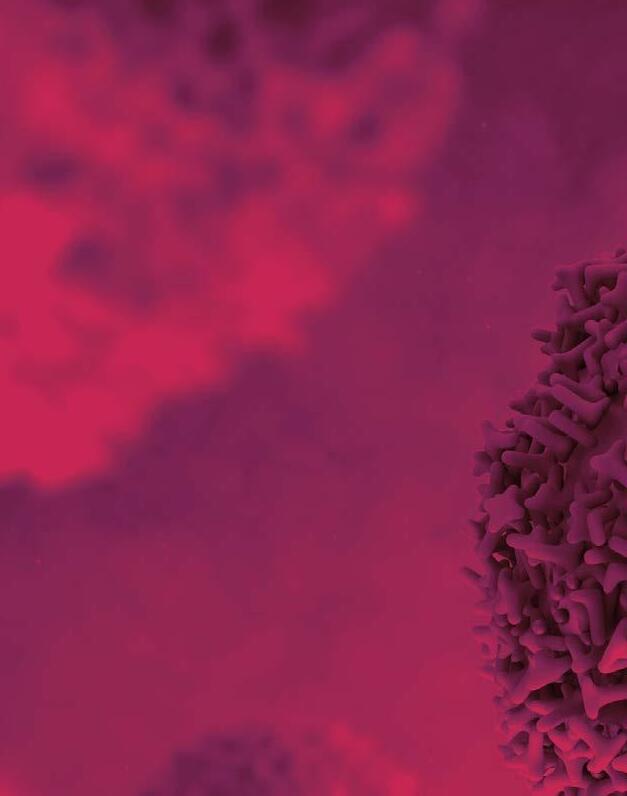
For survivors of breast cancer and those currently diagnosed with it receiving the necessary treatment, adopting a healthy lifestyle in terms of diet and physical activity reduces the likelihood of cancer progression and the occurrence of relapse after recovery, according to studies.
Good nutrition is considered a supportive element in recovering from breast cancer. Patients, during treatment, need to follow a healthy diet to help the body fight the malignant tumor and alleviate the side effects of chemotherapy or radiation therapy.
A healthy diet for a breast cancer patient has a significant impact. Most research on the potential link between diet and the risk of recurrent breast cancer has focused on broad dietary habits rather than specific foods.
Some nutrients such as fiber, soy products (protein), and healthy fats should be added to the diet to combat breast cancer.
There's no specific food to avoid getting breast cancer or experiencing a new relapse. Still, it's possible to prevent cancer by:
• Consuming more vegetables, fruits, and
whole grains.
• Reducing fat intake to less than 30% of total calories.
• Avoiding smoked foods.
• Losing excess weight and achieving a healthy weight.
Foods to avoid when diagnosed with breast cancer include spicy and acidic meals. One should also avoid raw or undercooked foods as they increase the risk of infection, avoid processed and refined carbohydrates, and reduce sugar consumption.
Regarding physical activity for a breast cancer patient, research has shown that weight gain or obesity increases the risk of recurrent breast cancer. A relationship exists between maintaining a healthy body mass index before and after the diagnosis and surviving breast cancer. Therefore, abstaining from smoking, exercising, maintaining a healthy weight, and consuming healthy foods are essential steps for women to follow to keep the cancer threat at bay.
One of the correct first steps in the exhausting treatment journey.
Breast cancer makes a woman live in a terrible psychological state. The reason is the symbolism of the breast and its importance to her femininity and body image. This makes her feel a disturbance in her psychological balance, aside from the nature of cancer and its troubles.
The patient experiences an inner psychological conflict. The first stage is denying reality and not accepting the idea that she has breast cancer. Bouts of anger overtake her, and fear about what awaits her leads her into a spiral of deep sadness and tension that might end in depression. Eventually, she comes to terms with reality.
A patient with breast cancer feels profound emotional distress, one of the most common mental health problems among breast cancer patients. They suffer from significant emotional disturbance that affects their daily life activities. Depression is one of the main psychological conditions that can affect the patient, where she is dominated by negative thoughts, despair
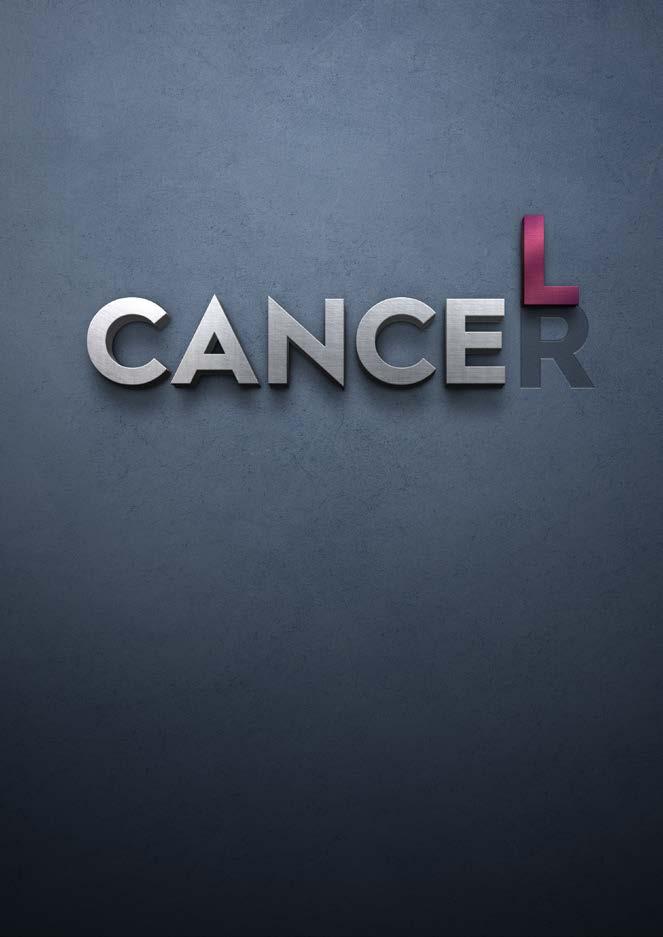




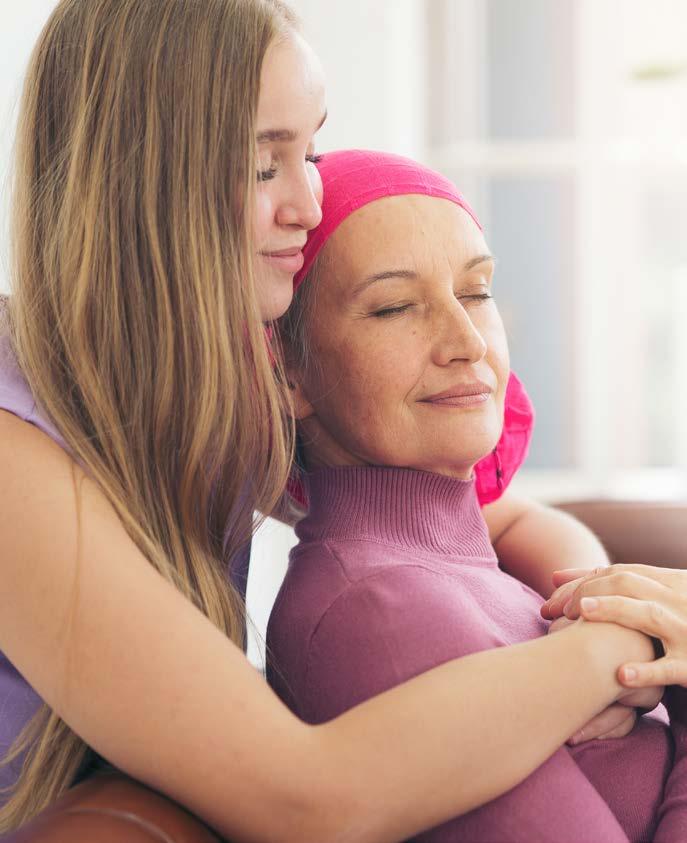
about the future, feeling worthless, decreased concentration, and avoidance of communicating with others.
Some patients might have post-traumatic stress disorder (PTSD). This condition affects individuals who have experienced a traumatic event that exposed them to physical harm or a significant psychological threat. This includes cancer patients who also deal with issues related to their safety and mortality.
Symptoms include:
• Reliving the moment.
• Intense painful memories of the diagnosis and treatment stages.
• Avoiding places or people that remind the patient of the traumatic diagnosis experience.
In general, a breast cancer patient might suffer from decreased performance and activity, poor concentration, memory loss, changes in sexual life, and the like, depending on the treatment stage. Consequently, some breast cancer patients may lose confidence and have emotional instability.
Caring for the psychological aspect of a cancer patient, in general, is one of the most essential treatment steps. Psychological therapy helps treat breast cancer, given the close relationship between mental state and the human immune system.

Family support can also improve the overall outcome. Therefore, addressing concerns about the patient's mental state is essential. Generally speaking, discussing with someone they love or trust benefits many cancer patients. It's also useful for the family and friends to understand more about the patient's condition and their role in supporting her.
The hospital should provide a specialized consultant to speak with the patient if this isn't available for complicated cases or those in their final stages, where anxiety and depression increase; the family should seek an evaluation and treatment if necessary, providing care with love and generosity and coordinating each
family member's role and when they will provide assistance.
In general, there is a link between a person's immune system and their mental state. If the patient is highly anxious and depressed, their immune system might be negatively affected and thus become less effective in responding positively to treatment and vice versa. This can also negatively affect the patient's motivation to get appropriate help.
Therefore, families and friends should understand the level of support they need to provide and seek a specialist's assessment if they suspect the patient is depressed.
Research and studies have shown that breast cancer patients who receive support from their families are less stressed and deliver better results in treatment. This support can increase the patient's adaptation to her health condition and boost positive behavior.
Perhaps what emotionally hurts the patient most is her feeling that those around her pity her. Instead, one should treat her usually and provide support to continue the treatment, which is the best solution.
Primarily, the family, friends, and partner should help a breast cancer patient continue her life as normally as possible and avoid giving her any sense that she is sick and should stay in bed or at home.
It is also essential to instill positive energy in the breast cancer patient by talking about survivors who overcame the disease. It's best to involve former patients to benefit from their experience, giving the patient positive energy and hope to continue the treatment journey and fight cancer.
The breast cancer patient should be encouraged to raise her children and assist them with their studies in the same manner she was accustomed to, as much as possible.
The supporting environment around the patient should create a recreational atmosphere by going for walks, having specified meals outside, and encouraging her to sit with her beloved friends or travel whenever possible.
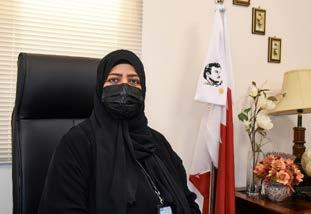
Although breast cancer is severe, it is treatable and can be quickly bridged to remission when diagnosed early. Women aged 45–69 should begin national mammography screening as MOPH guidelines recommend. In addition, women should practice being breast-aware to help spot any signs and symptoms of breast cancer since different people have different symptoms. Some people do not have any signs or symptoms at all.
Some warning signs of breast cancer are:
• New lump in the breast or underarm (armpit).
• Thickening or swelling of part of the breast.
• Irritation or dimpling of breast skin.
• Redness or flaky skin in the nipple area or the breast.
Breast cancer is the most common cancer in Qatar and worldwide, accounting for about 30 percent of all new cancer cases in women annually. About one in eight women develop invasive breast cancer during their lifetime. However, the breast cancer survival rate reaches 98 percent when caught early. Breast cancer can affect anyone, so it is essential to be "breast aware" and constantly be reminded that "Early Detection Saves Lives." Knowing the modified breast cancer risk factors is very important to decrease the risk of having breast cancer.
The increase in the incidence of breast cancer has been linked to modern lifestyle factors such as inactivity, substance abuse (especially alcohol and tobacco), high levels of stress, and prolonged exposure to estrogen (from birth control or a lack thereof). About 5% to 10% of breast cancers can be linked to known gene mutations inherited from one's mother or father. Mutations in the BRCA1 and BRCA2 genes are the most common.
BREAST CANCER CAN HAPPEN IN YOUNG WOMEN AND TENDS TO BE QUITE AGGRESSIVE, SO RAISING AWARENESS AND EDUCATING PEOPLE AS EARLY AS POSSIBLE IS VITAL. AS A RESULT OF SCIENTIFIC AND MEDICAL PROGRESS, PATIENTS NOW HAVE ACCESS TO A WIDE RANGE OF BREAST CANCER TREATMENT OPTIONS AVAILABLE AT HMC.
• Pulling in of the nipple or pain in the nipple area.
• Nipple discharge other than breast milk, including blood.
• Any change in the size or the shape of the breast.
• Pain in any area of the breast.
Remember that these symptoms can happen with other conditions that are not cancer.
Breast cancer can happen in young women and tends to be quite aggressive, so raising awareness and educating people as early as possible is vital. As a result of scientific and medical progress, patients now have access to a wide range of breast cancer treatment options available at HMC.
Breast cancer is among the first medical specialties to apply precision medicine. Several genetic and non-genetic tests for breast cancer are available to help personalize therapy.
The high-risk clinic was established officially in March 2013 to manage all affected and unaffected high-risk patients and their families at increased risk for carrying a hereditary predisposition for breast and ovarian cancers. In addition, a triple assessment clinic was established, where patients are seen within 48 hours of referral to a tertiary hospital.
All breast cancer cases at HMC are discussed by a multidisciplinary team, with various specialists regularly working together and meeting to discuss cases. This ensures breast cancer cases receive whole-person care, carefully weighing all treatment options to create a personalized care plan and offering a full range of treatment options, including surgery, chemotherapy, hormone therapy, radiation therapy, targeted drug therapy, and clinical trials.
Reducing the risk of heart damage in left-sided breast cancer using innovative radiation therapy techniques to shape the energy beams around the tumor, limiting lymph node removal to reduce the risk of surgery-related lymphedema using sentinel lymph node biopsy and neoadjuvant therapy.
Our oncoplastic surgeons use innovative techniques that optimize the appearance of reconstructed breasts while maintaining excellent cancer control (oncoplastic surgery), such as combining lumpectomy with a breast lift or reduction. Coordinating supportive and palliative services. During and after treatment, the patient is connected to clinical nurse specialists who can
REDUCING THE RISK OF HEART DAMAGE IN LEFT-SIDED BREAST CANCER USING INNOVATIVE RADIATION THERAPY TECHNIQUES TO SHAPE THE ENERGY BEAMS AROUND THE TUMOR, LIMITING LYMPH NODE REMOVAL TO REDUCE THE RISK OF SURGERY-RELATED LYMPHEDEMA USING SENTINEL LYMPH NODE BIOPSY AND NEOADJUVANT THERAPY.
help the patient during the cancer journey.

Tailoring treatment based on genetics, our medical oncologist uses personalized medicine for breast cancer to choose treatments based on the patient's genetic makeup or the genetics of cancer cells. For example, testing hormone receptors before starting hormone therapy and analyzing tumor cells to select targeted drug treatments such as PDL1, PIK3, HER 2, etc. HMC establishes Breast Cancer survivors' clinics, a team connecting you with support groups who can answer questions and provide support.
In addition, The National Center for Cancer Care and Research (NCCCR) created specialized clinics such as a cardio-oncology clinic, pain management, dietetics, and pharmacy.
At HMC, we aim to improve the ability to control cancer while reducing the impact of treatment on patients' daily lives and increasing patient satisfaction.
To sum up, HMC stands out in breast cancer care through its patient-centered approach, comprehensive services, focus on education, community engagement, and commitment to research and innovation. By addressing patients' and survivors' physical, emotional, and informational needs, HMC offers a holistic and supportive environment for those affected by breast cancer.
Simple and brilliant. That was the idea of the young engineers at LINET, who changed the world of hospital beds and thus nursing. The lateral tilt, first used in the ICU environment, quickly found its way into everyday nursing routines. Details and interesting facts were provided by Jitka Stranska, Managing Director of LINET Middle East and Africa.
Quite fundamentally. Today's hospital beds are a functional system that allows patients to recover safely and comfortably. It is an ergonomic and intuitive aid for nursing staff. Advancing digitalisation is also penetrating the hospital room, the scenery is changing, the technology is evolving, but the nurse-patient interaction remains. Here, the lateral tilt plays a key role in basal patient care, which it revolutionizes, while providing additional benefits for the entire hospital room environments.
The design mechanism not only moves the bed surface up and down, but tilts the bed sideways. This controlled movement rotates the bed frame surface and allows the patient to rotate with it, literally turning them from the supine to the lateral position. It seems so simple as to be ingenious. Empirical measurement confirmed that the lateral tilt reduces the effort required when turning the patient by 67%. Less demanding patient positioning can be used in daily nursing activities, such as positioning patients with pressure injuries, hygiene, skincare, making the bed, or nursing.
Using beds with lateral tilt looks easy, but the condition of patients is
OUR GOAL IS TO EDUCATE THE TREATMENT TEAMS. WE REALIZE THAT TODAY'S NURSES ARE LITERALLY INUNDATED WITH TECHNOLOGY AND DEVICES AND IT IS NOT EASY TO USE ALL THE POTENTIAL AVAILABLE IN THIS ENVIRONMENT. THEREFORE, WE STRIVE TO OFFER COMPREHENSIVE TRAINING FOCUSED ON THE PRINCIPLES OF MOVING AND HANDLING, I.E. PERFORMING ACTIVITIES CORRECTLY AND EXPERIENCING THESE HABITS IN DAILY ROUTINES.
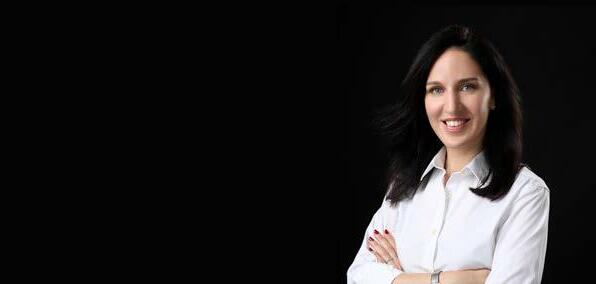
highly individual. Can lateral tilt be used for everyone?
Nursing procedures are standardized, but of course always depend on the individual condition and situation. Our goal is to educate the treatment teams. We realize that today's nurses are literally inundated with technology and devices and it is not easy to use all the potential available in this environment. Therefore, we strive to offer comprehensive training focused on the principles of moving and handling, i.e. performing activities correctly and experiencing these habits in daily routines. In a simple way, during our workshops, you will learn useful rules for higher ergonomics at work, which quite fundamentally reduce the effort and physical effort and are an effective prevention against back pain and injuries. We work with specific tasks of the daily nursing routine and everything is based on interactivity and rehearsal of specific situations.
You mentioned that lateral tilt can be used throughout the hospital stay. Are there other examples of usage?
So far, we have talked about routine hospitalizations on standard wards. Lateral tilt is used in the ICU setting as well. Programmed cycles, so-called automatic lateral therapies, allow continous support during mechanical pulmonary ventilation. So-called microshifting offers cycles of slight lateral rotations to support the effort
Lateral tilt makes a difference
Jitka Stranska about the most distinguished feature of the LINET brand
to train the patient’s body to tolerate side-toside movement. This is related to the degree of mobility of the patient. For the mobilization process, which is the goal of recovery, we recommend the AACN (American Association of Critical-Care Nurses) procedure involving lateral tilt in all 4 staging positions.
What is behind this mobilization procedure and its stages?
Immobilization is a common problem for many patients, especially in the intensive care unit. Therefore, we came up with the idea of early mobilization using LINET features, which is based on the concept of early mobilization introduced by the American Association of
PROGRAMMED CYCLES, SO-CALLED AUTOMATIC LATERAL THERAPIES, ALLOW CONTINOUS SUPPORT DURING MECHANICAL PULMONARY VENTILATION.
Critical Care Nurses. Our new Early Mobilization with LINET program takes ACCNA's recommended practices and expands on them with unique LINET features such as automatic lateral therapy (ALT), microshifting and Mobi-Lift® .
All of these components support ICU activities and can enhance the safety of the entire early mobilization program in the ICU. Also, Early Mobilization with LINET is part of our training program that we provide to customers and those interested in new nursing practices. LINET Group is not only working on product development so that we can bring innovations that help nurses. But we're also refining our education system to turn technological advances into everyday practice.
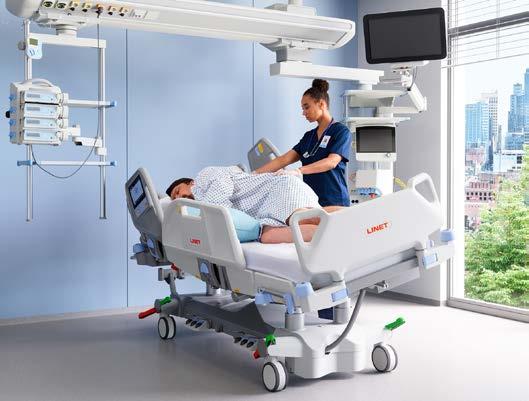

"The forum will host various discussions focusing on leading Arab hospitals towards transformation, sustainability, digital health, innovation, and more..."
Leading Tomorrow’s Healthcare: Sustainability. Transformation. Collaboration, is the theme of the 24th Arab Hospitals Federation Annual Forum, which is taking place in Abu Dhabi, United Arab Emirates, on September 25-26, 2023. The forum is attended by an impressive array of Arab health ministers and Arab healthcare leaders. In this regard, "Hospitals" magazine interviewed Ms. Alice Yammine Boueiz, to talk about this important gathering.
Can you give us an overview of the 24th Arab Hospitals Federation Annual Forum MedHealth Abu Dhabi?
The Arab Hospitals Federation holds its 24th Arab Annual Forum MedHealth Abu Dhabi on September 25-26, 2023, at the Conrad Abu Dhabi - Etihad Towers in the United Arab Emirates in strategic partnership with the Department of Health Abu Dhabi, and in cooperation with the League of Arab States, the Arab Health Ministries, the WHO Regional Office for the Eastern Mediterranean, the Executive Office of the Arab Health Ministers Council, the Department of Culture and Tourism Abu Dhabi, Abu Dhabi Convention and Exhibition Bureau, Abu Dhabi Residents Office, AmCham Abu Dhabi, as well as various healthcare, medical, and nursing organizations and associations across Arab countries.
MedHealth Abu Dhabi receives vital support from key partners, including Q Holding Group as the main partner, Hamad Medical Corporation in Qatar and Viatris as associate partners. Additionally, it benefits from contributions by renowned entities such as Johnson & Johnson, GE Healthcare, HEAPS, Sheikh Shakhbout Medical City, NMC, Malaffi, Elegancia
Healthcare-Qatar, and Abbott Laboratories with the Arab Hospital Magazine and Hospitals Magazine as Business Community Partners.
What makes this forum very distinguished on the Arab healthcare landscape?
One of the forum’s unique features is the participation of six Arab health ministers representing the UAE, Egypt, Lebanon, Bahrain, Jordan, and Kuwait.
These ministers will actively engage in the first, second, and third panel discussions, where they will present their ideas, discussions, and experiences on various topics centered around the concept of Health for All.
Furthermore, the forum provides a platform for dialogue and interaction among all components of the Arab healthcare community, encouraging the exchange of experiences, information, and the discussion of challenges and how to address them. That is what this platform has witnessed over the past twentythree editions, and we continue to pursue a reputable and more credible journey with a high level of professionalism to advance health in the Arab world.
ONE OF THE FORUM’S UNIQUE FEATURES IS THE PARTICIPATION OF SIX ARAB HEALTH MINISTERS REPRESENTING THE UAE, EGYPT, LEBANON, BAHRAIN, JORDAN, AND KUWAIT.
What are the discussions that will take place at the forum and who will be discussing them?
Under the theme of "Leading Tomorrow's Healthcare: Sustainability. Transformation. Collaboration”, the forum will host various discussions focusing on leading Arab hospitals towards transformation, sustainability, digital health, innovation, and more. The discussions over the two days will be content-rich, featuring insights from decision-makers and leaders in the Arab healthcare sector. They will involve esteemed health ministers as well as brilliant global and Arab experts whose ideas, knowledge, and experiences will benefit the Arab healthcare sector and assist in leading Arab institutions towards change.
What about the opening ceremony and what does it include?
The opening ceremony will be attended by health ministers, heads of Arab health authorities, government officials, the League of Arab States, and key decision-makers in the healthcare sector from major institutions and global companies. It will include a video presentation showcasing the journey of the Arab Hospitals Federation, official speeches, the presentation of the federation's annual awards, and the inauguration of the accompanying exhibition.
As you mentioned, and as we know, the Arab Hospitals Federation presents its annual awards. Who will receive them this year, and who are the healthcare personalities chosen?
Indeed, this is a special event that the Federation organizes each year to honor influential individuals and exceptional entities that have made significant efforts in advancing the Arab healthcare sector. I prefer to withhold the announcement of the names until the day of the event, but I can say that the awards include:
• The Diamond Crown Award for Sustainable Health System.
• Pioneer Award in improving Arab Health Investment
• Excellence Award in Patient Safety and Quality Performance
• Excellence Award in Supporting the Health Tourism Sector
• Distinguished Award in Sustainable Development
• Distinguished Gold Award for Health Readiness During the 2022 World Cup
• Diamond Crown in Healthcare Leadership
• Excellence Award in Healthcare Leadership Empowerment Across Arab Countries
• Highest Merit Medal in Arab Healthcare sector
Through the forum banners, there is a large group of partners and supporters for this event. Why were they interested in it?
This event has captured the interest of numerous partners from various sectors, including official, healthcare, pharmaceutical, media, and more. They have been interested in this event over the past years because it provides them with an opportunity to connect with decision-makers and stakeholders in the Arab healthcare sector. It allows for direct and open dialogue, especially considering that the forum hosts Arab delegations representing government and private hospital directors, doctors, administrators, and healthcare professionals from various countries. These countries include not only Arab nations such as Saudi Arabia, the United Arab Emirates, Qatar, Kuwait, Bahrain, Egypt, Lebanon, Jordan, but also international participants from the United States, the United Kingdom, France, Germany, Belgium, India, and others.
You have organized this forum in different Arab countries, and today in Abu Dhabi. What have you found in Abu Dhabi, and why was it chosen as your destination?
The Arab Hospitals Federation chose Abu Dhabi as the destination for its annual forum to fulfil its primary goal of opening dialogue and bringing together decision-makers in the healthcare sector to share successful experiences with all Arab countries and explore promising opportunities for advancing healthcare. The healthcare sector in Abu Dhabi
THE OPENING CEREMONY WILL BE ATTENDED BY HEALTH MINISTERS, HEADS OF ARAB HEALTH AUTHORITIES, GOVERNMENT OFFICIALS, THE LEAGUE OF ARAB STATES, & KEY DECISION-MAKERS IN THE HEALTHCARE SECTOR FROM MAJOR INSTITUTIONS & GLOBAL COMPANIES.
stands out as a leading sector in the Arab world, regionally and globally, known for its accessibility to medical services, quality and safety of care, financial and environmental sustainability of the healthcare system, and adoption of technology and innovations in healthcare. This is what truly motivated us to be there. Additionally, we received support from the Department of Culture and Tourism Abu Dhabi, that encouraged and collaborated with us, supporting us in organizing our events in Abu Dhabi. Here I would like to extend special thanks to them for their responsiveness and for all what they have done to ensure the success of this event.
Certainly, one of the primary goals of the Arab Hospitals Federation is to strengthen partnerships with all relevant stakeholders. During this conference, we will sign several agreements. However, I would like to highlight the partnership that was signed in Abu Dhabi on September 11 with Q Holding Group, the main partner of the forum.
In a new step that reinforces the leading role of Q Holding Group, in paving the way towards sustainability and its constructive role in creating smart, green and sustainable communities that overcome the world's biggest future challenge, climate change, the Federation signed a partnership agreement with the Group, striving to promote a culture of sustainability by advocating for green and sustainable facilities to safeguard human health.
This partnership aims to create a culture of sustainability and lead the transformation and change towards an environmentally sustainable healthcare system that improves and preserves the health of the community, in the presence of H.E. Sheikh Abdulla Mohamed Butti Al Hamed, Chairman of Q Holding Group. We emphasized the spirit of true cooperation and shared responsibility to preserve the health of our communities and our environment and to address the greatest challenge we face, which is climate change.
Furthermore, during the forum, we will sign a cooperation agreement with Abu Dhabi
Residents Office, which is part of the Abu Dhabi Department of Economic Development. This agreement aims to support the thriving community in the Emirate of Abu Dhabi, enhance its status as a leading destination for top talent, and promote joint efforts to attract healthcare talents and encourage them to obtain the golden visa in the Emirate. This is a step that underscores our commitment to empowering Arab and international healthcare talents to achieve their aspirations to live and reside in Abu Dhabi on the long term, in addition to promoting medical tourism in the Emirate as a hub for healthcare services.
Additionally, we have a partnership with HIMSS (Healthcare Information and Management Systems Society), which aims to promote the use of technology in healthcare to improve the quality and efficiency of the Arab healthcare system.
Our activities at the Federation are numerous and diverse, and at the moment, we are focused on two important topics: digital health and healthcare sustainability. In September, the Federation will participate in Arab Health Day organized by the League of Arab States at its headquarters in Cairo under the theme "The Impact of Climate Change on Health." I am honored to have been invited by the General Secretariat the League of Arab States to chair the second working session having the title of "The Healthcare Sector in the Face of Climate Change: Building Sustainability and Resilience." The event will feature the participation of prominent figures, including His Excellency Ahmed Aboul Gheit, the SecretaryGeneral of the League of Arab States, His Excellency Professor Khaled Abdel Ghaffar, the Minister of Health and Population in the Arab Republic of Egypt and the Chairman of the Executive Office of the Arab Health Ministers Council, His Excellency Professor Abdelhak Saihi, the Minister of Health, Population and Hospital Reform in Algeria, His Excellency Dr. Ahmed Al-Mandhari, the Regional Director of the WHO
THIS PARTNERSHIP AIMS TO CREATE A CULTURE OF SUSTAINABILITY AND LEAD THE TRANSFORMATION AND CHANGE TOWARDS AN ENVIRONMENTALLY SUSTAINABLE HEALTHCARE SYSTEM THAT IMPROVES AND PRESERVES THE HEALTH OF THE COMMUNITY, IN THE PRESENCE OF H.E. SHEIKH ABDULLA MOHAMED BUTTI AL HAMED, CHAIRMAN OF Q HOLDING GROUP. WE EMPHASIZED THE SPIRIT OF TRUE COOPERATION AND SHARED RESPONSIBILITY TO PRESERVE THE HEALTH OF OUR COMMUNITIES AND OUR ENVIRONMENT AND TO ADDRESS THE GREATEST CHALLENGE WE FACE, WHICH IS CLIMATE CHANGE.
Regional Office for the Eastern Mediterranean, and the United States Special Presidential Envoy for Climate Mr. John Kerry.
Additionally, during the Abu Dhabi Forum, we will present the "Gold Initiative" certificate for the year 2023, which the Federation launched some time ago under the theme "The Arab Healthcare Digital Transformation Star." After the success of the previous three editions of the "Gold Initiative" certificate launched in 2020 and 2021, which awarded certificates of appreciation to 19 winning institutions from 8 Arab countries for their efforts in facing and overcoming the COVID-19 pandemic, and in 2022, 10 winning institutions were honored for their efforts in addressing the climate
change challenge. The Federation expanded the scope of this initiative and launched the "Gold Initiative" certificate for digital transformation in healthcare in collaboration with HIMSS to honor the healthcare sector, leaders, and institutions committed to implementing innovation and technology, boosting investments, improving patient outcomes, increasing efficiency, reducing costs, enhancing access to care, advancing research, and leading the healthcare sector towards digital transformation.
Our activities are diverse, but our goal remains the same: to promote health in Arab countries and develop the Arab healthcare workforce to ensure a high-quality healthcare sector in the Arab world.
THE FEDERATION EXPANDED THE SCOPE OF THIS INITIATIVE AND LAUNCHED THE "GOLD INITIATIVE" CERTIFICATE FOR DIGITAL TRANSFORMATION IN HEALTHCARE IN COLLABORATION WITH HIMSS TO HONOR THE HEALTHCARE SECTOR, LEADERS, AND INSTITUTIONS COMMITTED TO IMPLEMENTING INNOVATION AND TECHNOLOGY, BOOSTING INVESTMENTS, IMPROVING PATIENT OUTCOMES, INCREASING EFFICIENCY, REDUCING COSTS, ENHANCING ACCESS TO CARE, ADVANCING RESEARCH, AND LEADING THE HEALTHCARE SECTOR TOWARDS DIGITAL TRANSFORMATION.
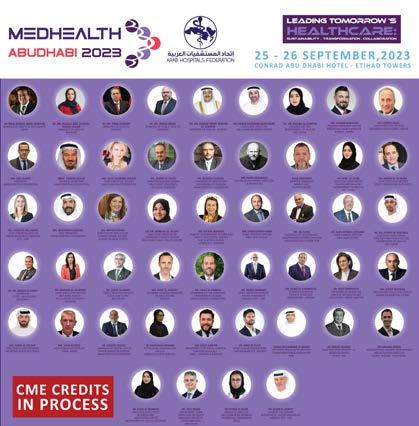
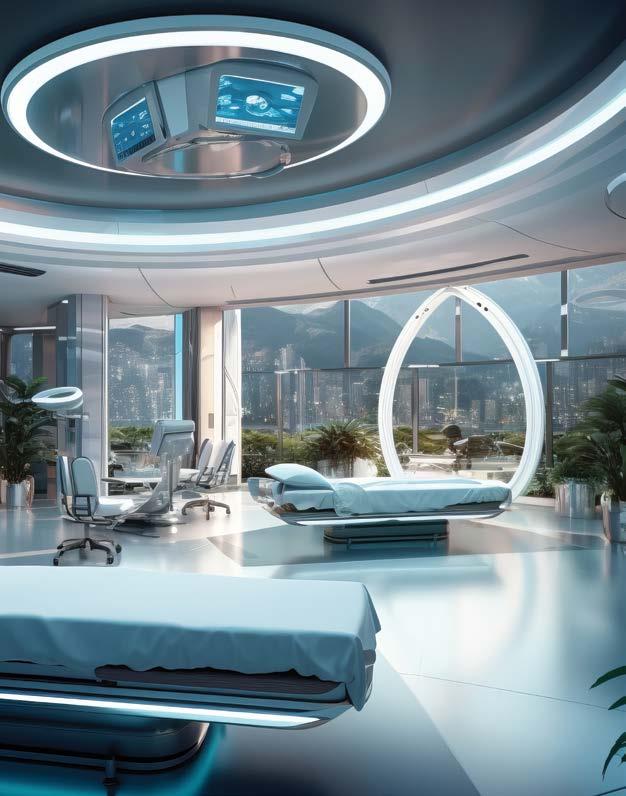
Medical or wellness tourism has been around for centuries. Still, its growth as a viable and mature industry is accelerating like the expansion the hotel industry experienced from the 1950s to the 1980s.
The hotel systems spread in the 1950s and 1960s, reaching maturity by the late 1970s. It evolved into an efficient industry with varied management, marketing, financing, accounting, measurement, standards, and discipline in operations (Steve Rushmore). This paper discusses the hotel industry's pivotal role in complementing medical tourism's positive developments. In the United States, national and regional professional hotel and lodging associations emerged in the early 20th century, primarily to protect the lodging industry from fraud, and paralleled growth in the 1970s to offer a broad range of promotional and educational programs and legislative support (AH&LA). Today, numerous medical tourism companies and health clusters have been established worldwide to assist in the industry's development and standardization. The American Medical Association takes the initiative, collaborating with universities and early competitors to provide education and certifications, promote best practices, and lead the evolution.
We anticipate that medical tourism will mature faster than the three decades that marked the rise of the hotel industry, primarily due to the current advancements in operations, system design, branding strategies, technology, and so forth. However, the maturation of the medical/ wellness tourism industry won't happen on its merits alone, as this industry heavily relies on many players and, in some cases, on the entire community. For this reason alone, medical tourism will face numerous challenges, more so than specific tourism sectors such as timeshares and amusement parks.
The hotel/lodging industry partnership plays a small but significant part in developing various tourism sectors. An example is the timeshare industry in the United States, which started almost 30 years ago (Randall S., Upchurch & Kurt Gruber) and only truly flourished when major hotel chains like Marriott and Hilton entered into partnerships with companies in this sector.
The industry's development reached its current stature thanks to its expertise in brand development, customer loyalty, and crucial resources, including real estate brokers, top investors, and innovative mixed ventures.
Let's start with the Mayo Clinic's community approach to the comprehensive patient experience and healthcare delivery. Mayo's primary goal is: to understand human needs and design services, products, and business models to meet those needs. (http://www.mayo.edu/center-for-innovation/what-we-do/mission-goalsand-approach).
Patients and their families traveling for healthcare have many needs. Some are tangible, like transportation, accommodation, food services, shopping, and proficient touristic activities. The intangibles, the cornerstone of the hotel industry culture, encompass the pre-departure, encounter, and post-departure experiences.
A balanced medical/wellness tourism destination should address nearly all tangible and intangible matters, which goes beyond the scope of this paper. Therefore, we explore how the lodging industry can position itself to make its services available to medical/wellness tourists by:
1. Providing accommodation places,
2. Suitable and effective business models,
3. Innovative design, comfort, and services.
Supply: Hospitals and healthcare facilities need each other more than ever before. Cost pressures force hospitals to discharge patients on time to nearby hotels or homes; the demand for hospitality services within hospitals compels healthcare facilities to act like hotels, and
TODAY, NUMEROUS MEDICAL TOURISM COMPANIES AND HEALTH CLUSTERS HAVE BEEN ESTABLISHED WORLDWIDE TO ASSIST IN THE INDUSTRY'S DEVELOPMENT AND STANDARDIZATION. THE AMERICAN MEDICAL ASSOCIATION TAKES THE INITIATIVE, COLLABORATING WITH UNIVERSITIES AND EARLY COMPETITORS TO PROVIDE EDUCATION AND CERTIFICATIONS, PROMOTE BEST PRACTICES, AND LEAD THE EVOLUTION.
hotel companies see opportunities in building hotels near healthcare facilities. The interaction between this attraction makes the perfect marriage. Improved occupancy and financing needs enhance the appetite of the hotel industry to build hotels near hospitals:

Occupancy: A study by Bruce Serlen (Hotel Management) mentioned that hotels near healthcare facilities achieved a higher occupancy rate during the 2007 recession. Many sources, such as HVS, amplified this statement. As a result, developers are more interested in building hotels near hospitals to create a recession-proof facility. (Bruce Serlen, Hotel Business, 02/07/09, Volume 18, Number 3)
Financing: In a flat economy, both banks and hospitals are appropriately interested in financing such projects. Mark Laport, the CEO of
Concord Hospitality in Raleigh, North Carolina, stated: "With nearly a halt in new hotel development in the U.S., one of the few areas where new property construction continues is the hospital-adjacent hotel market. Developers of these hotels can pitch financiers on their builtin customer base, and in many cases, negotiate side deals with housing-hungry hospitals that might purchase assets like free parking spaces or land below market price."
http://www.travelweekly.com/Travel-News/Hotel-News/Hospital-adjacent-hotels-get-built-amid-development-standstill/
Appropriate and Efficient Business Models: Accommodation operators and healthcare facilities can integrate in at least three ways.
1. Firstly, the most common model in the United States is where hotels and hospi-
tals arrange Memorandums of Understanding (MoUs) to cooperate, sometimes by offering discounted rates, transportation, concierge services, etc.
2. Secondly, hotels and hospitals exist together in the same building. Either the hospital dedicates a few stories for patient/family rooms (e.g., University of Michigan Med Inn, Bumrungrad International Hospital in Thailand), or a large hotel dedicates a floor or two for a health/medical facility (e.g., Shilla Hotel, Seoul, South Korea).
3. Thirdly, the hotel and the hospital build a mixed-use project under the same ownership. These facilities are strategically located to meet the needs of the patients in the hotel, their families, and transient guests (e.g., Grand Resort Bad Ragaz, Switzerland).
These models have already been established worldwide, and we still need more research and analysis to verify the pros and cons each model offers, the specific needs of different patients and their families, and the economic feasibility of each model.
Currently, we wait and see which model emerges and best aligns with the advantages of each destination and its customer needs.
Innovative Design, Amenities, and Services: While developers may rush to build hospitals adjacent to hotels, we have yet to design an ideal brand for travelers for therapeutic/ medical tourism.
Several challenging issues still require further research. Most importantly, building modifications, facility adjustments, and service modifications.
Building Modifications: The accommodation sector still needs to develop an efficient room design that fully caters to the needs of both patients and leisure/business travelers. A hospital-like hotel room is less appealing to business or leisure clients.
Still, it should fully accommodate ADA requirements by removing architectural barriers, such as accessibility to all amenities, including the pool, sauna, etc., and providing assistive aids and innovative wired and wireless communications. Such an effective design remains to be seen.

Additionally, the property's facility entrances and guest movement should be appropriately and conveniently designed for all targeted customer needs.
Facility Modifications: What are the most desired amenities for patients? There's no valid data considering the needs of all guest types alongside customer preferences.
Logically, the following amenities seem smart, but are they? Adjustable beds, nurse call systems, Wi-Fi, bed controls, individual TVs, hot baths, individually controlled air, bathroom amenities suitable for recovering patients and family needs, such as microwaves, refrigerators, washing machines, etc.
HOSPITALS AND HEALTHCARE FACILITIES NEED EACH OTHER MORE THAN EVER BEFORE. COST PRESSURES FORCE HOSPITALS TO DISCHARGE PATIENTS ON TIME TO NEARBY HOTELS OR HOMES; THE DEMAND FOR HOSPITALITY SERVICES WITHIN HOSPITALS COMPELS HEALTHCARE FACILITIES TO ACT LIKE HOTELS, AND HOTEL COMPANIES SEE OPPORTUNITIES IN BUILDING HOTELS NEAR HEALTHCARE FACILITIES.
Service Modifications: This is one of the most challenging factors the hotel sector must face when partnering with hospitals or health centers. Hotels are one of the main touchpoints in the patient encounter stage. To provide seamless services to all guest types, especially traveling patients, hotels need to consider the following:
1. Efficient gatekeepers, translators, first-aid training, prescription delivery, coordinators, 24-hour room service, shopping services, group transport services, and all-inclusive pricing.
2. Nursing staff and nutrition specialists: All of this requires significant investments in employee training and recruitment activities. Most hotel employees are attracted to this industry without a primary background in dealing with patient needs. Research is needed to
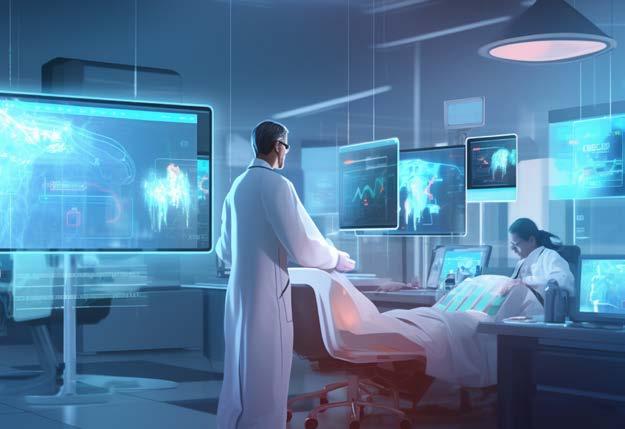
explore the cost-effectiveness of these training efforts. Additionally, we must explore what kind of employees will succeed in this sector. What are the characteristics required for performance modeling? What are the necessary credentials? Lastly, what services should they possess?
In conclusion, although the industry, as a specific segment, seems more applicable than ever, there are numerous upcoming challenges, including community involvement and partnerships, significant funding requirements, management systems, distribution channels, legal issues, marketing and branding, standardization, and metrics/benchmarking. All these challenges offer numerous opportunities for all stakeholders, which we hope to witness as other industries have accomplished before us.
About the Authors:
Dr. Ali Poorani, Director of Hospitality Associates for Research and Training (HART), is an Associate Professor of Hospitality Leadership and Entrepreneurship at Lerner College of Business and Economics at the University of Delaware. Poorani@udel.edu.
Rayan Poorani is a Business Development Intern and Project Manager at Keck Medical Center at the University of Southern California. He also developed an entry-level training program for new employees to enhance purchasing and improve new employee satisfaction at the Ritz-Carlton Hotel Company in Los Angeles, California. Poorani@usc.edu.

There is the most famous quote by Donald McGannon — “Leadership is action, not a position." Leadership is not about title or position. It is about being a positive influence on those around you and motivating others toward success. Great leaders make the purposeful choice to empower everyone they lead to help them be the best version of themselves. They acknowledge the strengths and potential contributions of their employees and provide them with the opportunity to grow and learn effectively. They lead by example with integrity and inspire the people around them to push themselves – and, in turn, the company – to greatness.
An embodiment of such exemplary leadership is Wissam Daoud, the Managing Director of Middle East & Africa at Sysmex Middle East FZ – LLC, a subsidiary of Sysmex Europe SE, one of Europe’s top laboratory diagnostics and healthcare companies, and the global leader for hematology diagnostics and service. Sysmex Middle East FZ was established in April 2008 as a regional hub for Sysmex activities throughout Middle East countries, operating from its offices in Dubai. Under the insightful leadership of Wissam, the company is marching ahead on the path of growth and success.
Sometimes it’s the tragedy or unfortunate events that pave your way to achieving a greater purpose. As Robert Thomas aptly said in his excellent book, Crucibles of Leadership: "Great leaders become great by finding meaning in adversity - in traumatic and unplanned crucible experiences—and then transforming those experiences into improved performance.”
For Wissam, one such pivotal incident was when one of his favorite uncles was wrongly diagnosed with arthritis while he had bone cancer. That wrong diagnosis worsened his life and they didn’t discover it until the last stage. This startled Wissam to the core and made him think — how a single diagnostic error can have
serious, lasting, and sometimes tragic results. He realized that diagnostic error is one of the most important safety problems in healthcare today and leading the transformation in the industry can reflect in so many lives. Thus, he decided to illuminate the blind spot of diagnostic error and improve diagnosis in healthcare through Sysmex through successful partnerships with healthcare providers and various governmental bodies across our region.
Over the years, Sysmex Middle East FZ-LLC has grown to become one of the Middle East region’s leading diagnostic suppliers with a reputation for high-quality products, service, and reliability. However, its unique proposition lies in its ability to have direct existence in 3 different regions and chains of strong partners, a professional team, and optimal after-sales support. Besides this, what further gives the company a unique edge in the market is its focus on hiring the right people and training them to meet its customer expectation, having the right geographical coverage and right strategies regarding what to focus on, what to develop, what to transform and what
OVER THE YEARS, SYSMEX MIDDLE EAST FZ-LLC HAS GROWN TO BECOME ONE OF THE MIDDLE EAST REGION’S LEADING DIAGNOSTIC SUPPLIERS WITH A REPUTATION FOR HIGH-QUALITY PRODUCTS, SERVICE, AND RELIABILITY. HOWEVER, ITS UNIQUE PROPOSITION LIES IN ITS ABILITY TO HAVE DIRECT EXISTENCE IN 3 DIFFERENT REGIONS AND CHAINS OF STRONG PARTNERS, A PROFESSIONAL TEAM, AND OPTIMAL AFTER-SALES SUPPORT.
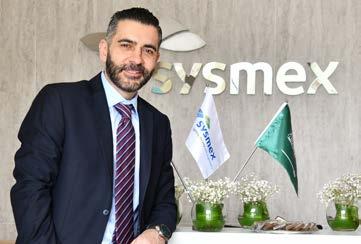
are the opportunities. Sysmex also acts as a knowledge provider for the systemic academy, where employees are trained and encouraged to expand their knowledge and maximize their potential. “We don’t sell me-too products. We sell unique products. The Sysmex valueadded services provide our customers with a personalized, tailored approach; whether you require standalone diagnostic solutions or a fully integrated managed service agreement,” opines Wissam.
Undoubtedly establishing a successful company is not a piece of cake. But what Wissam finds even more challenging is to be consistently successful in the region. Initially, building brand equity and brand awareness was quite challenging for the company. “It requires multiple factors to build this including state-ofthe-art products, technology and results, and after-sales service. If you’re having a product and if you don’t offer the support that customer needs then it is just a piece of metal sitting on the shelf” asserts Wissam. With state-of-the-art products, groundbreaking technology, optimal customer service, and a highly proficient team, Sysmex was able to overcome all the obstacles along its way to reach where it is today and we strongly emphasize our commitment to working together with healthcare professionals, patients, and all stakeholders to deliver the best possible outcomes for our patients.
We recognise that healthcare is a journey that can be challenging for patients and their families. By working together, we can make that journey a little easier and provide the best possible care. With our healthcare solutions we ensure unmatched quality, advanced technology, mindful support, and actions that reflect the needs of our customers. We constantly seek to better understand what our customers require so that we may generate new and more satisfactory solutions.
Wissam has always believed in servant leadership style and he has followed this at Sysmex too. Highly inspired by the book called “Leaders Eat Last,” which speaks about serving the employees and working for the employees,
he always strives to put this leadership style into practice and makes sure everybody in the organization has everything to be successful. According to Wissam, a leader must ensure that everyone in the organization has the right tools, right knowledge, right mindset, time, and the capacity to be successful at the job they are doing. “It’s not really about how successful I’ll be or how successful the company will be. It’s also about how successful our employees are. As a leader, it gives me great pleasure and a sense of pride when I see one of the people I worked with, are accelerating in their careers and gaining great success in the market,” adds Wissam.
While there are several attributes that played a key role in Wissam’s success story, it’s his firm belief in his capability, unwavering courage to take risks, and strong determination to get out of his comfort zone to try different things that make him the impeccable leader he is. Imparting the key lessons from his years of experience, Wissam advises emerging entrepreneurs to take calculated risks, step out of their comfort zone and try new things no matter how crazy it looks.
Going forward, Wissam aspires to see Sysmex Middle East as a partner of choice for medical healthcare solutions across the Middle East area. As a complete solution provider, now the company is enhancing its capabilities internally and further improving its solutions to help its clients become more effective, doing the job they need to do with high accuracy and efficacy. “Our goal is to not only deliver best-inclass products but to also increase the number and quality of tests that are being made, and be a true healthcare company where we can help people diagnose any symptoms early before they get sick rather than being a sick care company treating people after they get sick,” elucidates Wissam. As the company continues to thrive, Wissam also envisions growing as a leader and as a person to take this venture to a new height in the coming years.
WISSAM HAS ALWAYS BELIEVED IN SERVANT LEADERSHIP STYLE AND HE HAS FOLLOWED THIS AT SYSMEX TOO. HIGHLY INSPIRED BY THE BOOK CALLED “LEADERS EAT LAST,” WHICH SPEAKS ABOUT SERVING THE EMPLOYEES AND WORKING FOR THE EMPLOYEES, HE ALWAYS STRIVES TO PUT THIS LEADERSHIP STYLE INTO PRACTICE AND MAKES SURE EVERYBODY IN THE ORGANIZATION HAS EVERYTHING TO BE SUCCESSFUL.

As first time in the world, Liv Hospital in a groundbreaking collaboration with Healthverse PanoramicWEB, has unveiled a pioneering digital platform that is set to transform the telehealth industry. This revolutionary platform marks a significant leap forward in healthcare accessibility, offering patients, doctors, and international patient counselors an immersive 360-degree tour of Liv Hospital's state-of-the-art facilities through a single, user-friendly link.
Healthverse PanoramicWEB empowers patients to embark on a virtual journey through the hallowed halls of Liv Hospital from anywhere in the world. Guided by experienced patient counselors, patients can meet their healthcare providers and gain comprehensive information about their treatments. This cutting-edge digital environment seamlessly connects patient counselors, doctors, and patients, enabling healthcare professionals to provide their services digitally, even when they are physically distant from the hospital.
Meri Istiroti, Liv Hospital Group Coordinator, expressed her excitement about the partnership and the platform, stating, "As Liv Hospital, we have had the privilege of showcasing our world-class facilities through Healthverse PanoramicWEB. By engaging with patients oneon-one, we've been able to address their health concerns and explain their treatment options thoroughly. This newfound transparency has instilled unwavering confidence in our patients, reaffirming Liv Hospital as their preferred destination for healthcare needs."
In an era marked by increasing digitalization across industries, Healthverse PanoramicWEB continues to lead the way in technology mobilization. The company's commitment to enhancing lives through cutting-edge technologies is evident through its support for next-generation solutions that align with existing technology infrastructures.
Their holistic approach covers everything from hardware to services and consultancy, with a particular focus on sectors like health, transportation, energy, and security. This strategic commitment to digital transformation ensures that businesses can thrive globally, fostering innovation and internationally recognized technologies.
Visitors to Healthverse PanoramicWEB can embark on a virtual reality journey, accessing Liv Hospital's facilities through 360-degree camera technology. This immersive experience is available through VR glasses, mobile devices, or computers. Visitors can engage in face-to-face meetings, whether guided by an administra-
IN AN ERA MARKED BY INCREASING DIGITALIZATION ACROSS INDUSTRIES, HEALTHVERSE PANORAMICWEB CONTINUES TO LEAD THE WAY IN TECHNOLOGY MOBILIZATION. THE COMPANY'S COMMITMENT TO ENHANCING LIVES THROUGH CUTTING-EDGE TECHNOLOGIES IS EVIDENT THROUGH ITS SUPPORT FOR NEXT-GENERATION SOLUTIONS THAT ALIGN WITH EXISTING TECHNOLOGY INFRASTRUCTURES.
With the cooperation of Healthverse PanoramicWEB, the new and local innovation of the health sector is at Liv Hospital for the first time
tor or independently. Those accompanied by administrators can pose questions in real time, while solo visitors can simultaneously access a wealth of information and videos embedded within Healthverse PanoramicWEB, offering a comprehensive understanding of the hospital's advanced technology and services. Moreover, this platform can significantly reduce costs for organizing events such as seminars, conferences, and fairs, providing a budget-friendly solution for participants and companies.
Healthverse PanoramicWEB's partnership with Liv Hospital signifies a remarkable leap forward in telehealth, emphasizing the unique patient-centric experience provided by Liv Hospital. This pioneering collaboration brings healthcare directly to patients' fingertips, bridging the gap between technology and healthcare. Together, Healthverse PanoramicWEB and Liv Hospital are set to redefine the healthcare landscape, making healthcare more accessible, interactive, and tailored to patients' needs than ever before.
• Healthverse PanoramicWEB, a digital health platform, is an application that brings hospitals, patient counselors, doctors and patients together online with 360-degree navigation. Patients can see the health service they will receive, the technology to be used and the hospital one-on-one, have a meeting under the guidance of patient counselors and receive information from their doctor.
• Patients anywhere in the world can easily connect to Healthverse PanoramicWEB from anywhere in the
world where there is internet access by simply clicking on the link sent without downloading any program.
• It is possible to easily connect to Healthverse PanoramicWEB from VR glasses, mobile phone or computer.
• In Healthverse PanoramicWEB, patients can visit Liv Hospital alone or accompanied by a patient counselor, and ask questions to the patient counselor whenever they want.
• Healthcare professionals using Healthverse PanoramicWEB can digitally clone themselves inside the hospital and show the hospital to patients in person, even if they are not in the hospital.
• It is possible to watch 360-degree videos in different languages simultaneously via Healthverse PanoramicWEB. One patient can watch the same video in Turkish while another patient can watch it in English.
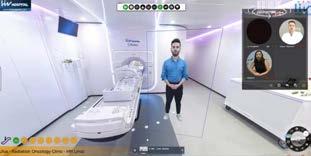
• Healthverse PanoramicWEB's software is based on actual location. In this way, there is no need for re-writing new sections added to the Healthverse PanoramicWEB platform. The platform is open for development in terms of software.

• A correspondence module is available in Healthverse PanoramicWEB for the hearing impaired.
HEALTHVERSE PANORAMICWEB, A DIGITAL HEALTH PLATFORM, IS AN APPLICATION THAT BRINGS HOSPITALS, PATIENT COUNSELORS, DOCTORS AND PATIENTS TOGETHER ONLINE WITH 360-DEGREE NAVIGATION.

Green hospitals is a concept that integrates sustainability initiatives to reshape the construction of healthcare facilities, fostering a more environmentally-friendly healthcare system. The medical sector is increasingly transitioning towards environmentally friendly practices, benefiting patients and healthcare providers. The terms "sustainable hospitals" and "eco-friendly" have gained momentum, especially in the Arab world and Gulf countries.
This shift underscores hospitals' vital role in diminishing environmental pollution and emissions. Nations are implementing comprehensive approaches to ensure healthcare facilities meet sustainability standards. At the heart of these efforts is fostering environmental health in the healthcare sector, which strengthens global health systems. Governments and health ministries are advancing plans to transform healthcare facilities into green institutions. This involves adopting green building concepts, using sustain-
able and recyclable materials, and switching to clean, renewable energy sources. The private sector is also pivotal in this transition. Their efforts have introduced numerous initiatives to bolster medical sustainability and reduce pollution, enhancing the patient experience. By upholding sustainability standards, private hospitals can improve their community reputation, attract more patients, and potentially earn international environmental accreditations.
Green or sustainable buildings in the healthcare sector prioritize adopting the highest environmental and health standards. This aims to cultivate a medical environment that equally emphasizes health and environmental protection. While the upfront cost of embracing these green practices might appear steep, they have consistently proven to be a wise investment for hospitals by cutting long-term energy expenses.
The prevailing global trend is the design of future hospitals with environmental considerations at the forefront. This involves the incorporation of natural lighting, strategies for noise reduction, and the integration of green spaces. Such a trend aligns with the broader movement pushing for the rapid evolution of green construction in hospitals and medical facilities worldwide. Especially considering these establishments account for approximately 5% of harmful emissions, there's a growing emphasis on weaving healthcare services into the green evolution narrative.
Under stringent sustainability guidelines, green hospitals emphasize efficient energy and water use, lean on renewable energy sources, and ensure the safe disposal of medical waste and hazardous materials. Their operation also incorporates eco-friendly products with an overarching goal to curtail carbon footprints and the emission of greenhouse gases from combustion activities, which are known to have serious health implications. One ambitious objective of green hospitals is to achieve net-zero emissions. This is realized by revamping buildings' structural design and revisiting the facility's consumption patterns. There's an inherent understand-
ing that healthcare waste harbors microscopic organisms detrimental to health. These microorganisms can potentially transmit infections to patients within the facility, healthcare workers, and the broader community.
Another concerning element is the proliferation of drug-resistant pathogens within these establishments. Given these challenges, there's an imperative for hospital management to evolve their facilities into environmentally responsible entities. This necessitates significant overhauls in work procedures, equipment utilization, offered services, and the broader ambiance and infrastructure of the hospital.
Sustainable hospitals offer numerous advantages for patients, staff, and the wider community. These facilities:
• Utilize clean energy sources like solar or wind power.
• Minimize medical waste and promote recycling.

• Ensure safe chemical and healthcare waste management.
• Enhance environmental awareness among their users.
• Provide healthier environments through efficient energy use, improved indoor air and water quality, advanced waste management, and eco-friendly lighting and ventilation systems.
• Balance environmental, economic, and social needs.
• Safely manage medications and dispose of expired drugs.
A genuinely sustainable healthcare facility should prioritize energy and water efficiency, responsibly manage hazardous waste and chemicals, have a food safety protocol, and reduce carbon emissions. Monitoring and mitigating emissions, such as carbon dioxide and nitrogen oxide, is essential due to their health implications. Ultimately, the move towards sustainable hospitals requires top-tier environmental initiatives, focusing on energy conservation, waste recycling, and ensuring the well-being of all stakeholders.
GREEN OR SUSTAINABLE BUILDINGS IN THE HEALTHCARE SECTOR PRIORITIZE ADOPTING THE HIGHEST ENVIRONMENTAL AND HEALTH STANDARDS. THIS AIMS TO CULTIVATE A MEDICAL ENVIRONMENT THAT EQUALLY EMPHASIZES HEALTH AND ENVIRONMENTAL PROTECTION.


Because he has frontotemporal dementia, Ted Oppenheimer can sometimes be apathetic and disoriented.
That isn’t the case, though, during his inhome music therapy sessions offered through The Memory Center — part of the University of Chicago Medicine’s Center for Comprehensive Care and Research on Memory Disorder.
Oppenheimer’s wife, Susan, calls music therapy his “best hour of the week” because Ted is engaged, attentive and excited to play his trumpet, an instrument he learned as a teenager but put down for decades prior to his diagnosis. During the sessions, Ted also gets to sing and play the xylophone.
“What song should we play next?” asks Ted’s music therapist, Mia Iliopoulos Krings,
MM, CDP, MT-BC, from Greater Chicago Music Therapy Inc., during a recent session in his Chicago condominium.
Ted shuffles through his sheet music and picks Louis Armstrong’s “On the Sunny Side of the Street.”
Krings strums her guitar and sings. Ted picks up his trumpet and swings into the jazz standard. He’s having so much fun jamming, he holds the last note with emphatic vibrato. Everyone in the room applauds.
“I’d like to play Carnegie Hall one day,” he says with a smile.
Sometimes Susan tap dances along and she and Ted exchange glances. It’s a tender connection for the couple, married for 22 years, since Ted’s disease has impacted their quality of life and reduced Ted’s ability to socially engage and
POSITIVE EXPERIENCES LIKE THESE HAVE ENCOURAGED PHYSICIANS AT THE MEMORY CENTER TO ADD MUSIC THERAPY TO ITS CREATIVE ARTS THERAPY PROGRAMMING FOR PATIENTS WITH ALZHEIMER’S DISEASE AND RELATED DEMENTIAS.

recognize emotions in others.
Positive experiences like these have encouraged physicians at The Memory Center to add music therapy to its creative arts therapy programming for patients with Alzheimer’s disease and related dementias.
“Music therapy is not typically offered in memory centers. It’s something special we’ve been focusing on and we want to continue to expand it,” said James Mastrianni, MD, PhD, Director of the Center for Comprehensive Care and Research on Memory Disorders.
The effort is being led by Kaitlin M. Seibert, MD, a behavioral neurologist uniquely suited for the job; she is both a behavioral neurologist and an amateur musician.

Since Ted also has senior onset asthma, he does a separate physical exercise program to improve his breathing, which in turn helps his trumpet playing. Deep breathing from singing and playing his trumpet also sends more oxygen to the brain, creating physiological benefits, Krings said.
“It makes people feel ‘better’ in their own individual way,” Krings said. “Ted said he felt ‘invigorated’ at the end of our last session.”
“Adapted sports provide him with physical strength. Music therapy gives him emotional pleasure,” Susan added. “When Ted and Mia sing, and Ted plays the trumpet and xylophone, our home is filled with joy.”
Music can be used in different ways based on what type of dementia a patient has and what symptoms are most noticeable.
In frontotemporal dementia (like Ted’s case), motivation and social cues can be targeted. Alternatively, in Alzheimer’s dementia, playing a favorite song can tap into deep parts of the brain that aren’t affected by the disease. It can trigger happy memories and feelings of joy, often bringing a smile to a person’s face. Examples of this can be seen in “Alive Inside,” a 2014 documentary film that inspires the Memory Center staff.
Music can be used to reduce depression, agitation and unwanted behaviors in people with dementia, Seibert said. A breakfast or bathtime song can help coax them to do routine tasks that may make patients uneasy. Frequent repetition
or mood swings exhibited by patients can be difficult to manage, so sharing a song can be a good way to connect over something that is not dependent on memory or cognition.
“A patient might not be engaged or alert. But a lot of times, if you play music that is personally meaningful to them — a wedding song or something related to a pleasant memory — they light up and become engaged and may even sing along,” Seibert said. “A lot of patients’ family members have described this as ‘a back door to their cognition.’”
The board-certified music therapists who work with UChicago Medicine, like Krings, are trained to make eye contact with the patient, let them choose the music and encourage them to talk about each song. That engagement allows them to express themselves creatively and verbally, and can provide a feeling of success.
Caregivers seem to enjoy music therapy as much as the patients. That’s part of the goal of The Memory Center’s creative art therapies, Mastrianni said: reducing caregivers’ stress and improving the caregiver-patient relationship.
For now, music therapy is available as private, one-on-one sessions, but plans are in the works to make it more widely available and accessible. Currently, the barrier for most dementia patients is cost, as music therapy is not covered by Medicare or Medicaid.
“Music therapy costs money. To provide this for patients and truly measure its impact, we need to bridge the gap,” Seibert said.

The Memory Center offers less expensive (and free) creative art therapies, such as their nationally recognized “Art is … In” program, where participants receive a free, professionally curated art kit in the mail each week.
“Music, movement and arts are the key to a meaningful quality of life when you have dementia, and we want to tap into as much of that as possible,” said Tessa Garcia McEwan, AM, LCSW, CDP, one of the Memory Center’s dementia practitioners. “I try to give families not only access to care, stretching their dollars with care plans, but also a meaningful quality of life because there is currently no cure for these diseases.”
FOR MORE INFORMATION, VISIT WWW.UCHICAGOMEDICINE.ORG/GLOBAL
Genetic testing for BRCA mutations is recommended for women and men with a strong family history of breast /ovarian/ prostate cancer after genetic counselling. ‘Hospitals’ magazine met Deborah Mukherji, MD, MBBS, FRCP, Consultant Medical Oncologist at CMC Dubai, and talked about the role of BRCA gene in cancer and who is recommended for BRCA testing, in addition to the importance of awareness and early detection.
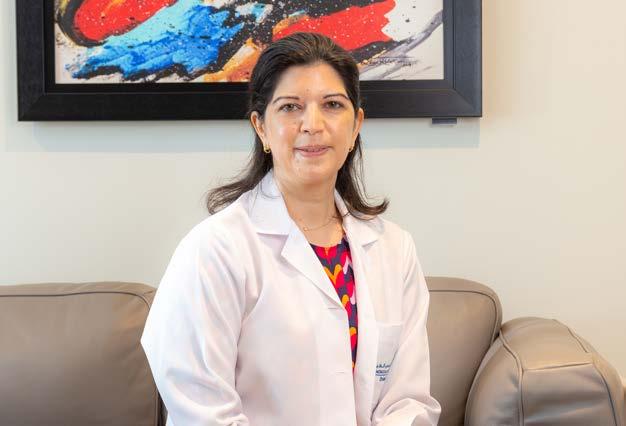
Let’s start the interview by talking about the awareness and its role in early detection. Do you think campaigns achieved the goal?
Spreading the message about breast cancer awareness in the community is the most valuable strategy to improve the uptake of screening and improve early detection. Breast cancer is very curable if we diagnose it at an early stage. It has been shown that increasing awareness of
BREAST CANCER IS VERY CURABLE IF WE DIAGNOSE IT AT AN EARLY STAGE
"Genetic testing for BRCA mutations is recommended for women with a strong family history of breast cancer"
Deborah Mukherji, MD, MBBS, FRCP
breast cancer saves lives through early detection. Increasing awareness of the risk factors for breast cancer is also important, promoting a healthy lifestyle which includes avoiding smoking and alcohol, staying active and maintaining a healthy weight. Being aware of your family history is also important. Women with a family history of breast and ovarian cancer may require screening to start at an earlier age and in some cases genetic testing may be and important to consider.
What are the warning signs? Should a woman wait for of these warning signs?
What is your message in the field?
The most important warning sign is a breast lump that is not changing with the monthly cycle. Many women have benign (non-cancerous) breast lumps but it is important that these are checked regularly and in the case of any changes, a biopsy may be recommended to exclude a cancer. Sometimes pre-cancerous changes or small cancers can be detected on a screening mammogram or ultrasound without any lump being felt which is why regular (annual) screening is recommend in women over 40.
What are the advanced screening tests that should be done? And at what age?
Regional guidelines recommend annual screening with mammogram and ultrasound from the age of 40. For women with a family history of breast cancer we often recommend MRI scans in addition to mammograms and ultrasounds.
What is the role of the BRCA gene in cancer?
The BRCA genes are involved in repairing the DNA and we all have them working in every cell in the body. In rare cases, there is a mutation in one of the BRCA genes that can lead to mistakes in the DNA which can lead to different types of cancer (most commonly breast cancer in women and men, ovarian cancer in women and prostate cancer in men). These mutations can be passed down in the family (inherited).
What age should a woman get tested for BRCA gene? Who is recommended for BRCA testing?
Genetic testing for BRCA mutations is recommended for women and men with a strong family history of breast /ovarian/ prostate cancer after genetic counselling. Genetic testing has pros and cons and is not right for everyone so the person considering genetic testing needs to have all the information before going forward with the test.
Genetic testing is also appropriate for some patients with a diagnosis of breast/ovarian/ prostate and pancreatic cancer.

What type of breast cancer is associated with BRCA?
Germline (inherited) mutations in BRCA genes can increase the risk of breast, ovarian, prostate, pancreatic and other cancers.
What are the characteristics of BRCA breast cancer?
Breast cancers in women and men with BRCA mutations may occur at an earlier age and are more likely to be “triple negative” which means not responsive to hormone or other specific types of targeted therapy.
THE MOST IMPORTANT WARNING SIGN IS A BREAST LUMP THAT IS NOT CHANGING WITH THE MONTHLY CYCLE. MANY WOMEN HAVE BENIGN (NON-CANCEROUS) BREAST LUMPS BUT IT IS IMPORTANT THAT THESE ARE CHECKED REGULARLY AND IN THE CASE OF ANY CHANGES, A BIOPSY MAY BE RECOMMENDED TO EXCLUDE A CANCER.
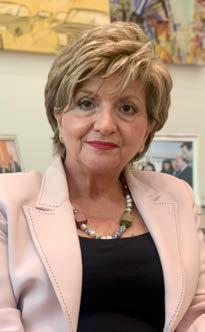
Oasis de Vie is an oasis of life, hope, and security for many health conditions that require medical and psychological care, necessitated by post-hospitalization situations or certain exceptional cases. The 'Oasis de Vie- Continuum of Healthcare Center' (ODV), established by the Greek Catholic Welfare Association of Beirut and its Suburbs, works on receiving patients of all ages and from various regions, and the elderly who need rest, recuperation and recovery. What's new with this center today? How was it founded, developed, and how did it overcome the COVID-19 pandemic, the economic crisis in Lebanon and the Beirut port blast? And what's the secret behind its success? These are questions answered by the Executive Director of “Oasis de Vie”, Sayde Maalim Nassar, in an exclusive interview with “Hospitals” magazine.
How would you describe the “Oasis de Vie” hospital or center?
"Oasis de Vie" is a specialized caregiving hospital center. It was established by the Greek Catholic Welfare Association of Beirut and its Suburbs, headed by Mr. Roger Nasnas. The center is located in Ashrafieh, central Beirut, and was inaugurated on the first of July, 2019, under the patronage of the President and with the blessings of the Patriarch of the Melkite-Greek Catholic Church, Youssef Absi. This resulted from a belief that Lebanon would recover and that we must cooperate to build a better society. Those responsible of the association collaborated to complete this project. The center was established on land donated as a gift from the late Mrs. Mary Youssef Aftimos, widow of the late lawyer, Mr. Nemr Heba. The rationale behind its establishment was that while Beirut has many large hospitals, there is no complementary
hospital to them, even though the waiting list for patients to get a bed was long. Hence, the decision was made to establish the “Oasis de Vie - subacute healthcare center”, the first of its kind in Lebanon. The center's vision is to build a cohesive society, and our mission is to provide a comprehensive range of health services to patients in need of supportive care and to those with non-acute illnesses. Ashrafieh was the chosen city to establish the center, for there, it would be surrounded by university hospitals.
“Oasis de Vie” hospital consists of 16 floors; six are subterranean and nine are above ground, covering a built area of 14,630 square meters. It includes a church, a reception lobby, 92 rooms, and 131 beds distributed across rooms with lounges, single rooms, and double rooms. Additionally, it features a physical
“OASIS DE VIE” HOSPITAL CONSISTS OF 16 FLOORS; SIX ARE SUBTERRANEAN AND NINE ARE ABOVE GROUND, COVERING A BUILT AREA OF 14,630 SQUARE METERS.
"We combined meticulous care, comprehensive attention and prudent management and thus achieved success"
therapy and rehabilitation center, a social club, a floor dedicated to Alzheimer's patients, a dental clinic, outpatient clinics, a hairdressing salon, a cafeteria and parking spaces.
Patients can visit the club to watch movies, play table games, dance, enjoy entertainment, and participate in other activities. I want to highlight that “Oasis de Vie” doesn't compete with hospitals but complements them. We accept patients who still require medical care but don't necessarily need to remain in a hospital. They come to us, and this includes patients of all ages as well as some elderly cases.
What are the main tasks of the center, and what medical conditions does it cater to?
The center focuses on caring for those affected by non-severe or moderately severe diseases, palliative care, taking care of patients with Alzheimer's disease, caring for patients in the final stages of their lives, elderly care, and social care. Family members who live alone often visit the social club at the center to spend their day, have lunch, and then return to their homes in the evening. This service provides this group of people with psychological comfort and meets some of their needs. We also offer all kinds of physical therapy and rehabilitation.
It is worth noting that the members of the charity believe that “Oasis de Vie” is more than just a specialized healthcare center. It is a symbol of triumph over adversity in the heart of the crisis that surrounds us. It represents the evolution of the association's ambitions, which has been involved in social, health, and charitable activities and projects since its inception. Furthermore, the vice president of the association and the CEO of Oasis de Vie, Mr. Zaffer Shawi, emphasizes that in this center, we put forth all our efforts and capabilities to serve as a haven that provides patients with everything they aspire to in terms of healing, happiness and comfort.

How would you describe the public's response to the center, especially since some, given the challenging circumstances, now avoid going to the
hospital unless it is a critical case or an emergency?
The response to “Oasis de Vie” has been very positive. We've sensed this through the satisfaction of the patients and their families. A patient who needs the center's services feels as if they are at home, not in a hospital. We are working towards obtaining accreditation from the Joint Commission International (JCI) in the United States and the Ministry of Public Health in Lebanon regarding the quality and safety of the services provided at the center.
You launched in 2019, meaning your inception faced the challenges of the COVID pandemic, the economic situation and the Beirut port explosion, yet you succeeded and continue to achieve more. How did you manage this?
When the hospital sector was focused on the COVID pandemic, allocating hospital spaces for those affected, the “Oasis de Vie” center conducted COVID tests before approving any patient's admission to ensure everyone's safety. Every moment of life is precious, and its quality might be more important than its quantity; hence the existence of “Oasis de Vie”. Despite the challenges of COVID, the economic situation, and the port explosion, our ambition was immense, despair was prohibited, and optimism was present. We gathered our efforts and decided to continue, combining meticulous care, comprehensive attention and wise management. We succeeded and overcame the crisis.
An important aspect to note is that we focused on raising awareness in a society that previously rejected the idea of placing Alzheimer's patients in a hospital, deeming it akin to abandoning them. Today, however, it's seen as showing more concern for their well-being. We did continue, but it was at a significant loss. Board members, especially Mr. Roger Nasnas and Mr. Zaffer Shawi, sacrificed their time, effort and personal finances, supplemented by some generous donors. It even reached the point where assets had to be liquidated to overcome the crisis, and we overcame it. One of the association's main goals is to support those who need our care but lack
"OASIS DE VIE" IS A SPECIALIZED CAREGIVING HOSPITAL CENTER. IT WAS ESTABLISHED BY THE GREEK CATHOLIC WELFARE ASSOCIATION OF BEIRUT AND ITS SUBURBS, HEADED BY MR. ROGER NASNAS. THE CENTER IS LOCATED IN ASHRAFIEH, CENTRAL BEIRUT, AND WAS INAUGURATED ON THE FIRST OF JULY, 2019, UNDER THE PATRONAGE OF THE PRESIDENT AND WITH THE BLESSINGS OF THE PATRIARCH OF THE MELKITEGREEK CATHOLIC CHURCH, YOUSSEF ABSI.
the financial means. The association assists them, as helping is one of its main objectives. But to help, you must be able to. We strive to ensure this: a balance between sustainability, offering the best services, and supporting our patients.
How would you describe the turnout at the hospital after overcoming major crises, mainly since the entire country has not yet fully emerged from them?
The turnout is improving daily, though it has yet to reach our aspirations. We are opening new floors and continuously expanding our services, even if sometimes we have to open one floor and close another depending on the number and nature of patient cases. Crisis management is different from regular management. My over thirty years of hospital management experience have taught me to handle tough circumstances, face challenges, and make the right decisions to succeed. Mainly since our inception, we have focused on the
quality and safety of our services. We've signed a contract with JCI, and the specifications list includes around a thousand standards. Our staff and doctors are working hard to qualify as an accredited hospital. This gives patients confidence in our hospital, and we are proud to complement the work of larger hospitals.
At the end of the interview, Mrs. Nassar insists that we take a tour of the hospital, from the entrance that resembles a hotel entrance to all floors and departments. This is to observe its architectural and hotel-like arrangement on the one hand, and to see the high-quality patient care, comfort, and psychological and health security on the other.
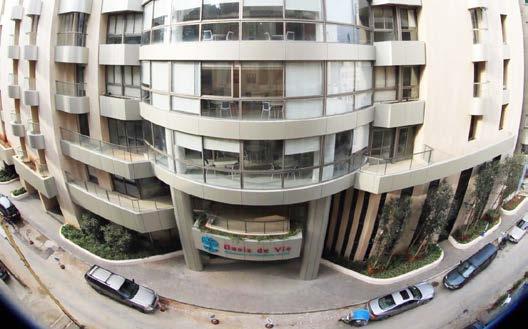
She concludes by emphasizing the unique “Oasis de Vie” vision and its comprehensive services, stating: “There are centers that provide a portion of what we offer, and others provide a different portion, but there is no one that offers everything we provide in terms of services at Oasis de Vie.”

THERE ARE CENTERS THAT PROVIDE A PORTION OF WHAT WE OFFER, AND OTHERS PROVIDE A DIFFERENT PORTION, BUT THERE IS NO ONE THAT OFFERS EVERYTHING WE PROVIDE IN TERMS OF SERVICES AT OASIS DE VIE.
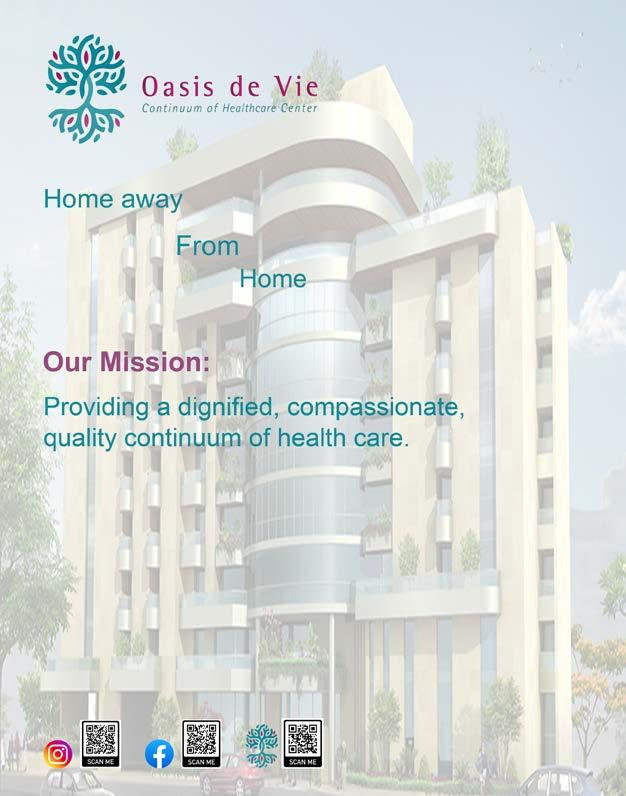
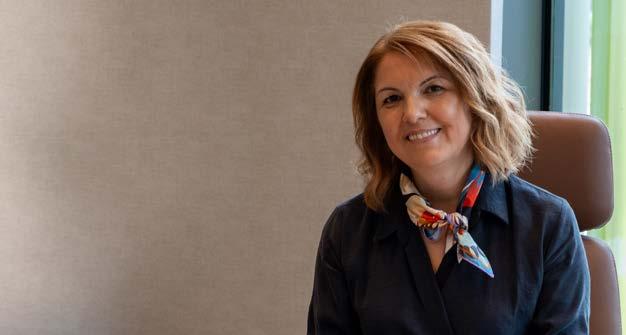
Director of ACIBADEM ATASEHIR HOSPITAL, ACIBADEM's 10th hospital in Istanbul and
ACIBADEM Healthcare Group operates a network of hospitals across 5 countries: Turkey, Bulgaria, Macedonia, Serbia, and the Netherlands. It all began in 1991 when the Group opened its first hospital in Istanbul, becoming a dominant provider of private healthcare services in Turkey. The growth of ACIBADEM has been remarkable. Less than a year ago, the Group inaugurated its newest hospital, ACIBADEM Ataşehir, marking its 10th hospital in Istanbul and 24th globally. As the latest jewel in its "hospotel" chain, ACIBADEM Ataşehir stands out for its innovative architecture, cutting-edge medical technology, and exclusive digital systems tailored for health management. Notably, its pediatrics department boasts a child-friendly design and separate play areas, distinct from the main hospital building. Mrs Serpil Sarıaydın, an influential female hospital director within ACIBADEM Group, was entrusted with the mission of making ACIBADEM Ataşehir Hospital a global flagship. Leading the team managing this state-of-theart facility with 153 suites of varying standards, 298 beds, 10 operating theaters, and specialized rooms for procedures like IVF, minor surgeries, angiography, endoscopy, and colonoscopy.
Could you introduce yourself, Mrs. Sarıaydın?
Born in 1976 in Kocaeli, Turkey, I embarked on my journey in Hospital Management at Hacettepe University in 1994, completing my studies in 1998. I pursued further studies in Business Administration at Kocaeli University. Following that, I spent 7 years in the public sector before joining ACIBADEM Healthcare Group in 2005. Since then, I've been serving as a Hospital Director within the same group for 18 years.
Leaving the public sector to join ACIBADEM at a time when it was a smaller entity was a significant decision. Do you remember your first day at ACIBADEM?
Drawing from my public sector experience, I was relatively calm on my first work day at ACIBADEM. However, as I entered the hospital, it felt like the start of a new phase, reminiscent of my first professional venture after completing my education. The public hospital where I previously worked was enormous, with 600 beds, following the Health Ministry's management guidelines. ACIBADEM's setup
ACIBADEM'S SETUP WAS MORE AKIN TO HOTELS THAN HOSPITALS, WITH METICULOUS PROCEDURES AND A STRONG FOCUS ON QUALITY AND SAFETY STANDARDS. ACIBADEM AIMED FOR GLOBAL COMPETITION, AND IT TRULY PROVIDES AN EXCEPTIONAL LEARNING ENVIRONMENT.
24th worldwide
"Every year, we welcome around 2540 patients from Middle Eastern countries, primarily seeking oncology treatments, cardiovascular surgeries, neurosurgical treatments, IVF, pediatrics care, as well as aesthetic procedures and annual health check-ups"
was more akin to hotels than hospitals, with meticulous procedures and a strong focus on quality and safety standards. ACIBADEM aimed for global competition, and it truly provides an exceptional learning environment.
What's your perspective on the impact of women in leadership roles in the healthcare sector?
In Istanbul, where ACIBADEM operates 10 hospitals, 8 women are holding the position of Hospital Director. Regardless of gender, ACIBADEM Hospital Directors deliver outstanding results, a testament to the high managerial standards set by ACIBADEM Group. Men and women exhibit remarkable professionalism at all levels, yet I believe that women's precision, sense of responsibility, attention to detail, maternal instincts, and inherent compassion allow us to excel uniquely.
Could you describe your relationship with the doctors in your hospital?
While all hospital staff adhere to traditional work terms, our doctors are seen as partners. They determine their work hours and schedules, offering them more autonomy compared to traditional employment. We aim to create a workplace where doctors can operate comfortably and efficiently, free from psychological and financial pressures that might arise from complete independence. This way, our doctors can focus solely on delivering the best medical care. Patients are central in ACIBADEM's structure, cared for by medical staff supported by administrative teams.
What services are available to local and international patients?
From ACIBADEM's standpoint, all patients receive equal treatment and services. However, international patients, often unfamiliar with their surroundings, are more vulnerable. We extend additional empathy and take care to reduce any psychological stress. We've established a dedicated department catering to international patients, offering services from airport pickup to direct communication with translators and doctors via personal phones. We
view our role as hosts for patients rather than tourists, treating them with utmost care.
Which medical specialties are frequently sought by patients from Middle Eastern countries?
International patients at ACIBADEM consult a range of departments. We offer regional representatives who facilitate second medical opinions in patients' native languages. Many of these patients ultimately choose ACIBADEM for treatment. We excel in various medical branches, utilizing cutting-edge technology and offering treatments 40-45% more costeffective than in Europe. Our hospitals cover a wide array of medical fields. Patients coming from the Middle-East frequently seek oncology treatments, cardiovascular surgeries, neurosurgical treatments, IVF, pediatrics care, as well as aesthetic procedures and annual health check-ups.
Why should patients from Middle Eastern countries consider Turkey for medical tourism, particularly ACIBADEM Ataşehir Hospital?
Turkey and the Middle Eastern countries share common cultural aspects, influenced by their geopolitical positions. Our shared characteristics, including religion, traditions, and hospitality, foster a sense of familiarity. No travel restrictions between our countries further facilitate visits. Safety is paramount in our hospitals. We ensure quality measures are maintained across operating theaters, consultation rooms, laboratories, and patient rooms. Our relationship with patients is transparent, and we prioritize their well-being. ACIBADEM Ataşehir Hospital, launched in September 2022, was meticulously prepared to provide top-notch care. With a seasoned management team and a well-trained staff, we successfully managed hundreds of consultations and surgeries during the first week of operation.
WHILE ALL HOSPITAL STAFF ADHERE TO TRADITIONAL WORK TERMS, OUR DOCTORS ARE SEEN AS PARTNERS. THEY DETERMINE THEIR WORK HOURS AND SCHEDULES, OFFERING THEM MORE AUTONOMY COMPARED TO TRADITIONAL EMPLOYMENT. WE AIM TO CREATE A WORKPLACE WHERE DOCTORS CAN OPERATE COMFORTABLY AND EFFICIENTLY, FREE FROM PSYCHOLOGICAL AND FINANCIAL PRESSURES THAT MIGHT ARISE FROM COMPLETE INDEPENDENCE.
What advice would you offer to the next generation of female leaders?
As a female leader, I take pride in my role and my ability to balance responsibilities and expectations from various stakeholders. Balancing professional and personal obligations is crucial. Striving for success requires maintaining one's feminine qualities, including emotional intelligence, empathy, and compassion. These attributes, driven by our female hormones, distinguish us and contribute to our achievements. My advice to current and future female managers is to embrace their feminine instincts, as these qualities define our unique leadership approach. In Turkey, there's a saying praising a woman's success "like a man" Yet, women should remain true to their inherent strengths and not imitate masculine behavior to succeed.
During your leisure time, if you have any, how do you unwind?
Though work is demanding, I find solace in
traveling. Recently, I visited Morocco, a short 4-day trip. My sister and I explored various cities, soaking in Morocco's history, culture, and local cuisine. The warmth of the people left a lasting impression. My interest in writing led me to creative writing classes and specializing in children's stories. Morocco, in particular, was inspiring for my writing endeavors.
It's a country I'd return to annually, with curiosity about new recommendations from my Moroccan patients. While I've traveled extensively, Morocco stands out. Despite typically not revisiting countries, I would happily return to Morocco each year. This sentiment is testament to Morocco's uniqueness among the countries I've visited. I believe every country in the Middle East and North Africa is worth at least one visit in a lifetime.
THOUGH WORK IS DEMANDING, I FIND SOLACE IN TRAVELING. RECENTLY, I VISITED MOROCCO, A SHORT 4-DAY TRIP. MY SISTER AND I EXPLORED VARIOUS CITIES, SOAKING IN MOROCCO'S HISTORY, CULTURE, AND LOCAL CUISINE. THE WARMTH OF THE PEOPLE LEFT A LASTING IMPRESSION.


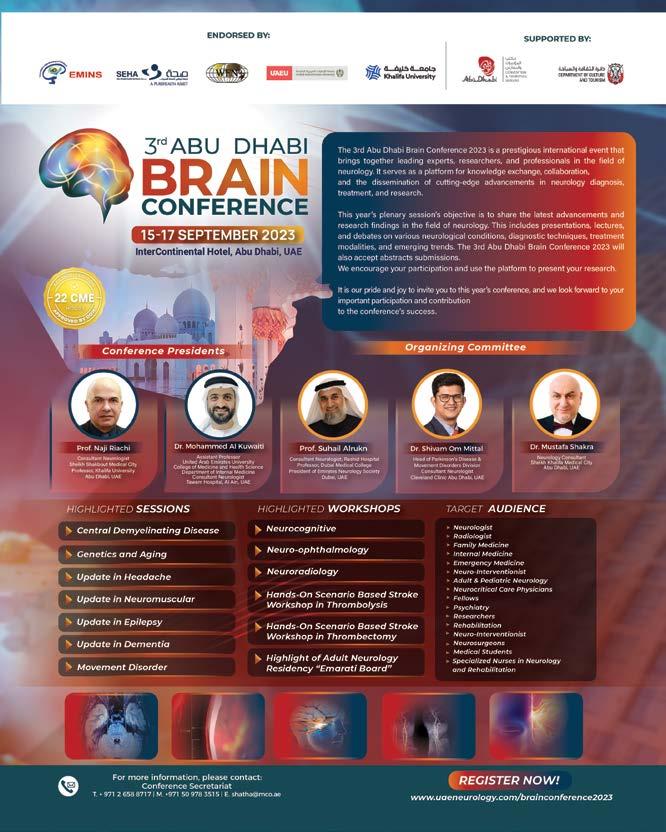
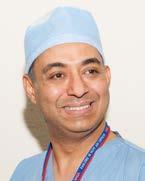
Al-Ahli Heart Center is accredited by Weill Cornell Medicine-Qatar to train students due to its distinguished features, as it encompasses all clinical and surgical sub-specialties of heart diseases, as well as vascular veins. The Critical and Cardiac Care Unit contains specialized rooms equipped with modern and advanced devices to continuously monitor the patient's pulse, blood pressure, and blood gas levels. All patient devices are connected to central monitoring systems outside the patient's rooms so that physicians and nurses can monitor the patient's condition without frequently awakening or disturbing them.
In addition, there is a modern and advanced cardiac catheterization laboratory where the heart chambers and both right and left sides' circulations can be examined, as well as the coronary arteries with high imaging accuracy for all details. This is in addition to other devices that can be used to measure the flow rate of blood inside the coronary arteries in detail, to assess the importance of the degree of constriction and its effect on the heart muscle's blood supply, and therefore the need to expand the coronary artery and place a stent in it. Other devices can also be used to examine the coronary artery directly from the inside using ultrasound waves, which gives an image of the coronary artery wall. Such images cannot be obtained through conventional catheterization. A comprehensive clinical training curriculum is developed upon which student training is based in the catheterization rooms and open-heart operating rooms, under strict rules that ensure patient safety and complete privacy. Afterwards, the evaluation is conducted by Dr. Abdurrazzak Gehani, who will supervise the students' training with the medical team at the heart center. Dr. Gehani, a professor at the College of Medicine, has
been responsible for teaching at Weill Cornell Medicine for 16 years and is keen to not only provide knowledge to students but also to teach them from his long years of experience in treating patients.
On his part, Dr. Gehani, Head of Cardiology Department at Al-Ahli Hospital and Professor of Cardiology at Weill Cornell, stated: "Students are trained at the Cardiac Center through a regular and organized program designed by the Cardiology Department team. The students go through several stages; the first stage involves familiarizing themselves with the correct examination methods, understanding the circulatory system, identifying the necessary tests for each case, as well as the basics of electrocardiogram planning, analyzing and reading, and training on studying patients' cases.
The second stage involves attending cardiac tests and learning the correct methods for conducting them, such as stress tests and echocardiography, with a focus on identifying what is normal and what indicates a heart problem. Therefore, the correct diagnosis of the case is made, and a treatment plan is developed, either through medication, catheterization, or surgery. Additionally, there is also a focus on raising awareness among students to provide advice to patients to prevent heart disease.
The third stage involves attending diagnostic and therapeutic catheterization procedures, discussing the results, and the treatment given during the catheterization, whether it be with stents and a focus on heartbeats and so on.
The fourth stage involves attending openheart surgeries, where the student first learns about the patient's readiness for surgery, the best ways to anesthetize and transfer the circulatory system from the heart to external blood circulation devices (heart and lung machine), where the heart must be stopped and the device's function redirected to enable surgery.
A COMPREHENSIVE CLINICAL TRAINING CURRICULUM IS DEVELOPED UPON WHICH STUDENT TRAINING IS BASED IN THE CATHETERIZATION ROOMS AND OPENHEART OPERATING ROOMS, UNDER STRICT RULES THAT ENSURE PATIENT SAFETY AND COMPLETE PRIVACY. AFTERWARDS, THE EVALUATION IS CONDUCTED BY DR. ABDURRAZZAK ALJAHANI, WHO WILL SUPERVISE THE STUDENTS' TRAINING WITH THE MEDICAL TEAM AT THE HEART CENTER.
Recently, open-heart surgery has developed to be conducted without the need for external circulation, and the heart continues to beat.
The fifth stage involves the correct method of reading laboratory test results, analyzing blood samples, and identifying early signs of any malfunction in the body before the condition worsens.
Finally, Dr. Gehani pointed out the stage of training adoption, where the student's training period is evaluated, weaknesses and strengths are identified and focused on and improved before graduation.
The medical student from Weill Cornell describes his clinical training experience at Al-Ahli Hospital as highly beneficial, providing a deeper understanding of the work of cardiologists. He learned how to interpret cardiac echocardiogra-
phy and was exposed to a wide range of interesting cardiac conditions during his training period.
He attended various procedures in the catheterization laboratory, where he received instruction on coronary artery anatomy. He also learned how to communicate with patients during clinical examinations through the guidance of Dr. Gehani and the cardiology department team. The student, Khalifa, expressed that Dr. Gehani was an exemplary role model in providing care to patients with utmost effort, not only in delivering physical treatments but also in addressing their fears.
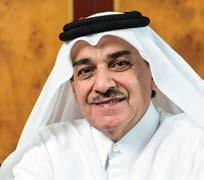
He was an inspiring mentor who provided the opportunity for Khalifa to learn how to manage different medical cases.
Khalifa also praised his experience at Al-Ahli Hospital, the staff, and nurses for their assistance and the various learning opportunities he was provided with.
On behalf of the medical team at Al-Ahli Hospital and the Darb Al-Aafia magazine team, I would like to extend my gratitude to our readers, contributors, and editors who have volunteered to contribute to the success of Darb Al-Aafia magazine, which aims to promote health awareness and maintain communication with our readers. The magazine is published four times a year, with a special focus on diverse health topics that address community health issues. A significant amount of work has been done to develop this magazine into an electronic format that is accessible to everyone through: https://healthavenue.org/en/ https://healthavenue.or/
The team has worked to release it in a new edition, and we hope that it will meet your satisfaction. We welcome contributions that enhance health awareness, especially those that adopt a multidisciplinary approach and address
various health issues, particularly those affecting young people. Finally, we encourage all scientific communities to participate with us to ensure the continuity of Darb Al-Aafia magazine. We also welcome comments and suggestions that would improve the magazine's quality.
WE ENCOURAGE ALL SCIENTIFIC COMMUNITIES TO PARTICIPATE WITH US TO ENSURE THE CONTINUITY OF DARB AL-AAFIA MAGAZINE
Algerian conjoined twins Safaa and Chifaa have successfully undergone separation surgery in Turkiye, at Acibadem Hospital. The procedure resulted in each of them having their own individual bodies.
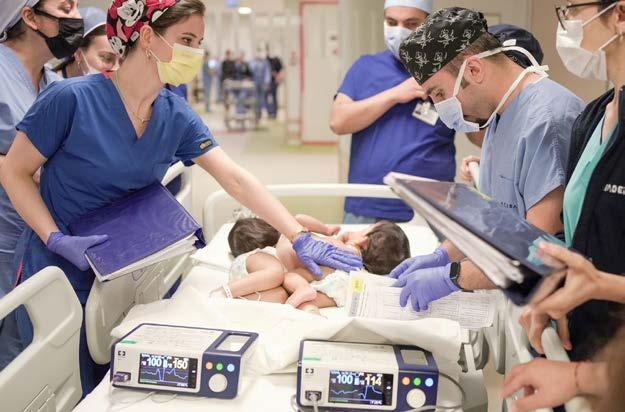
Safaa and Chifaa were 5-month-old conjoined twins when they were brought to Turkiye from Algeria. They were born facing each other, with their bodies joined from the front of the chest to the abdomen. Their pericardium and liver were fused together, and they were missing thorax and ribs. Additionally, Chifaa had hydrocephalus, which caused fluid to accumulate in her brain, leading to rapid head growth and worsening neurological
development. While other countries offered to help separate the conjoined twins, they were entrusted to Turkish physicians at Acıbadem University Atakent Hospital in Istanbul on December 15, 2021, under the patronage of Algerian President Abdelmadjid Tebboune.
The separation process was undertaken by a team of around 100 medical professionals, including:
• Pediatric Surgeon Specialist Professor Burak Tander, M.D. and his team
• Pediatric Cardiovascular Surgery Specialist Professor Ersin Erek, M.D. and his team
• General Surgery Professor Remzi
SAFAA AND CHIFAA WERE 5-MONTHOLD CONJOINED TWINS WHEN THEY WERE BROUGHT TO TURKIYE FROM ALGERIA. THEY WERE BORN FACING EACH OTHER, WITH THEIR BODIES JOINED FROM THE FRONT OF THE CHEST TO THE ABDOMEN.
Emiroğlu, M.D. who is an expert in the field of organ transplantation and his team
• Plastic, Reconstructive and Aesthetic Surgery Specialist Professor Mehmet
Veli Karaaltın, M.D. and his team
• Brain and Nerve Surgery Specialist
Professor Kenan Koç, M.D. and his team
• Anesthesiologist Professor Tayfun
Güler, M.D. and his team
• Pediatric Intensive Care Specialist
Professor Agop Çıtak, M.D. and his team
• Pediatric Infectious Diseases Specialist
Professor Metehan Özen, M.D.
• Radiology Specialist Professor Can
Çalışkan, M.D.
• Pediatric Neurology Specialist Canan
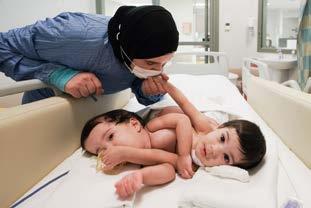
Kocaman, M.D.
• Pediatric Specialist Barış Yazar, M.D.
El-Alia Kherkhar, the mother, shared the shock of learning about the conjoined twins during her pregnancy and the emotional journey the family went through. She expressed her unwavering hope and faith that everything would turn out fine for her daughters. The Algerian community rallied behind the family, and the twins were eventually brought to Turkiye for the life-changing surgery.
A dedicated team of 100 healthcare professionals at Acıbadem University Atakent Hospital united their efforts for this intricate separation procedure. Upon their arrival on December 15, they tirelessly worked around the clock, operating as a unified force with remarkable synchronization, akin to the harmonious coordination of the five fingers on a single hand. Through numerous examinations and meticulous observations conducted by a cadre of physicians, a comprehensive 3D representation of the twins' internal organ structure was meticulously crafted within a computer program. This digital model served as the foundation for preparatory simulations and virtual surgeries, where specialists meticulously addressed potential risks down to the most minute details, methodically shaping the surgery's blueprint for optimal outcomes.
Chifaa faced a complex challenge due
to advanced hydrocephalus, a condition characterized by fluid accumulation in the brain, resulting in head enlargement and neurological complications. Ahead of the separation surgery, the Brain and Nerve Surgery team expertly performed a shunt procedure to alleviate the fluid build-up and successfully curtail her hydrocephalus. This intervention proved pivotal in stabilizing her neurological well-being.
Furthermore, in anticipation of the anatomical void that would emerge upon separation, the medical team embarked on a process of skin expansion starting from February 2022. The objective was to generate sufficient skin tissue to cover the anticipated space on the anterior chest walls once the twins were separated. This arduous journey culminated on June 6, 2022, with a meticulously orchestrated 9-hour surgical procedure that successfully detached the conjoined twins from each other. Following the surgery, the twins remained under rigorous medical supervision within the hospital for an additional 4 months, receiving intensive post-operative care. While the mother, El-Alia, states that they are happy with the long, grueling but successful
A DEDICATED TEAM OF 100 HEALTHCARE PROFESSIONALS AT ACIBADEM UNIVERSITY ATAKENT HOSPITAL UNITED THEIR EFFORTS FOR THIS INTRICATE SEPARATION PROCEDURE. UPON THEIR ARRIVAL ON DECEMBER 15, THEY TIRELESSLY WORKED AROUND THE CLOCK, OPERATING AS A UNIFIED FORCE WITH REMARKABLE SYNCHRONIZATION, AKIN TO THE HARMONIOUS COORDINATION OF THE FIVE FINGERS ON A SINGLE HAND
treatment process for them, she also adds that conjoined twins may be born again in different countries of the world and their parents may experience different feelings like them. She gives the following advice to families with conjoined twins: “Families should keep their faith high, because Allah will definitely bring good doctors before them and help them.”
The father, Ibrahim Kherkhar, also says that: “Choosing the right hospital is very important. A facility like Acıbadem would have the right team and technology to handle such complicated cases. We received the right service in Acıbadem Atakent Hospital. That's why we are so lucky. As parents, we have been very patient, we have had very difficult days psychologically. We waited for months for skin expansion, but nothing was in vain, now we are discharged with all the procedures done and the treatments completed, we are returning to our home. We would like to thank all our doctors who provided all kinds of support during this difficult process, all the hospital staff who were with us, Algerian President, who sent us to Turkiye and made it possible for our conjoined girls to separate from each other”. Expressing that they will celebrate 2 birthdays in the next period, the family says, "The day they were born and the day they were separated will be two seperate birthdays for us”. Today, these once-conjoined twins stand as a testament to medical excellence, as they emerge from their challenging ordeal with their own individual bodies and restored health, ready to embark on a new chapter of their lives.
Acıbadem University Faculty Member and Acıbadem University Atakent Hospital
Organ Transplantation Department Head and Liver Transplant Supervisor Professor Remzi Emiroğlu, M.D. says that: “Although the available literature offered limited insights, my confidence grew upon encountering success rates of up to 80 percent achieved by proficient and well-coordinated surgical teams. Our preparation was meticulous; a threedimensional model served as the foundation of our work, enabling us to commit every anatomical intricacy to memory. Extensive efforts were invested in devising radiological
strategies for the precise separation of vessels and bile ducts. Our paramount concern lay in ensuring an equitable division of the liver with no room for complications. Our team's dexterity and seasoned proficiency assured a seamless process devoid of unexpected challenges. As anticipated, our aspiration to symmetrically partition the liver was realized triumphantly”.
Acıbadem University Pediatric Surgery
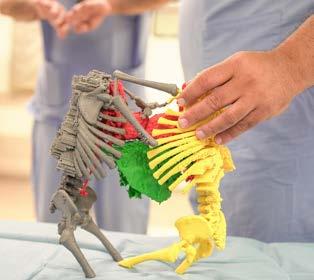
Department Member and Acıbadem University
Atakent Hospital Pediatric Surgery Specialist
Professor Burak Tander, M.D. also says that:
“In our pursuit of successfully parting the twins, who were admitted at just 5 months old, an extensive series of consultations unfolded with multidisciplinary teams hailing from various fields. The outcome was a meticulously crafted treatment blueprint. The trajectory encompassed several surgeries targeted at addressing Chifaa's hydrocephalus. Leveraging a blend of specialized synthetic materials, exclusive organic tissues, and innovative constructs from Acıbadem laboratories, surgical interventions were deftly orchestrated. The
TODAY, THESE ONCE-CONJOINED TWINS STAND AS A TESTAMENT TO MEDICAL EXCELLENCE, AS THEY EMERGE FROM THEIR CHALLENGING ORDEAL WITH THEIR OWN INDIVIDUAL BODIES AND RESTORED HEALTH, READY TO EMBARK ON A NEW CHAPTER OF THEIR LIVES.
objective? To fabricate connective tissues capable of sealing the substantial void poised to emerge post-separation. Upon culmination of the preparatory surgeries, which spanned approximately six months from their initial admission, the twins were unequivocally divided and subsequently tended to within the confines of our intensive care unit.”
Acıbadem University Atakent Hospital
Neurosurgery Specialist Professor Kenan
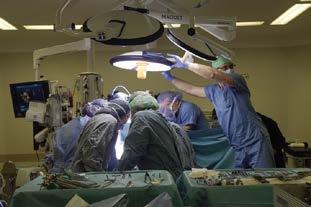
Koç, M.D. states that Chifaa has congenitally advanced hydrocephalus, therefore, fluid accumulates in her brain and her head is constantly growing and adds that: “Prior to the separation procedure, a time-sensitive intervention within the realm of Chifaa's hydrocephalus was imperative, orchestrated by our neurosurgery team. This intervention was of paramount significance to prevent the loss of both infants. Our collaborative efforts as a team were characterized by unwavering dedication and meticulous attention to detail. A shunt surgery was executed, facilitating the drainage of accumulated cerebral fluid in Chifaa's brain. Despite the arduous nature of the process, her condition has notably improved. The expansion of her cranial dimensions has been arrested, accompanied by a commendable enhancement in her neurological adaptability. Unified by a shared purpose, we efficaciously executed the separation, restoring each twin to their distinct physical identities while concurrently managing their ongoing treatment”.
Acıbadem University Faculty Member
and Acıbadem University Atakent Hospital
Pediatric Intensive Care Specialist Professor
Agop Çıtak, M.D. summarized the intensive care process as follows: “We confronted a formidable challenge, marked by its complexity. Acknowledging the potential for grave complications both during and post-operation, we approached this task as a unified team, meticulously accounting for every conceivable scenario and eventuality. This rigorous preparation commenced well in advance, right from the moment the children were admitted to the intensive care unit in
the immediate aftermath of the procedure. Without delay, Safaa and Chifaa were tethered to an array of monitors, a safeguard measure ensuring constant vigilance. The twins were diligently monitored under the watchful eye of ventilatory support. Gradually, the twins were weaned off the ventilator, each sister making this transition at a measured interval of a few days. This transition was particularly intricate for Chifaa, given her neurological condition, which necessitated a more protracted stay in the intensive care setting. However, our commitment paid off as we triumphantly transitioned both twins to their respective rooms, their well-being intact”.
Aesthetic, Plastic and Reconstructive Surgery Specialist Professor Mehmet Veli Karaaltın, M.D. also says that: “Through cohesive teamwork, we achieved the successful separation of the twins. The realm of plastic surgery witnessed several pioneering breakthroughs through our efforts. The exigency for innovative approaches arose due to the dearth of sufficient skin tissue to envelop the impending gap in the
OUR COLLABORATIVE EFFORTS AS A TEAM WERE CHARACTERIZED BY UNWAVERING DEDICATION AND METICULOUS ATTENTION TO DETAIL. A SHUNT SURGERY WAS EXECUTED, FACILITATING THE DRAINAGE OF ACCUMULATED CEREBRAL FLUID IN CHIFAA'S BRAIN
anterior chest wall post-separation. Prior to embarking on the skin augmentation procedure, we embarked on a meticulous trajectory by leveraging 3D technology. Precise calculations and surgical simulations were undertaken, ensuring meticulous planning. A groundbreaking achievement unfolded as we introduced vascularization to tissues through the application of the cell-free placental membrane, an innovation forged within the precincts of Acıbadem laboratories. With this same membrane, we adeptly addressed the hernia complication, rendering it a global first. Moreover, an unprecedented advancement marked our journey as we produced tissue scaffold material, a triumph accomplished with the backing of a 3D printer. This innovative construct proved invaluable as we adorned the babies' chest wall with its support, embodying a milestone in medical innovation”.
Pediatric Health and Diseases Specialist, Dr. Barış Yazar, M.D. has been closely involved in the care of the conjoined twins since their admission to the hospital. He highlights that he has been a firsthand witness to their remarkable mental progress and successful physical recovery following a meticulously executed surgical procedure. Dr. Barış Yazar elaborates, stating, "The intricate attachment of 30 percent of Safaa and Chifaa's bodies, particularly the adhesions extending from their chest wall to their abdomen, had not only physical implications but also isolated them from their surroundings. Chifaa, due to her neurological challenges, was plagued by constant sleep and recurrent seizures, which also posed difficulties for her sister. However, it brings us immeasurable joy to observe these twins embark on a new chapter of their lives after an exceptional collaborative effort spanning 10 months. We share in their family's elation during this momentous journey."
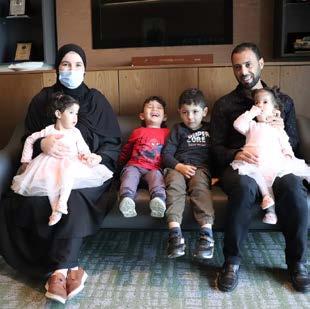
Acıbadem University Faculty Member and Acıbadem University Atakent Hospital
Anesthesiologist Professor Tayfun Güler, M.D. says that: “During the extensive period leading up to the separation surgery of the
conjoined twins, our anesthesia team formed a deep emotional connection with the infants, having administered anesthesia on numerous occasions for both assessments and preparatory procedures. As the pivotal day approached, the anesthesia team stood fully prepared, in every aspect, to administer anesthesia to the children. The synergy between our hospital's cuttingedge technological infrastructure and the adept surgical team facilitated an operation that exceeded our expectations in terms of speed and fluidity. It is with immense pride and joy that we now discharge the children in robust health, mirroring the satisfaction and elation we experienced upon the successful culmination of a 9-hour operation that commenced on a single operating table and concluded on two separate ones.”
THE INTRICATE ATTACHMENT OF 30 PERCENT OF SAFAA AND CHIFAA'S BODIES, PARTICULARLY THE ADHESIONS EXTENDING FROM THEIR CHEST WALL TO THEIR ABDOMEN, HAD NOT ONLY PHYSICAL IMPLICATIONS BUT ALSO ISOLATED THEM FROM THEIR SURROUNDINGS
DR. BARIŞ YAZAR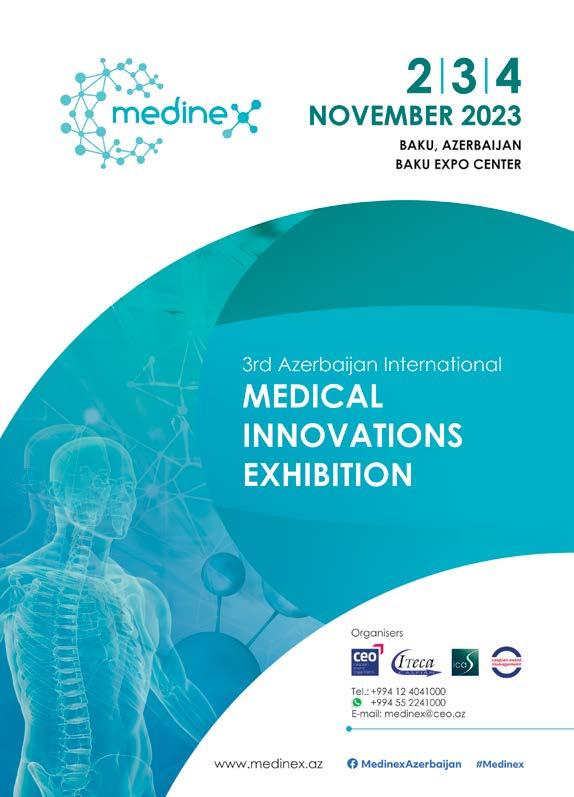
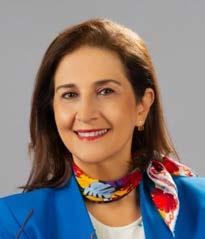
on national guidelines and international standards. They base this governance on the establishment of safe systems, the implementation of lean management processes and the monitoring of patients’ outcomes. However, this type of governance is not enough in our modern healthcare institutions. Clinical governance shall l be complemented by risk management, financial governance and resources governance which sit all together under the umbrella of “corporate governance”.
Healthcare systems are complex adaptive systems where diverse stakeholders interact together to administer patient care. This complexity leads to an increased rate of communication errors thus affecting patient safety. During the past twenty years, many actions have been implemented to improve patient care and outcomes to meet customers’ expectations. This has been driven by an impressive move of patient safety committees, national and international organizations, regulators and accreditation bodies to raise the standards of care and lead to safer healthcare environments.
Healthcare in the Middle East is delivered by multidisciplinary clinical teams working in public and private organizations. To support the delivery of high-quality care in a safe environment, hospitals develop their Clinical Governance in a systematic approach based
Corporate governance is key in the new era of healthcare management. It is important in all systems whether private or public, whether startups or huge teaching hospitals. It is a set of rules, policies and practices that dictate how the board of directors function to oversee the management of organizations and it is based on the principles of accountability, fairness, transparency & responsibility. This concept has evolved during the last 30 years after many incidences of significant losses and closure of organizations because of poor governance.
A well-structured governance leads to improved organizational and financial performance in a culture of trust, ethics, fairness and accountability creating a reputation of respect to the community, and stakeholders while maintaining diversity, gender equity, ethical procurement which are all attractive elements to the confidence of investors and to the retention of exceptional talents. The responsibility is collective and aims at acting in the best interest of the organization and not for a single shareholder. New business models are based on a corporate code and a corporate purpose of adding value to customers, investing in the workforce, adopting ethical practices,
A WELL-STRUCTURED GOVERNANCE LEADS TO IMPROVED ORGANIZATIONAL AND FINANCIAL PERFORMANCE IN A CULTURE OF TRUST, ETHICS, FAIRNESS AND ACCOUNTABILITY CREATING A REPUTATION OF RESPECT TO THE COMMUNITY, AND STAKEHOLDERS WHILE MAINTAINING DIVERSITY, GENDER EQUITY, ETHICAL PROCUREMENT WHICH ARE ALL ATTRACTIVE ELEMENTS TO THE CONFIDENCE OF INVESTORS AND TO THE RETENTION OF EXCEPTIONAL TALENTS.
supporting communities, respecting diversity, and inclusion, being innovative and generating a long-term value to shareholders.
Building a proper corporate governance is the responsibility of governing bodies who shall not be concerned in the institution’s daily operation, per se, but in giving the overall direction, controlling the executive actions, and maintaining compliance with legal and regulatory requirements. It is a “Nose in, fingers out” concept.
Governing bodies’ structure, constitution and policy framework are set as per the law of the land and follow evidence-based best practices, taking into consideration the code of ethics, the scale, the complexity, and the maturity of the organization as well as the community, the geographical spread, and the country’s regulations.
A hospital's governing board shall have a strategic focus, and support the mission, vision, and values of the system. They set policy, delegate responsibility, oversee executives’ decisions, and ensure appropriate risk management policies and accountability processes are in place throughout the hospital. They ensure the healthcare organization is heading in the right direction.
The strategy formulated by the board is communicated clearly to the workforce through the Chief Executive Officer whose performance is regularly evaluated by the board to ensure the hospital is properly managed and meets the desired standards.
The constitution of the board is critical. Diversity, equity, and inclusion, when taken into consideration, support a meaningful decision-making process. Board members, executive directors, and non-executive ones are chosen in a fair representative way while taking into consideration many factors such as age, gender, race, ethnicity, culture, function, and sector. Their role is not restricted to the impartial adequate review of reports and the request for clarifications to help in the collective decision making. Board members
are accountable for the outcomes and performance of the organization. They are responsible for communicating with, and being accountable to, internal and external stakeholders.
Governing boards are run with the help of a few committees constituted by board members such as governance committee, financial committee, audit committee, risk management committee and succession planning committee. The delegation of tasks to those committees will free up the board for major issues such as strategy and major financial and organizational decisions.
While delivering a high-quality care and maintaining the safety of patients falls under clinical governance, business performance, ethics and compliance falls under corporate governance which is a necessary governance in our new world because healthcare organizations are accountable to their surrounding community and stakeholders.
Governance in healthcare is evolving to integrate both clinical and corporate governance in an effective way. Healthcare providers need to be educated on the importance of this interconnection and the impact of effective communication and mutual respect on the organization's sustainability. Clinical leaders are becoming more aware of the importance of their administrative (financial, investment, resources, IT..) and governance duties and the role those play in supporting patient care, processes, and procedures.
Most hospitals in the Middle East are privately owned and family business organizations. In some institutions, we notice few governance responsibilities are distributed to people across the organization, such as support in risk management activities, performance monitoring and auditing, etc. In such cases, it is still the governing board’s ultimate responsibility to ensure that the overall governance system is implemented effectively.
HEALTHCARE PROVIDERS NEED TO BE EDUCATED ON THE IMPORTANCE OF THIS INTERCONNECTION AND THE IMPACT OF EFFECTIVE COMMUNICATION AND MUTUAL RESPECT ON THE ORGANIZATION'S SUSTAINABILITY. CLINICAL LEADERS ARE BECOMING MORE AWARE OF THE IMPORTANCE OF THEIR ADMINISTRATIVE (FINANCIAL, INVESTMENT, RESOURCES, IT..) AND GOVERNANCE DUTIES AND THE ROLE THOSE PLAY IN SUPPORTING PATIENT CARE, PROCESSES, AND PROCEDURES.
MOST HOSPITALS IN THE MIDDLE EAST ARE PRIVATELY OWNED AND FAMILY BUSINESS ORGANIZATIONS.
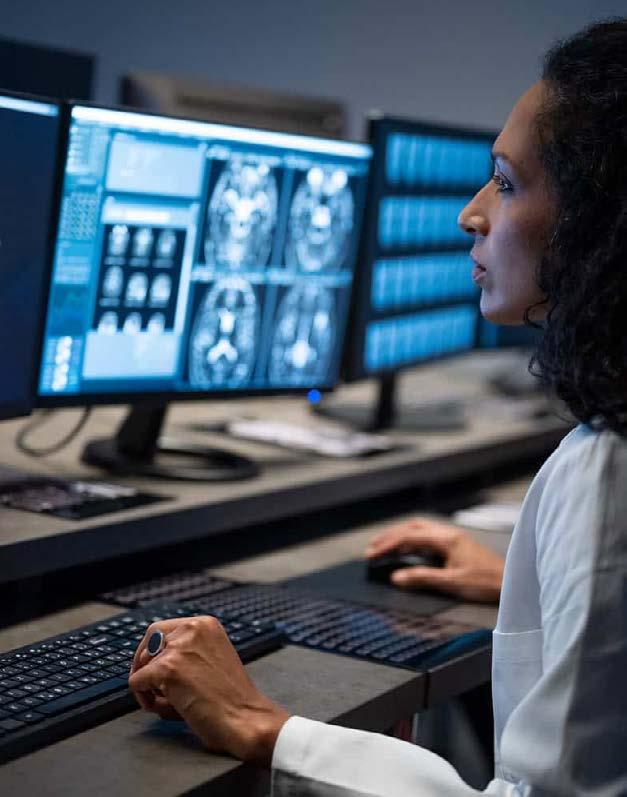
Interventional radiology has proven its efficiency in treating many medical conditions. It offers minimally invasive, image-guided treatments for many diseases and has shown to be less risky and less painful, in addition to faster recovery than open surgery.
Advancements in this field have opened broad horizons for doctors and interventional radiology specialists to direct catheters and assist in performing procedures with extreme precision, with the least possible complications. This is done using minimally invasive techniques as much as possible, with small incisions when needed. The result is a minimally invasive medical intervention for diagnostic and therapeutic procedures with little pain, safety, and efficiency.
Interventional radiology provides astounding benefits. It can be used to determine if a patient requires surgery, eliminating the need for exploratory surgery. This radiology is used to guide catheters or other tools inside the body to complete a medical procedure precisely without the need for surgery or removal of the affected part. Interventional radiology excels in effectiveness thanks to its high-resolution imaging techniques, which enhance diagnostic accuracy and improve treatment outcomes. Compared to traditional surgery, it results in less blood loss and a reduced risk of infection. People at higher anesthesia risk-benefit as only local or moderate anesthesia is used.
Furthermore, the patient doesn't need to stay in the hospital and can return home the same day the treatment is received. The pain is less because interventional radiology procedures are performed through small incisions and don't require stitches or large bandages. Rapid recovery is one of the most notable features of interventional radiology due to the minimally invasive nature of the procedures.
Patients can generally return to daily life faster than they might after traditional surgery.
INTERVENTIONAL RADIOLOGY CONTRIBUTES TO TREATING VARIOUS DISEASES IN DIFFERENT PARTS OF THE BODY. INTERVENTIONAL RADIOLOGICAL PROCEDURES ARE DIVIDED INTO VASCULAR (RELATED TO BLOOD VESSELS) AND NONVASCULAR (RELATED TO ORGANS OUTSIDE THE BLOOD VESSELS). VASCULAR INTERVENTIONS ARE ALSO DIVIDED INTO NEUROVASCULAR INTERVENTIONS (RELATED TO BRAIN VESSELS) AND PERIPHERAL VASCULAR INTERVENTIONS (RELATED TO VESSELS OF ORGANS OUTSIDE THE BRAIN).
Interventional radiology contributes to treating various diseases in different parts of the body. Interventional radiological procedures are divided into vascular (related to blood vessels) and non-vascular (related to organs outside the blood vessels). Vascular interventions are also divided into neurovascular interventions (related to brain vessels) and peripheral vascular interventions (related to vessels of organs outside the brain).
Some of the diseases that can be treated by interventional radiology include:
Interventional radiology is used in the treatment of vascular diseases such as treating varicose veins, peripheral artery disease, deep vein thrombosis, pulmonary embolism, abdominal aortic aneurysms, thoracic aortic aneurysms, aortic dissection, acute mesenteric ischemia, visceral artery aneurysms, in addition to arteriovenous malformation.
Interventional radiology offers cancer patients the opportunity to eliminate tumors without surgery. Cancers that can be treated with interventional radiology include liver, lung, kidney, bone, breast, and prostate cancers. Interventional radiology is used to treat a range of malignant and benign tumors, such as liver tumors, and is used in treating some secondary tumors in the liver and lungs and other benign tumors in the body, such as uterine fibroids and some bone tumors.
Liver tumors that can't be treated surgically
can be treated by injecting through the arteries that feed the tumor with a catheter through a skinny tube introduced under local anesthesia inside the femoral artery. Under radiology, it is directed to the main liver artery, after which a chemical is injected through the catheter that reaches the tumor and eliminates it. Currently, it's possible to inject tiny radioactive chemical particles into the tumor periodically, killing the cancer cells without harming the liver tissue.
Interventional radiology treatment is safer than surgery, where the medical condition is diagnosed and treated through medical imaging. A temporary balloon is inserted into the coronary artery, then inflated to widen the artery's passage. Afterward, a metallic stent is inserted to keep the narrowed spot open to prevent it from re-checking. This procedure is standard worldwide today.
Injecting uterine fibroids with a catheter is one of the latest non-surgical methods. The feeding arteries of the fibroids in the uterus are closed, leading to their shrinkage and the disappearance of symptoms. One of the advantages of this technique is that the patient does not undergo general anesthesia; local anesthesia, similar to cardiac catheterization, suffices. The patient doesn't need to stay in the hospital for an extended period, only one day is enough, with some painkillers, and she can gradually return to her everyday life.
Interventional radiology assists in treating medical conditions related to the kidneys, such as renal artery stenosis, removal of renal sympathetic nerves, and other diseases, including gastric varices, testicular varices, and infertility in men.
Catheterization of the prostate arteries is done under the influence of local anesthesia by injecting very fine particles to close the arteries feeding the enlargement. This leads to the
shrinkage of the prostate size without affecting its function. This technique has proven highly effective in avoiding complications such as urinary incontinence and semen reflux.
A medical catheter is directed inside the vein using ultrasound guidance. Then, the vein causing the varicose veins is closed from the inside using either laser or radiofrequency within half an hour.
There are many types of interventional radiology used in the treatment of various medical conditions, including:
Computed Tomography (CT) Imaging: X-rays are used to produce three-dimensional images. Doctors resort to this type of interventional radiology to diagnose tumors, bone deformities, neurological, cardiac, and pulmonary diseases.
Magnetic Resonance Imaging (MRI): A type of medical imaging that uses a magnetic field to produce three-dimensional body images. It is used to diagnose tumors, neurological diseases, joints, and blood vessels.
Ultrasound (US): Produces images of tissues and organs. It diagnoses neurological diseases, muscle-related issues, and fetal abnormalities.
Laser Interstitial Thermal Therapy (LITT): A technique that utilizes lasers to destroy tumors and disease-infected cells. It's applied for treating cancerous tumors, benign tumors, neurological disorders, and eye diseases.
Transcutaneous Electrical Nerve Stimulation (TENS): A technique that employs electrical waves to alleviate pain and improve blood circulation. It treats neurological diseases, muscle issues, and fetal deformities.
The treating physician selects the appropriate medical procedure for the patient's condition to achieve the desired result. Given the proven ability of these modern techniques to treat benign and malignant tumors without surgical intervention, they often have a high success rate.
INTERVENTIONAL RADIOLOGY TREATMENT IS SAFER THAN SURGERY, WHERE THE MEDICAL CONDITION IS DIAGNOSED AND TREATED THROUGH MEDICAL IMAGING. A TEMPORARY BALLOON IS INSERTED INTO THE CORONARY ARTERY, THEN INFLATED TO WIDEN THE ARTERY'S PASSAGE. AFTERWARD, A METALLIC STENT IS INSERTED TO KEEP THE NARROWED SPOT OPEN TO PREVENT IT FROM RE-CHECKING.



Where some of the greatest advances in medicine are hard at work for you. The University of Chicago Medicine pioneers the kind of research that’s changing lives. It is home to the most advanced medical technology, and physicians who work at the forefront of their fields.

It is our mission to bring the forefront of medicine to the world through personalized international patient services and tailored global advisory and education programs.
Clinical Centers of Excellence
» Comprehensive Cancer Center
» Transplant Institute
» Heart & Vascular Center
» Neuroscience Center
» Digestive Diseases Center
» Orthopaedic Surgery
» Obstetrics & Gynecology
» Pediatrics
For more information, visit UChicagoMedicine.org/global
100 Nobel Laureates, including 12 in Physiology or Medicine

Magnet Recognition for Excellence in Nursing & Patient Care
One of only 22 acute-care facilities nationwide to receive “A” grade in patient safety from Leapfrog Group for 21 consecutive periods as of May 2022
Ranked nationally in multiple adult and children’s specialties by U.S. News & World Report

Hear directly from premier healthcare leaders across the globe who will share their experiences, best practices, and how JCI has positioned them to affect sustained improvements beyond accreditation.
We encourage participants from health systems, government officials, policymakers, influencers, and industry consultants to join and engage in this summit’s insightful discussions. The content is tailor-made for participants to gain practical knowledge based on evidence-based practices.
Location: Lisbon Congress Centre | Portugal
Date: 24 October 2023
Time: 8:00 AM - 17:00 PM
For more information and to register, please scan the QR code.
